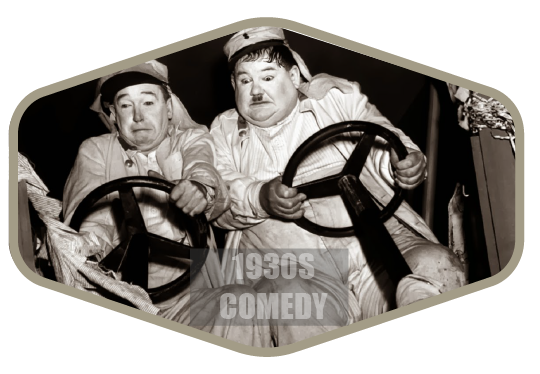The 1930s was a decade of geo-political and economic upheaval. The world was dealing with the consequences of the Great Depression, the aftermath of WWI and the rise of fascism in Europe.
Against the backdrop of this era, movie audiences longed for any form of escapist fare. And comedies, whether slapstick, screwball, or romantic - fit the bill and garnered wide appeal. With any genre of film in the '30s, there was a bold delineation between "pre-code" - the films made before the enforcement of the (Hays Code) in mid-1934 - and those films made after.
There was no shortage of unbridled sexual innuendo and suggestive behavior with pre-code comedies. Mae West epitomizes this sentiment with She Done Him Wrong (1933) and I'm No Angel (1933). Her now classic suggestive double-entendres: "When I'm good, I'm very good, but when I'm bad, I'm better," and "Well, it's not the men in your life that counts, it's the life in your men," drew the ire of the soon to be enforced Motion Picture Production Code. But other stars in the pre-code era were also pushing the boundaries of what was acceptable; Jean Harlow for example in Platinum Blonde (1931) and Blonde Bombshell (1933).
Throughout the 30's there was a coming of age for the sophisticated comedy. These were generally romantic romps in the vein of The Awful Truth (1937), Easy Living (1937), Forsaking all Others (1935), My Man Godfrey (1936) and It's a Wonderful World (1939). These comedies featured snappy dialogue and teasing one-liners. These were fun vehicles for some of the biggest stars of the era: Katharine Hepburn, Cary Grant, Barbara Stanwyck, Claudette Colbert, Jean Arthur, Clark Gable and Ginger Rogers.
Although centered around a murder mystery, The Thin Man series featuring Myrna Loy and William Powell epitomizes the best of the '30's sophisticated comedy (featured in our Suspense genre).
Finally, comedy in the 1930's were defined by the antics of The Marx Brothers, W.C. Fields. Laurel & Hardy, and The Three Stooges. These stars were at their zenith in the '30s and kept audiences laughing through the 1940's.
Against the backdrop of this era, movie audiences longed for any form of escapist fare. And comedies, whether slapstick, screwball, or romantic - fit the bill and garnered wide appeal. With any genre of film in the '30s, there was a bold delineation between "pre-code" - the films made before the enforcement of the (Hays Code) in mid-1934 - and those films made after.
There was no shortage of unbridled sexual innuendo and suggestive behavior with pre-code comedies. Mae West epitomizes this sentiment with She Done Him Wrong (1933) and I'm No Angel (1933). Her now classic suggestive double-entendres: "When I'm good, I'm very good, but when I'm bad, I'm better," and "Well, it's not the men in your life that counts, it's the life in your men," drew the ire of the soon to be enforced Motion Picture Production Code. But other stars in the pre-code era were also pushing the boundaries of what was acceptable; Jean Harlow for example in Platinum Blonde (1931) and Blonde Bombshell (1933).
Throughout the 30's there was a coming of age for the sophisticated comedy. These were generally romantic romps in the vein of The Awful Truth (1937), Easy Living (1937), Forsaking all Others (1935), My Man Godfrey (1936) and It's a Wonderful World (1939). These comedies featured snappy dialogue and teasing one-liners. These were fun vehicles for some of the biggest stars of the era: Katharine Hepburn, Cary Grant, Barbara Stanwyck, Claudette Colbert, Jean Arthur, Clark Gable and Ginger Rogers.
Although centered around a murder mystery, The Thin Man series featuring Myrna Loy and William Powell epitomizes the best of the '30's sophisticated comedy (featured in our Suspense genre).
Finally, comedy in the 1930's were defined by the antics of The Marx Brothers, W.C. Fields. Laurel & Hardy, and The Three Stooges. These stars were at their zenith in the '30s and kept audiences laughing through the 1940's.
COMEDY FILMS OF THE 1930s
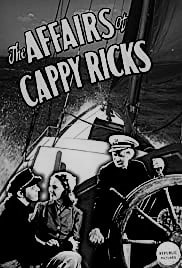 AFFAIRS OF CAPPY RICKS, THE (1937)
AFFAIRS OF CAPPY RICKS, THE (1937) (57 Min.) Genre: 1930 COMEDY, Transfer Quality: B
Returning from a trip, wealthy seaman Cappy Ricks (Walter Brennan) is annoyed to find his home automated, his daughters' romances awry and his business in disarray, so he schemes with Bill (Lyle Talbot) to trap everyone aboard Cappy's yacht. Later, they fake a fire to maroon everyone on an island — but then they end up really marooned.
Starring: Walter Brennan, Mary Brian, Lyle Talbot, Frank Shields | Directed by: Ralph Staub
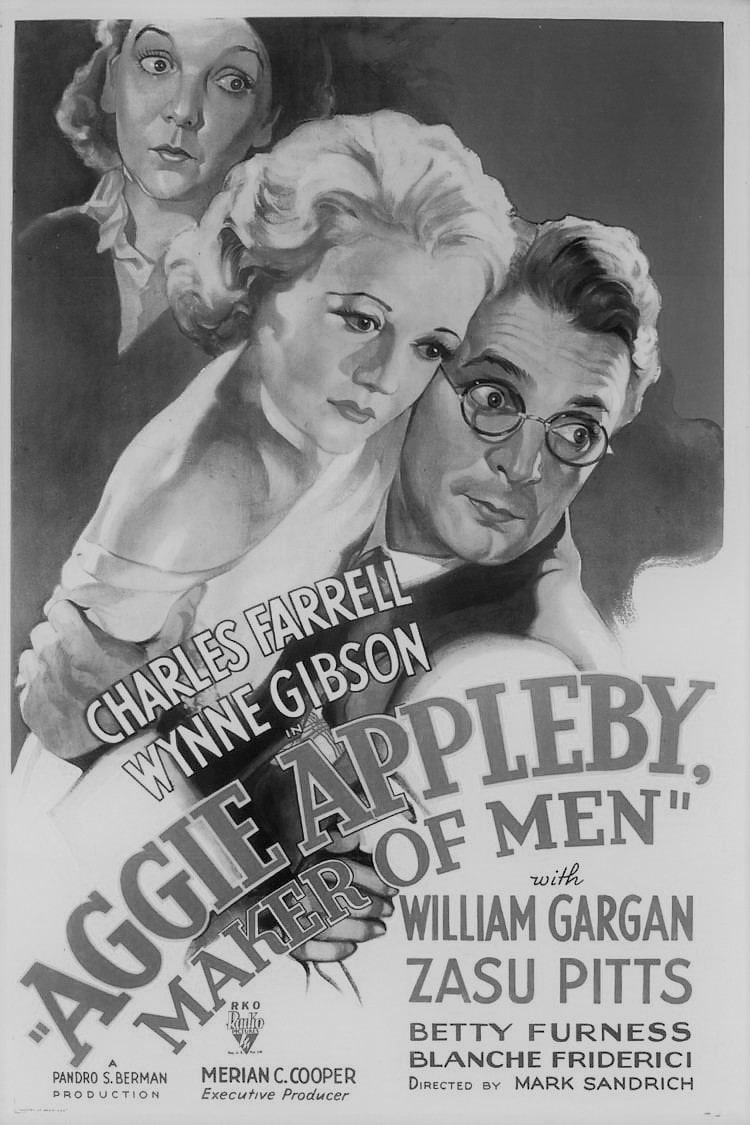 AGGIE APPLEBY, MAKER OF MEN (1933)
AGGIE APPLEBY, MAKER OF MEN (1933) (73 Min.) Genre: 1930 COMEDY, Transfer Quality: B
When her tough boyfriend Red Branahan (William Gargan) is sent to jail, Aggie Appleby (Wynne Gibson) meets mild-mannered Adoniram Schlump (Charles Farrell), and decides to turn him into a real man. She teaches him how to talk tough, changes his name to Red Branahan, and gets him a construction job — unaware that the real Red has been released from prison.
Starring: Charles Farrell, Wynne Gibson, William Gargan, ZaSu Pitts | Directed by: Mark Sandrich
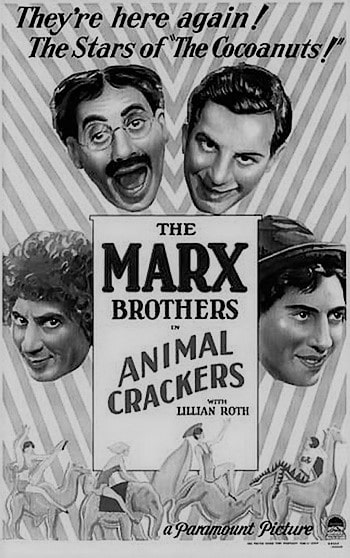 ANIMAL CRACKERS (1930)
ANIMAL CRACKERS (1930) (97 Min.) Genre: 1930 COMEDY, Transfer Quality: A
Animal Crackers, like The Cocoanuts before is an all-but-literal translation to film of a smash-hit Marx Brothers Broadway musical. The aristocratic Mrs. Rittenhouse (Margaret Dumont) holds a weekend party at her Long Island Estate. Her guest of honor is famed (but likely fraudulent) African explorer Geoffrey T. Spaulding (Groucho Marx). Also showing up are renegade musician Signor Emmanuel Ravelli (Chico Marx), the mute, girl-chasing "Professor" (Harpo Marx) and Spaulding's faithful secretary Horatio Jamison (Zeppo Marx). The film, revolving around a stolen painting, finds Groucho lecturing on his most recent safari ("One morning I shot an elephant in my pajamas. How he got in my pajamas, I don't know"), Harpo and Chico unabashedly cheating at bridge, Groucho dictating a wildly nonsequitur letter to the firm of Hungerdunger, Hungerdunger, Hungerdunger and McCormick, and Groucho and Chico drawing up plans to build a house. — Hal Erickson
Starring: The Marx Brothers, Lillian Roth, Margaret Dumont, Louis Sorin | Directed by: Victor Heerman
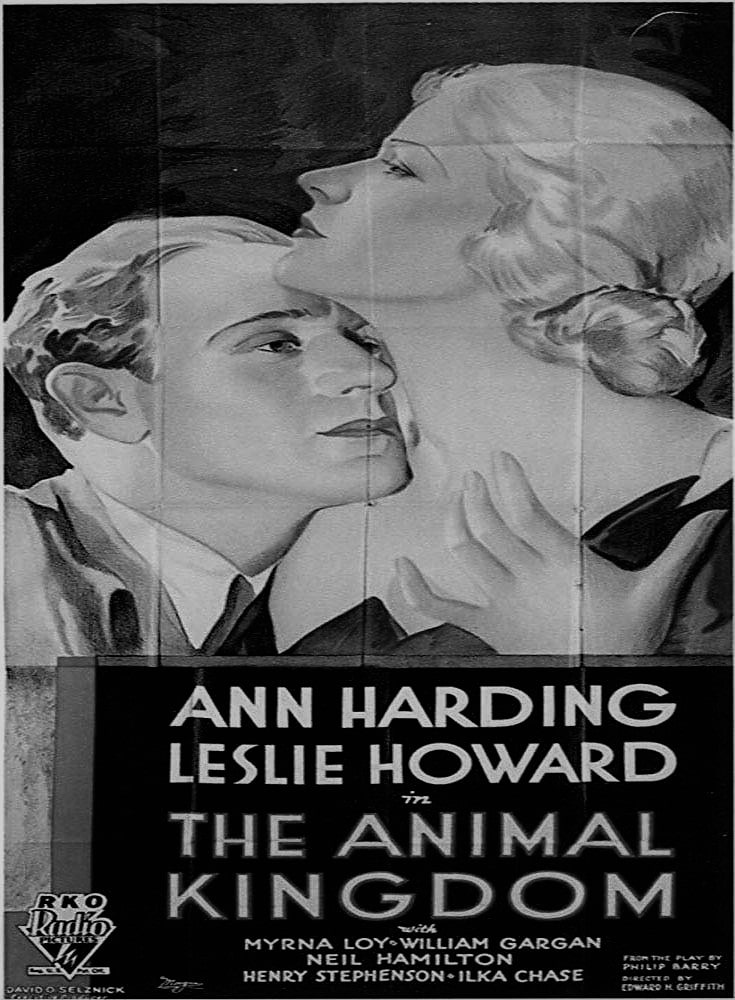 ANIMAL KINGDOM, THE (1932)
ANIMAL KINGDOM, THE (1932) (95 Min.) Genre: 1930 COMEDY, Transfer Quality: A
The first film version of Philip Barry's Broadway play The Animal Kingdom stars Ann Harding, Leslie Howard and Myrna Loy. Howard plays a wealthy publisher who decides to marry the socially prominent Loy, leaving his mistress Harding in the lurch. In comically convoluted fashion, Loy behaves like a callous libertine, while Harding is the soul of love and fidelity. The frustrated Howard declares at the end that he is going back to his "wife"--meaning, of course, the faithful Harding. Animal Kingdom was long withdrawn from public view due to the 1946 remake One More Tomorrow; a pristine 35-millimeter print was discovered in the Warner Bros. vaults in the mid-1980s.
Starring: Ann Harding, Leslie Howard, Myrna Loy, William Gargan, Neil Hamilton, Henry Stephenson | Directed by: George Cukor / Edward H. Griffith
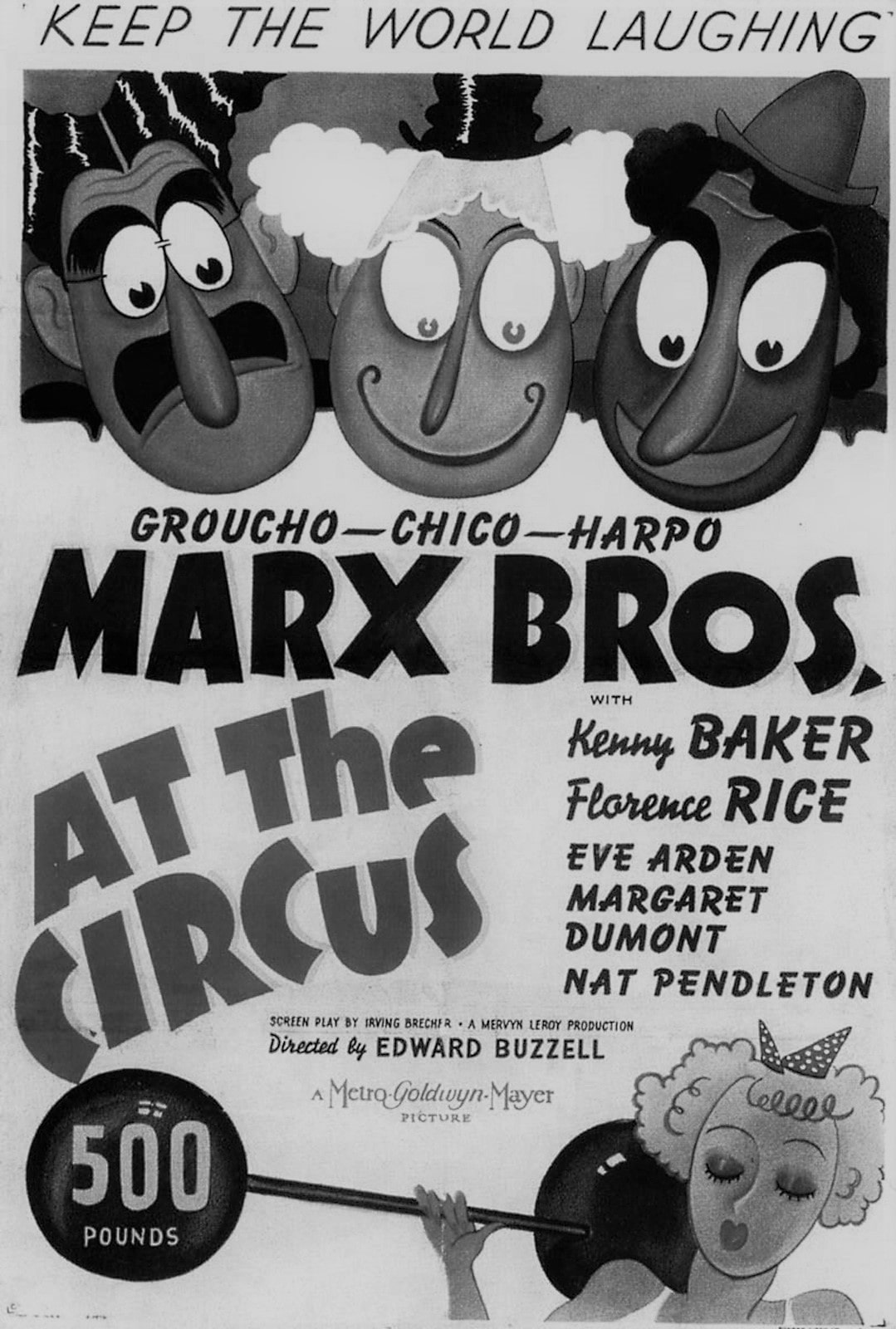 AT THE CIRCUS (1939)
AT THE CIRCUS (1939) (87 Min.) Genre: 1930 COMEDY, Transfer Quality: A
The Marx Brothers in unmistakable decline. Groucho has his moments, as always, singing of "Lydia the Tattooed Lady", and he and Dumont have their act down to a stylized of sublime interplay. Harold Arlen did the songs.
Starring: The Marx Brothers, Margaret Dumont, Florence Rice, Eve Arden, Nat Pendleton | Directed by: Edward Buzzell
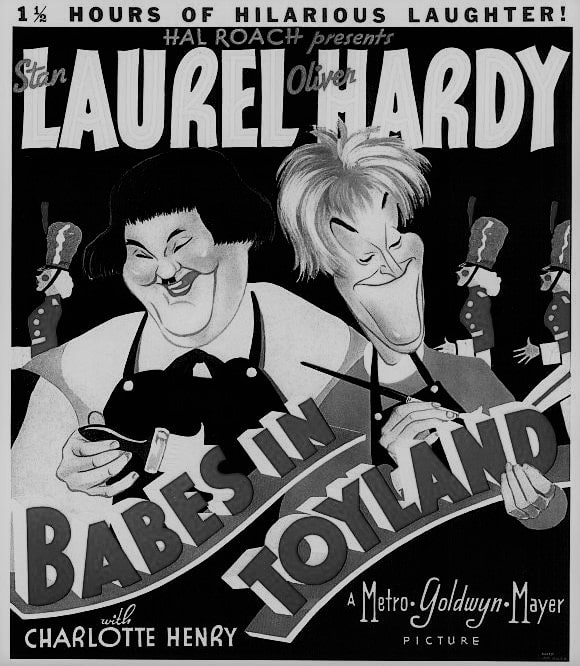 BABES IN TOYLAND (1934)
BABES IN TOYLAND (1934) (77 Min.) Genre: 1930 COMEDY, Transfer Quality: A
March of the Wooden Soldiers is the 1952 reissue title for Hal Roach's 1934 film version of Victor Herbert's Babes in Toyland. Stan Laurel and Oliver Hardy star as Stannie Dum and Ollie Dee, bumbling apprentices to the master toymaker of Toyland. This joyous fairy-tale community is populated by all the colorful Mother Goose characters we know and love; the one sour apple in the barrel is mean old Silas Barnaby (portrayed by Henry Kleinbach, aka Henry Brandon). Barnaby holds the mortgage on the outsized shoe where Widow Peep (Florence Roberts) and her daughter Little Bo Peep (Charlotte Henry) reside, and where Stannie and Ollie pay room and board. Bo Peep will be forced to marry the odious Barnaby if the rent isn't paid, so Stannie and Ollie try to raise the money by asking the toymaker for a raise. But the boys are fired when Stannie messes up an order from Santa Claus: instead of making six hundred toy soldiers one foot high, the dumb Mr. Dum makes one hundred toy soldiers six feet high. The wedding between Barnaby and Bo Peep goes on as planned--except that it's Stannie, disguised as the bride, who ends up walking down the altar. Publicly humiliated, Barnaby vows revenge. He steals one of the Three Little Pigs and places the blame on Bo Peep's boy friend, Tom-Tom the Piper's Son (Felix Knight). The penalty for pignapping is banishment to Bogeyland, a fearsome subterranean world populated by hideous bogeymen (look closely and you'll see the zippers on their costumes!) Stannie and Ollie expose Barnaby's perfidy and rescue Tom-Tom from Bogeyland, whereupon Barnaby rallies the bogeymen and leads an all-out attack on Toyland. Taking refuge in the toy warehouse, Stannie and Ollie activate the 100 6-foot wooden soldiers (a neat bit of stop-motion photography, courtesy of Hal Roach's "fx" wizard Roy Seawright), who vanquish the Bogeymen and save the day. One of the best of all the Laurel and Hardy features, March of the Wooden Soldiers has been a television holiday perennial ever since the cathode tube was invented. Only a handful of Victor Herbert's songs are utilized, but these lilting compositions more than compensate for the omissions (one song, "I Can't Do That Sum", is used as the leitmotif for the clueless Stannie and Ollie). For years available only in the 70-minute reissue version, March of the Wooden Soldiers has recently been fully restored to its full glorious 78 minutes.
Starring: Stan Laurel, Oliver Hardy, Charlotte Henry, Felix Knight, Florence Roberts, Charles "Buddy" Rogers | Directed by: Gus Meins / Charles Rogers
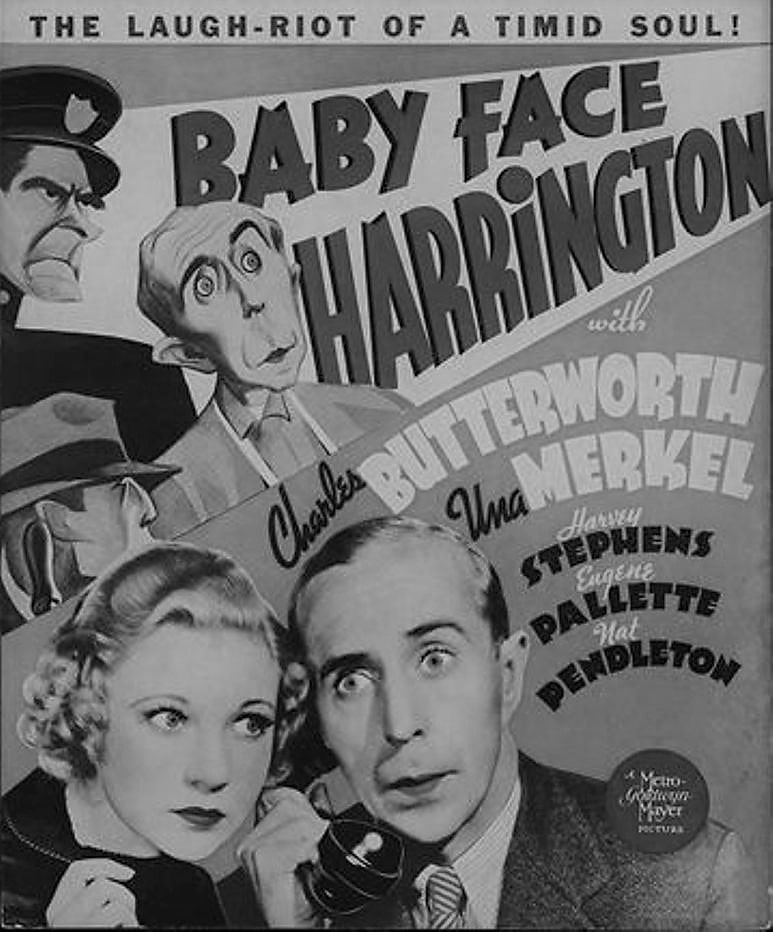 BABY FACE HARRINGTON (1935)
BABY FACE HARRINGTON (1935) (65 Min.) Genre: 1930 COMEDY, Transfer Quality: B
Directed by Raoul Walsh, Baby Face Harrington features actor Charles Butterworth as Willie, a meek clerk who unintentionally gets involved with the mob when he misplaces two thousand dollars from the life insurance policy he was forced to cash after losing his job. While searching for the missing money, Willie (Butterworth) is taken hostage by gangsters. After learning his long-suffering wife Millicent (Una Merkel) plans to divorce him shortly, Willie loses all hope and prepares to hang himself. Just before he jumps to his suicide, however, the crime boss shows up and stops him. It turns out that the mob leader is an old school friend of Willie's, and convinces the former clerk that he still has much to live for. Baby Face Harrington also features actors Harvey Stephens, Eugene Pallette, and Ruth Selwyn.
Starring: Charles Butterworth, Una Merkel, Harvey Stephens, Eugene Pallette | Directed by: Raoul Walsh
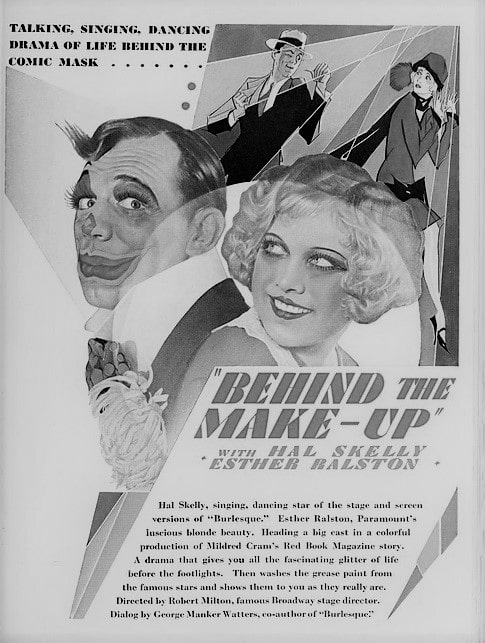 BEHIND THE MAKEUP (1930)
BEHIND THE MAKEUP (1930) (65 Min.) Genre: 1930 COMEDY, Transfer Quality: B
In this convoluted drama, the jolly painted face of a circus clown is but a mask for an avaricious, ruthlessly ambitious, and deceitful man. Hap is performing in small New Orleans clubs when he saves the life of the starving Gardino, a member of a distinguished family of European clowns. Though impoverished and unemployed, Gardino is determined to avoid the family slapstick and become a "serious" performer of high-class clowning. Hap suggests they team up, but thanks to Gardino's refusal to do slapstick, their act is a dud. Gardino leaves in a huff. Later Hap finds his former partner performing Hap's proposed act with a new partner. He is doing quite well, and when he sees Hap, Gardino apologizes and they again team up. This time Gardino insists on star billing. To make matters worse, he steals Hap's girl and they marry. The honeymoon is barely over before Gardino is playing around with other women and gambling away all of their money. After his latest affair goes bust, Gardino grows despondent and so walks into the sea, never looking back.
Starring: Hal Skelly, William Powell, Fay Wray, Kay Francis, Paul Lukas | Directed by: Robert Milton
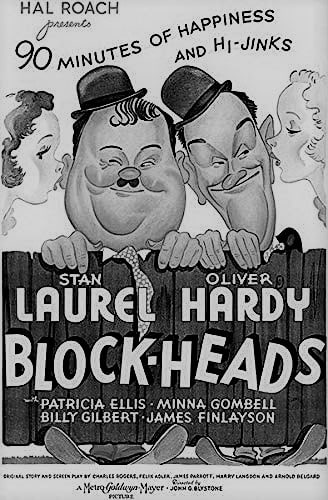 BLOCK-HEADS (1938)
BLOCK-HEADS (1938) (57 Min.) Genre: 1930 COMEDY, Transfer Quality: A
Twenty years after the Armistice, doughboy Stan Laurel continues guarding a trench in France--simply because no one told him the war was over. His rescue coincides with the first wedding anniversary of his old pal Oliver Hardy. Heading to town to pick up a gift for his wife (Minna Gombell), Ollie discovers that Stan has been located and is now residing at the Veteran's Home. The two buddies share a warm reunion, whereupon Ollie invites Stan home to enjoy a "big thick juicy steak" prepared by Mrs. Hardy. As a result of Ollie's hospitality, Stan inadvertently wrecks Ollie's brand new car; the boys spend half the afternoon trudging up and down 13 flights of stairs; Ollie gets into a fight with belligerent Jimmy Finlayson; Mrs. Hardy angrily walks out on her husband; the boys manage to blow up the kitchen while preparing their own meal; and Hardy's beautiful next-door neighbor (Patricia Ellis) ends up minus her dress in Ollie's steamer trunk, with both Mrs. Hardy and the neighbor's husband, big-game hunter Billy Gilbert, converging upon our bethumped heroes. Essentially a remake of the 1929 Laurel and Hardy two-reeler Unnaccustomed as We Are, Block-Heads is a brilliant parade of virtuoso comedy turns. The best bits of business include the mountain of bean cans representing Stan's two decades in the trenches; the "white magic" gags involving Stan's pulling down the shadow of a window shade, producing a glass of water from his pocket and smoking his thumb like a pipe; and an uproarious "black" joke involving Ollie's mistaken belief than Stan has lost a leg in the war. The film sustains its high level of humor for 56 of its 57 minutes, faltering only in its disappointing closing gag (borrowed from the 1928 short We Faw Down). Among the writers of this chucklefest was former silent comedian Harry Langdon. Erroneously announced in 1938 as Laurel and Hardy's final feature, Block-Heads was indeed the last of the team's genuine classics.
Starring: Stan Laurel, Oliver Hardy, Patricia Ellis, Billy Gilbert, Huntz Hall | Directed by: John G. Blystone
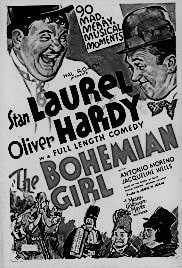 BOHEMIAN GIRL, THE (1936)
BOHEMIAN GIRL, THE (1936) (74 Min.) Genre: 1930 COMEDY, Transfer Quality: B
The excellent box-office returns for the previous Laurel & Hardy comic operas The Devil's Brother and Babes in Toyland encouraged Hal Roach to cast the team in still another operatic adaptation, a self-styled "comedy version" of William Balfe's The Bohemian Girl. Stan Laurel and Oliver Hardy play members of a gypsy tribe wandering through middle Europe sometime in the early 19th century. As if he hasn't got enough trouble trying to train dimwitted Stan to be a "first-class pickpocket," Ollie is also saddled with a faithless wife (Mae Busch), who is in love with dashing gypsy robber captain Devil's Hoof (Antonio Moreno). While trying to break into the palace of gypsy-hating Count Arnheim (William P. Carleton), Devil's Hoof is captured and flogged. In retaliation, Ollie's wife kidnaps Arnheim's little daughter Arline (Darla Hood of "Our Gang" fame) and leaves the child in Ollie's care, explaining that the baby is his ("I didn't want to tell her who her father was until she was old enough to stand the shock!") Twelve years later, Arline (now played by Jacqueline Wells) has grown into a beautiful young woman who's forgotten all about her aristocratic childhood, except whenever she dreams "she dwelt in marbl'd halls" (from the song of the same name). By coincidence, Arline one day finds herself wandering around the grounds of her ancestral home. She is captured by the Captain of the Guards (James Finlayson) and sentenced to be flogged, whereupon her foster-daddy Ollie and her drink-besotted Uncle Stanley race to her rescue. There's a happy ending for Arline, but not for Stan and Ollie, who wind up the picture with one of their famous "physical distortion" gags. A troubled production, The Bohemian Girl had to be extensively reshot and re-edited after previews because of the sudden (and still unsolved) death of co-star Thelma Todd, who was originally cast as the Gypsy Queen. It was decided out of respect for Todd to retain only one of her musical numbers and to refilm the rest of her scenes with other actors; as a result, Bohemian Girl is one of the patchiest and most uneven of the Laurel & Hardy features. Fortunately, Stan and Ollie's scenes are well up to par, especially the classic bit wherein Stan inadvertently becomes progressively drunker as he tries to bottle a cask of bubbling wine.
Starring: Stan Laurel, Oliver Hardy, Thelma Todd, Antonio Moreno | Directed by: James W. Horne, Charles Rogers
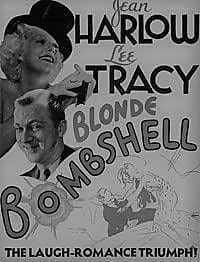 BOMBSHELL (1933)
BOMBSHELL (1933) (95 Min.) Genre: 1930 COMEDY, Transfer Quality: A
Jean Harlow is the "bombshell" of the title, a popular movie actress named Lola. Though she seemingly has everything a girl could possibly want, Lola is fed up with her sponging relatives, her "work til you drop" studio, and the nonsensical publicity campaigns conducted by press agent Lee Tracy. She tries to escape Hollywood by marrying a titled foreign nobleman, but Tracy has the poor guy arrested as an illegal alien. Finally Lola finds what she thinks is perfect love in the arms of aristocratic Franchot Tone, but she renounces Tone when his snooty father C. Aubrey Smith looks down his nose at Lola and her profession. Upon discovering that Tone and his entire family were actors hired by Tracy, Lola goes ballistic—until she realizes that Tracy, for all his bluff and chicanery, is the man who truly loves her. Allegedly based on the career of Clara Bow (who, like Lola, had a parasitic family and a duplicitous private secretary), Bombshell is a prime example of Jean Harlow at her comic best. So as not to mislead audiences into thinking this was a war picture, MGM retitled the film Blonde Bombshell for its initial run. — Hal Erickson
Starring: Jean Harlow, Lee Tracy, Frank Morgan, Franchot Tone, Pat O'Brien, Una Merkel | Directed by: Victor Fleming
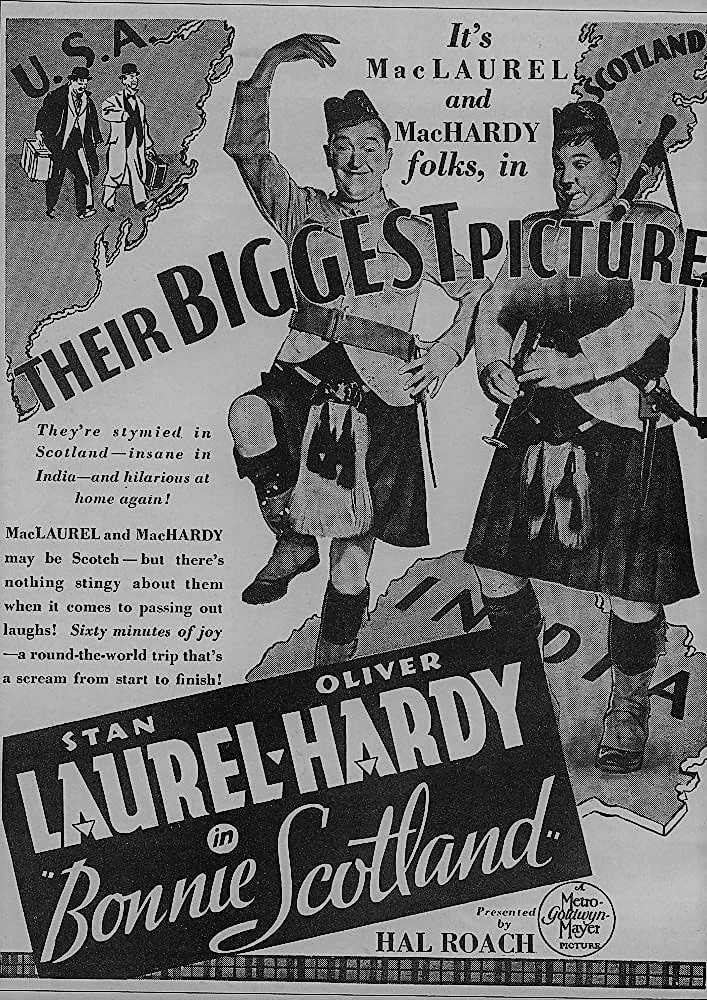 BONNIE SCOTLAND (1935)
BONNIE SCOTLAND (1935) (81 Min.) Genre: 1930 COMEDY, Transfer Quality: A
Stanley MacLaurel (Stan Laurel), the American "black sheep" of the MacLaurel clan, stows away on a cattle boat to Scotland in the company of his pal Ollie (Oliver Hardy) so that he can claim his share of his late uncle Angus Ian MacLaurel's fortune. Alas, Stan's inheritance consists of a snuffbox and a pair of bagpipes, while the bulk of the estate goes to Angus' granddaughter Lorna MacLaurel (June Lang) — provided she move from Scotland to India, where she and her aunt Lady Vi Ormsby (Anne Grey) will reside with Vi's handsome brother, Colonel Gregor MacGregor (Vernon Steele) of His Majesty's Service. After nearly setting fire to their lodgings while trying to cook a fish, the penniless Stan and Ollie are booted out into the street, with Ollie rendered pants-less by a previous misadventure. Heading to a tailor shop to get a new suit of clothes on approval, the boys inadvertently join the British Army, and soon they're shipped off to Colonel MacGregor's regiment in India. Accompanying our heroes is Lorna's sweetheart, law clerk Alan Douglas (William Janney), who has joined the army to be reunited with his lady love. This could prove disadvantageous to Lady Vi, who has been scheming to separate Alan from Lorna and marry off the girl to Col. MacGregor, thereby gaining control of Lorna's fortune. Meanwhile, Stan and Ollie get off on the wrong foot with their grouchy Sergeant (James Finalyson), redeeming themselves only when they help put down a native uprising (with the assistance of several fully-occupied beehives!) Though it proved to be their biggest moneymaker to date, Bonnie Scotland was one of the weaker Laurel & Hardy features, with far too much time devoted to the supporting characters. Too, the picture was rather raggedly re-edited after several unsatisfactory previews: as it now stands, the film stops cold after 80 minutes, without even bothering to wrap up the plotline. Still, it contains two of the team's funniest sequences: the boys' impromptu dance to the tune of "A Hundred Pipers", and the classic marching scene, wherein an out-of-step Stan manages to convince everyone in the regiment that they're out of step! Bonnie Scotland was later reissued theatrically as Heroes of the Regiment, and was distributed to TV in four abridged versions, each running approximately 20 minutes: All Wet, In a Mess, The Rookies and Bang! Bang! — Hal Erickson
Starring: Stan Laurel, Oliver Hardy, June Lang, William Janney | Directed by: James W. Horne
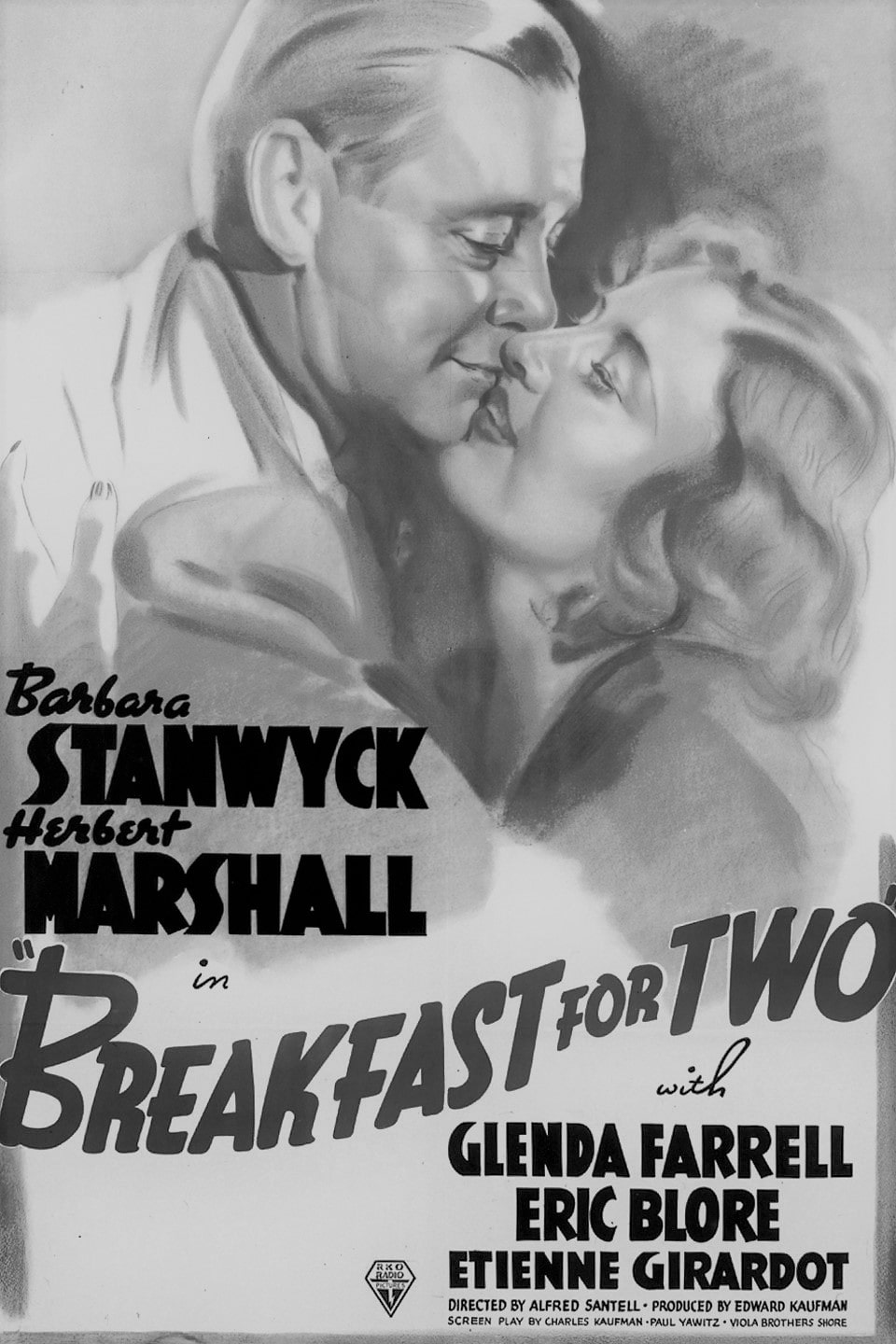 BREAKFAST FOR TWO (1937)
BREAKFAST FOR TWO (1937) (67 Min.) Genre: 1930 COMEDY, Transfer Quality: B
In this screwball comedy, Valentine Ransome (Barbara Stanwyck) is an heiress who falls for Jonathan Blair (Herbert Marshall), a carefree playboy who owns part of a large steamship line. However, Valentine doesn't especially like Jonathan's brassy fiancé, Carol Wallace (Glenda Farrell), and thinks he needs to start taking a more serious attitude about his money and his investments. To teach Jonathan a lesson (and get closer to him in the process), Valentine arranges to buy enough stock in the shipping company that she's the majority owner, and begins giving him orders about how things should be done. Jonathan isn't about to stand for that, and set off for a cruise on one of his ships, with Carol in tow and every intention of having the ship's captain marry them. But Jonathan's sidekick Butch (Eric Blore) doesn't like Carol any more than Valentine, and seizes every available opportunity to throw a spanner into the works. The same year that the versatile Barbara Stanwyck starred in this comic trifle, she received an Oscar nomination for her dramatic work in the movie Stella Dallas.
Starring: Barbara Stanwyck, Herbert Marshall, Glenda Farrell, Eric Blore | Directed by: Alfred Santell
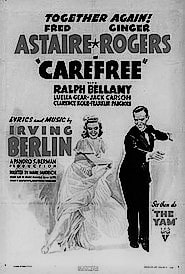 CAREFREE (1938)
CAREFREE (1938) (83 Min.) Genre: 1930 COMEDY, Transfer Quality: A
It's more Ginger Rogers than Fred Astaire, and more comedy than singing and dancing in this Astaire-Rogers entry into the screwball comedy sweepstakes which features a top-of-the-line Irving Berlin score (Change Partners, I Used to be Color Blind, The Night is Filled with Music). Fred Astaire plays Dr. Tony Flagg, a psychiatrist, who enters the psyche of Amanda Cooper (Ginger Rogers), a radio singer whom Tony's friend Stephen Arden (Ralph Bellamy) takes to see him. It seems Arden thinks that Amanda needs psychiatric help since she can't reach a decision regarding Stephen's proposal of marriage to her. As Tony explores her subconscious dream life, she falls in love with him. Tony feels that her love is temporary -- merely a sign of transference. To channel her love in the right direction, Tony hypnotizes her to believe that she is in love with Stephen. But then things become more complicated when Tony comes to realize that he, in fact, is in love with Amanda himself. He now has to figure out a way to bring her out of her hypnosis and get her back to normal so that they can both fall into the clinch.
Starring: Fred Astaire, Ginger Rogers, Ralph Bellamy, Luella Gear, Jack Carson | Directed by: Mark Sandrich
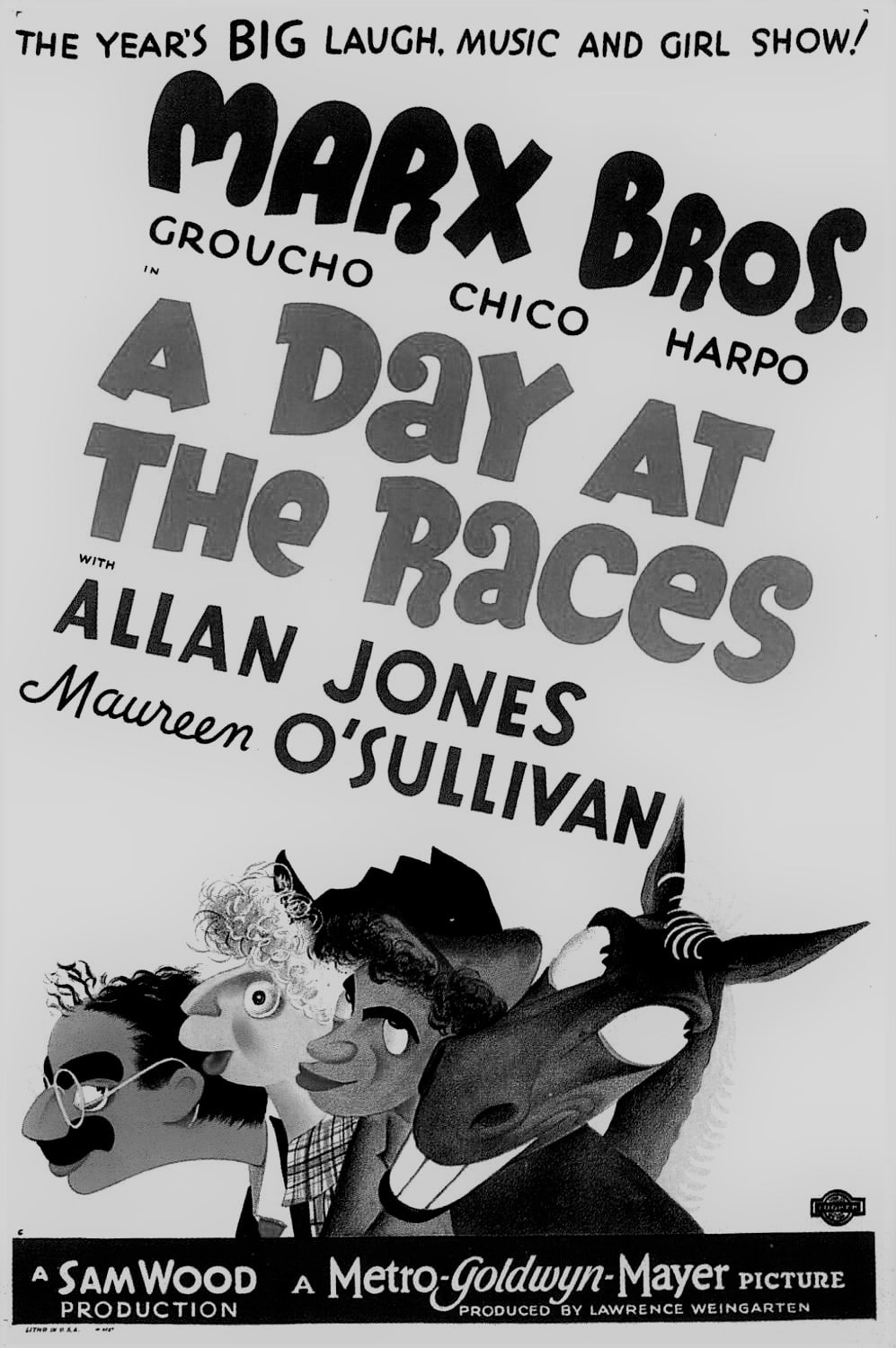 DAY AT THE RACES (1937)
DAY AT THE RACES (1937) (109 Min.) Genre: 1930 COMEDY, Transfer Quality: A
A Day at the Races was the Marx Brothers' follow-up to their incomparable A Night at the Opera. Groucho Marx is cast as Hugo Z. Hackenbush, a veterinarian who passes himself off as a human doctor when summoned by wealthy hypochondriac Emily Upjohn (Margaret Dumont) to take over the financially strapped Standish Sanitarium. Chico Marx plays the sanitarium's general factotum, who works without pay because he has a soft spot for its owner, lovely Judy Standish (Maureen O'Sullivan). Harpo Marx portrays a jockey at the local racetrack, constantly bullied by the evil Morgan (Douglass Dumbrille), who will take over the sanitarium if Judy can't pay its debts. After several side-splitting routines—Chico selling Groucho tips on the races, Chico and Harpo rescuing Groucho from the clutches of femme fatale Esther Muir, all three Marxes conducting a lunatic "examination" of Margaret Dumont—the fate of the sanitarium rests on a Big Race involving Hi-Hat, a horse belonging to the film's nominal hero, Allan Jones. Virtually everything that worked in "Opera" is trotted out again for "Races", including a hectic slapstick finale wherein the Marxes lay waste to a public event. What is missing here is inspiration; perhaps this is due to the fact that MGM producer Irving Thalberg, whose input was so essential to the success of "Opera", died during the filming of "Races". Even so, Day at the Races made more money than any other previous Marx Brothers film—the result being that MGM, in the spirit of "they loved it once", would continue recycling Races' best bits for the studio's next three Marx vehicles. — Hal Erickson
Starring: The Marx Brothers, Maureen O'Sullivan, Margaret Dumont, Allan Jones, Carole Landis | Directed by: Sam Wood
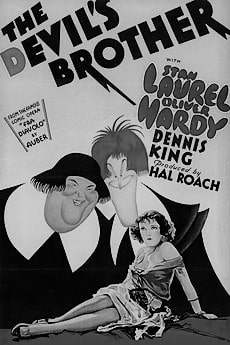 DEVIL'S BROTHER, THE (1933)
DEVIL'S BROTHER, THE (1933) (88 Min.) Genre: 1930 COMEDY, Transfer Quality: A
The most successful, and arguably best, of Laurel & Hardy's comic operas, The Devil's Brother firmly established that the team could be as funny in a feature film as they had for years in short subjects. Producer Hal Roach, who handled the main direction chores himself, had chosen an obscure 1830 opera by Daniel F. Auber about an Italian highwayman, Fra Diavolo, who masquerades as a foppish marquis in order to take from the rich and give to himself. What interested Roach was obviously the fact that the opera contained two comic supporting characters perfectly suited for the reigning comedy team of Stan Laurel and Oliver Hardy. They play Stanlio and Ollio, a couple of wanderers robbed of their life savings by one of the area's multitudinous highwaymen. In perhaps his most lucid moment, Stanlio suggests that they should recuperate their losses by becoming robbers themselves but, unfortunately, their first victim proves to be none other than the notorious Fra Diavolo (Dennis King), whose signature song "On Yonder Rock Reclining" sends shivers up the spine of all decent folks. After a failed attempt to hang the overfed Ollio, Fra makes the pair his personal servants. The remainder of the film depicts how Diavolo, as the Marquis, succeeds in robbing wayward noblewoman Lady Pamela (Thelma Todd) of 500,000 francs, cunningly sewn into her petticoats, despite the dubious assistance of Stanlio and Ollio. With all these shenanigans taking center stage, the opera's dull ingenues, inn-keeper's daughter Zerlina Lucile Browne and Captain Lorenzo (Arthur Pierson), can only watch, numbly one would expect, from the sidelines. After hiring Broadway baritone Dennis King to play the romantic hero, Roach hedged his bets by casting slapstick regulars James Finlayson and Thelma Todd as the warbling highwayman's main targets, thus assuring that the opera's trite libretto would never risk being taken serious. King was neither better nor worse than the average screen baritone but Miss Todd, especially, shined as the flirtatious Lady Pamela, one of this ultimately tragic comedienne's most vivid performances. In the end, of course, The Devil's Brother belongs squarely to Laurel & Hardy, the former memorably driving his partner (and everybody else) crazy with the frustrating dexterity of his "kneesy, easy, nosey" routine. Released to thunderous ovations in Europe as Fra Diavolo, The Devil's Brother has been reissued to television as both Bogus Bandits and The Virtuous Tramps. — Hans J. Wollstein
Starring: Stan Laurel, Oliver Hardy, Dennis King, James Finlayson | Directed by: Hal Roach, Charles R. Rogers
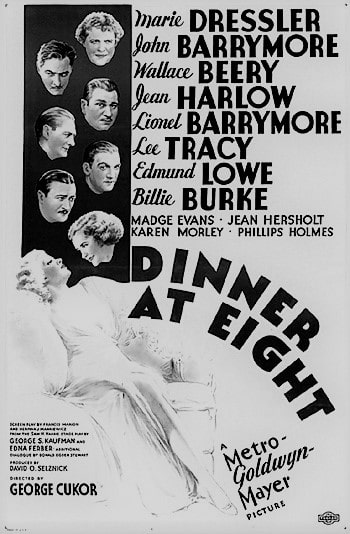 DINNER AT EIGHT (1933)
DINNER AT EIGHT (1933) (113 Min.) Genre: 1930 COMEDY, Transfer Quality: A
Based on the Broadway hit by George S. Kaufman and Edna Ferber, Dinner at Eight is a near-flawless comedy/drama with an all-star cast at the peak of their talents. Social butterfly Mrs. Oliver Jordan (Billie Burke) arranges a dinner party that will benefit the busines of her husband (Lionel Barrymore). Among the invited are a crooked executive (Wallace Beery), who is in the process of ruining Jordan; his wife (Jean Harlow), who is carrying on an affair with a doctor (Edmund Lowe); a fading matinee idol (John Barrymore), who has squandered his fortune on liquor and is romantically involved with the Jordan daughter (Madge Evans); and a venerable stage actress (Marie Dressler), who since losing all her money has become a "professional guest." Nothing goes as planned, due to various suicides, double-crosses, compromises, fatal illness, and servant problems. But dinner is served precisely at eight. The script by Herman Mankiewicz, Frances Marion, and Donald Ogden Stewart is a virtual enclyopedia of witty lines and scenes, right down to the unforgettable closing gag. — Hal Erickson
Starring: Marie Dressler, Jean Harlow, John Barrymore, Wallace Beery, Lionel Barrymore | Directed by: George Cukor
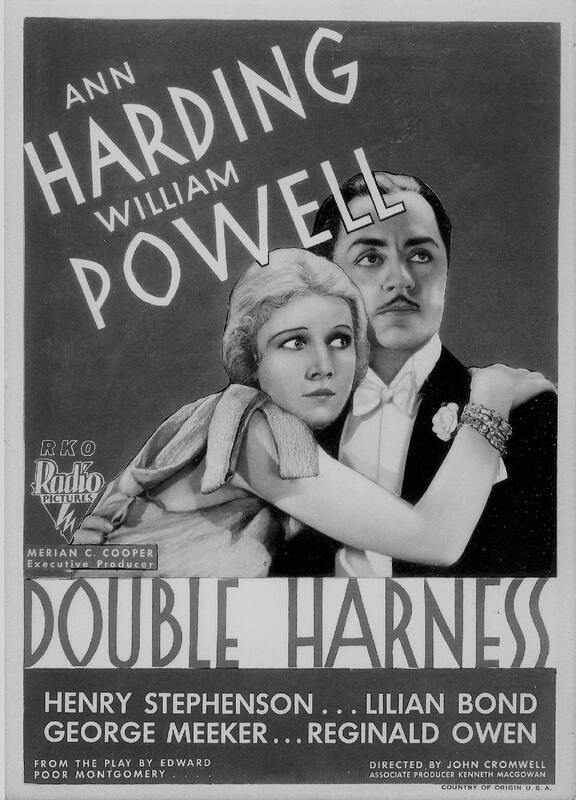 DOUBLE HARNESS (1933)
DOUBLE HARNESS (1933) (70 Min.) Genre: 1930 COMEDY, Transfer Quality: A
Joan Colby (Ann Harding) is the unmarried older daughter in a once-wealthy family. She's always been the mature, level-headed one among the two sisters, but she is feeling the pressure to find a husband especially strongly these days, as her much more flighty and impetuous younger sister Valerie (Lucille Brown) is about to marry. Joan has been lately seen in the company of John Fletcher (William Powell), the wastral heir to a once-great shipping company — he doesn't care a bit about the family business, but still has enough money to live an upper-class lifestyle without worry, and is a well-known playboy, and enjoys Joan's company. With her sister's help and the unwitting participation of her well-meaning father (Henry Stephenson), Joan manages to set up a situation in which John is forced to do what they used to call "the decent thing" and marry her. Joan is secretly torn by guilt about how she got his name, however, and tries to be a truly good wife for John over the months that follow — she gets him to clean up his life a bit, and to take himself more seriously and look past the next game of polo, and even starts to convince him to take more of a role in his family's moribund shipping line, which is about to pass into outside control as a result of his neglect. But when Valerie, in a fit of anger, blurts out the truth about how their marriage came about, John loses all interest in Joan, returning to the company of his ex-girlfriend (Lillian Bond) and turning the matter over to his lawyers. Now Joan has to fight on two fronts, to help save her husband's business, and also to save their marriage before it's too late. Given this plot, it may seem odd that Double Harness was presented as a comedy, but it is, and a good one, too. The humor lies in the way the upper-class are shown "coping" with the Great Depression, and the witty presentation of the romantic flirtations in the lives of Joan, Valerie, and John (and their friends), as well as the tone of John and Joan's marriage — Joan, in particular, has a wryly detached side that comes out even at her most unhappy moments. It's all very sophisticated, a comedy by adults, about adults, for adults, and it holds up amazingly well as a piece of entertainment across 75 years. In some ways, Double Harness is also a bit reminiscent of the 1930 version of Holiday, which is perhaps not entirely accidental or surprising, as the latter also starred Ann Harding, although Cromwell's 1933 film is a far more skillful and accomplished cinematic work by modern standards.
Starring: Ann Harding, William Powell, Henry Stephenson, Lillian Bond | Directed by: John Cromwell
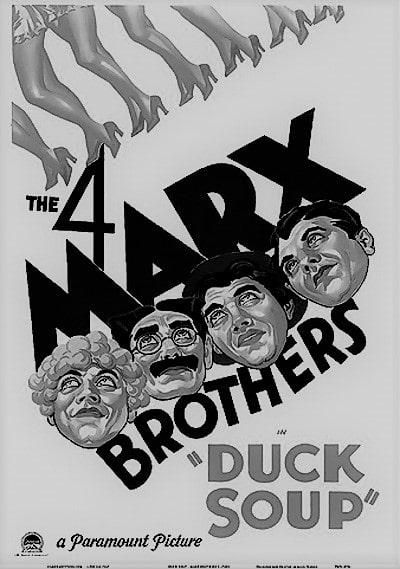 DUCK SOUP (1933)
DUCK SOUP (1933) (72 Min.) Genre: 1930 COMEDY, Transfer Quality: A
In this 1933 Marx Brothers film, the mythical country of Freedonia is broke and on the verge of revolution. Mrs. Teasdale (Margaret Dumont), Freedonia's principal benefactress, will lend the country $20 million if the president withdraws and places the government in the hands of the "fearless, progressive" Rufus T. Firefly (Groucho Marx). At his inauguration, Firefly shows up late, insults everyone in sight, and sings a song about how he intends to abuse his power. Naturally, the crowd cheers wildly. Meanwhile, Ambassador Trentino (Louis Calhern) of neighboring Sylvania schemes to oust Firefly and take over Freedonia himself. To gather enough evidence to discredit Firefly, he sends his most trusted spies, Chicolini (Chico Marx) and Pinky (Harpo Marx). Five minutes after they show up in Freedonia, both spies become important members of Firefly's cabinet, though Chicolini keeps his day job as a peanut vendor. Firefly eventually declares war on Sylvania, an absurd farrago with Firefly changing uniforms from scene to scene, Chicolini going to the other side because the food is better, and Pinky parading around the battlefield with a sandwich board reading "Join the Army and See the Navy." — Hal Erickson
Starring: The Marx Brothers, Margaret Dumont, Raquel Torres, Louis Calhern | Directed by: Leo McCarey
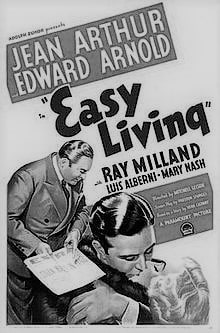 EASY LIVING (1937)
EASY LIVING (1937) (86 Min.) Genre: 1930 COMEDY, Transfer Quality: B
Financier J.B. Ball (Edward Arnold) -- known in the press as "the Bull of Broad Street" -- may be one of the wealthiest investment bankers in the country, but he also knows the value of a dollar. And when his wife (Mary Nash) spends 50,000 of them on a sable coat, he is driven into such a fury in the ensuing argument on the roof of their Fifth Avenue townhouse, that he throws the coat into the street -- where it promptly lands on the head of Mary Smith (Jean Arthur), a clerk-typist on her way to work, riding on the upper deck of a double-decker bus, ruining her hat in the process. She jumps off the bus to try to return the coat, but Ball insists that she keep it. What she really needs, however, is not a 50,000-dollar sable coat so much as a ride to work -- as she doesn't even have a dime for bus fare -- and perhaps a new hat. Ball obliges, taking her to one of the top clothing stores in New York, buying her an expensive fur hat to go with the coat, and then dropping her at work in his limo. Her superiors, seeing her decked out in a sable coat and a new hat, and getting out of the chauffeured car, conclude that Mary is a kept woman, and, therefore, unfit to work for the boys magazine where she is employed, and they fire her. Now out of work and virtually broke, she seems to have become a victim of random fate, but suddenly the scales start to tip the other way from the very same misunderstanding that got her fired. Having been seen in the company of J.B. Ball -- whose name she didn't even get -- she is rumored to be his mistress; the prissy clothing store proprietor (Franklin Pangborn) spreads this story, and that turns Mary into the object of attention for Mr. Louis Louis (Luis Alberni), the owner of a failed luxury hotel on which Ball's bank holds the mortgage, and is about to foreclose. For reasons that she can't begin to understand, since there is nothing going on between her and J.B. Ball (whose name she doesn't even know), or between her and anyone, Louis moves her into the most luxurious suite in his hotel for a dollar a day, asking her only to inform "that certain someone" of how she loves living there. Mary has no idea of who "that certain someone" is, or what Louis is talking about, but she needs a place to live, and Louis is insistent. She still needs to eat, and, while trying to get a meal at the automat, she crosses paths with a handsome, well-meaning, but inept waiter (Ray Milland), who gets fired for helping her. She takes him into her suite so he has a place to stay, and the two fall in love in the course of finding out about each other. She knows that he is John Ball Jr., but doesn't realize that he is the son of J.B. Ball, trying to make it on his own, nor does she yet realize who J.B. Ball is, in terms of being the man who gave her the coat and the new hat, or one of the wealthiest men in the country. But after the elder Ball spends an innocent night at the Hotel Louis, a gossip columnist named "Wallace Whistling" (William Demarest) prints that he is keeping a woman at the hotel, and suddenly the Hotel Louis, perceived as a fashionable playground for the upper-crust, is filled with guests. This multiple case of mistaken identity plunges through two or three new layers, eventually bringing about an impending stock market crash to rival 1929, before Mary discovers who her would-be benefactor and her would-be fiancé are. She bails them out of the jam that they're in, also restoring the Ball's marriage, her own reputation, and her romance with Ball's son in the process.
Starring: Jean Arthur, Edward Arnold, Ray Milland, Luis Alberni, William Demarest, Lee Bowman, Marsha Hunt, Dennis O'Keefe | Directed by: Mitchell Leisen
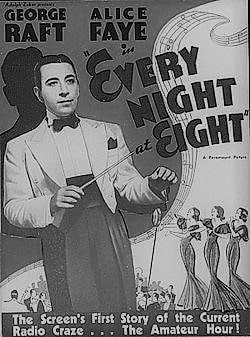 EVERY NIGHT AT EIGHT (1935)
EVERY NIGHT AT EIGHT (1935) (80 Min.) Genre: 1930 COMEDY, Transfer Quality: B
Alice Faye, Frances Langford, and Patsy Kelly play three humble factory workers (with a Hollywoodized wardrobe beyond the budget of any genuine factory girl) who occasionally sing together for the fun of it. They harbor dreams of becoming famous, but the prospect isn't likely until bandleader George Raft hears the girls harmonizing. He promotes the girls into top radio stars, while each of the girls entertains romantic thoughts about Raft. (And yes, he does win one of them romantically, at the end of the picture). The likable but unimportant Every Night at Eight sparked a minor controversy in the rarefied world of 1960s film criticism. "Auteur" theorist Andrew Sarris pointed out a brief scene in which star George Raft awakens from a nightmare, cited other such scenes in the work of director Raoul Walsh, and used this "evidence" to support his theory that Walsh was a true auteur who left his "signature" on each of his films. Anti-auterist Pauline Kael spoke for many when she advised Sarris to go fly a kite.
Starring: George Raft, Alice Faye, Frances Langford, Patsy Kelly, Jimmy Hollywood, Dennis O'Keefe | Directed by: Raoul Walsh
 EX-LADY (1933)
EX-LADY (1933) (65 Min.) Genre: 1930 COMEDY, Transfer Quality: B
In this romantic sex-comedy from director Robert Florey, Bette Davis stars as Helen Bauer, a free-spirited, self-sufficient feminist who would rather pursue her career as a graphic artist than settle down and marry Don Peterson (Gene Raymond), the advertising writer she loves, out of fear that marriage will destroy the romance. Eventually, Don wears Helen down and the couple marry. But when the flame quickly burns out, Don begins an affair with a female client. Not to be outdone and without missing a beat, Helen takes up with Nick Malvyn (Monroe Owsley), another ad writer, who by no coincidence also happens to be Don's biggest rival. In light of their respective bouts of infidelity, the couple must consider whether or not they want to give the marriage another shot.
Starring: Bette Davis, Gene Raymond, Frank McHugh, Monroe Owsley, Claire Dodd | Directed by: Robert Florey
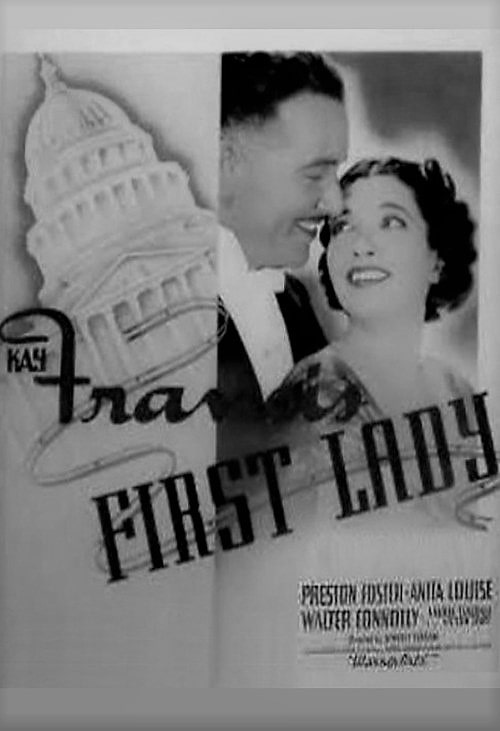 FIRST LADY (1937)
FIRST LADY (1937) (82 Min.) Genre: 1930 COMEDY, Transfer Quality: A
Based on the 1935 Broadway play by George S. Kaufman and Katharine Dayton, First Lady is not, as might be assumed, the story of the first woman president. The central character, played by Kay Francis, is the granddaughter of a president (though clearly inspired by Teddy Roosevelt's daughter Alice). Ms. Francis is married to Secretary of State Preston S. Foster, whom she hopes to propel into the White House. Her principal rival is the wife (Veree Teasdale) of a mildly corrupt supreme court justice (Walter Connolly). The rival is planning to divorce her husband and promote her own, younger presidential aspirant (Victor Jory). Kay retaliates by mounting a mock campaign for the befuddled justice—which snowballs into the real thing. — Hal Erickson
Starring: Kay Francis, Anita Louise, Veree Teasdale, Louise Fazenda | Directed by: Stanley Logan
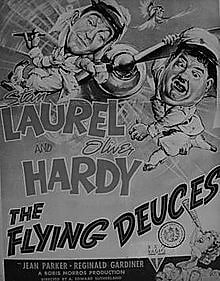 FLYING DEUCES, THE (1939)
FLYING DEUCES, THE (1939) (65 Min.) Genre: 1930 COMEDY, Transfer Quality: A
In their first starring feature away from the Hal Roach studios, Stan Laurel and Oliver Hardy play a couple of fish peddlers from Des Moines on a Cook's Tour of Paris. While stopping over at quaint suburban inn, Ollie falls in love with innkeeper's daughter Georgette (Jean Parker). At Stan's prodding, Ollie pops the question to Georgette, who gently refuses because there is Someone Else. Disconsolately, Ollie decides to commit suicide by jumping into the Seine, insisting that Stan join him in his plunge to oblivion. The boys are halted from this drastic action by the timely arrival of Francois (Reginald Gardiner), an officer in the French Foreign Legion. Francois convinces Stan and Ollie that they'll forget all about Ollie's lost love if they join the Legion, and within a few days our heroes are in uniform at an outpost in French Morocco, where they are promptly assigned to laundry detail. Alas, try as he might, Ollie can't forget his beloved Georgette-until Stan suggests that he pretend to forget so that they can get back in their own clothes and head home. This Ollie does, but not before accidentally setting fire to a mountain of laundry. After leaving behind a rather nasty letter of resignation for their scowling commandant (Charles Middleton), Stan and Ollie pack their bags and head for the airport-where Ollie is reunited with Georgette, who turns out to be the wife of their commanding officer Francois! Sentenced to death for desertion, the boys tunnel their way out of their jail cell and hide out in an airplane, which Stan accidentally sends into flight. After a wild and noisy ride, the plane crashes, leading to the flm's hilarious-and somehow touching—"freak" ending. Officially a remake of Les Aviateurs, a French vehicle for Fernandel and Toto, The Flying Deuces also owes a lot to the earlier Laurel & Hardy Foreign Legion farce Beau Hunks. Highlights include Stan and Ollie's impromptu soft-shoe rendition of "Shine on Harvest Moon", and Stan's lunatic excursion into Harpo Marx territory as he plays a bed-spring "harp". Produced by Boris Morros and released by RKO Radio, Flying Deuces is unquestionably the best of Laurel & Hardy's non-Hal Roach vehicles. — Hal Erickson
Starring: Stan Laurel, Oliver Hardy, Jean Parker, Reginald Gardiner, Charles B. Middleton | Directed by: Edward Sutherland
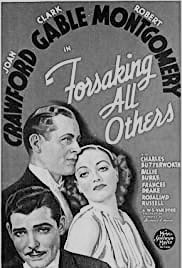 FORSAKING ALL OTHERS (1935)
FORSAKING ALL OTHERS (1935) (84 Min.) Genre: 1930 COMEDY, Transfer Quality: A
For 20 years, Jeff Williams (Clark Gable) has been in love with his childhood playmate Mary Clay (Joan Crawford). Alas, Jeff has never said as much, thus Mary becomes engaged to another childhood friend, Dill Todd (Robert Montgomery). Returning from a trip to Spain for the purpose of proposing to Mary, Jeff is taken aback when he learns of the impending marriage. Stout fellow that he is, however, he agrees to act as Dill's best man. Comes the day of the wedding, and Dill leaves Mary at the altar to run off with his mistress Connie (Frances Drake). Jeff stays behind to console Mary — yet he still doesn't tell her how much he loves her. Small wonder, then, that a chastened Dill is able to rekindle his romance with Mary and plan a second ceremony. Disillusioned, Jeff is about to return to Spain, when at the last minute, comedy-relief Charles Butterworth tells Mary what's up with Jeff. "Suddenly everything is clear!" says Mary — 84 minutes after the MGM lion introduced Forsaking All Others. Its plot absurdities aside, this star vehicle is splendidly glossy entertainment. — Hal Erickson
Starring: Joan Crawford, Clark Gable, Robert Montgomery, Charles Butterworth | Directed by: W.S. Van Dyke
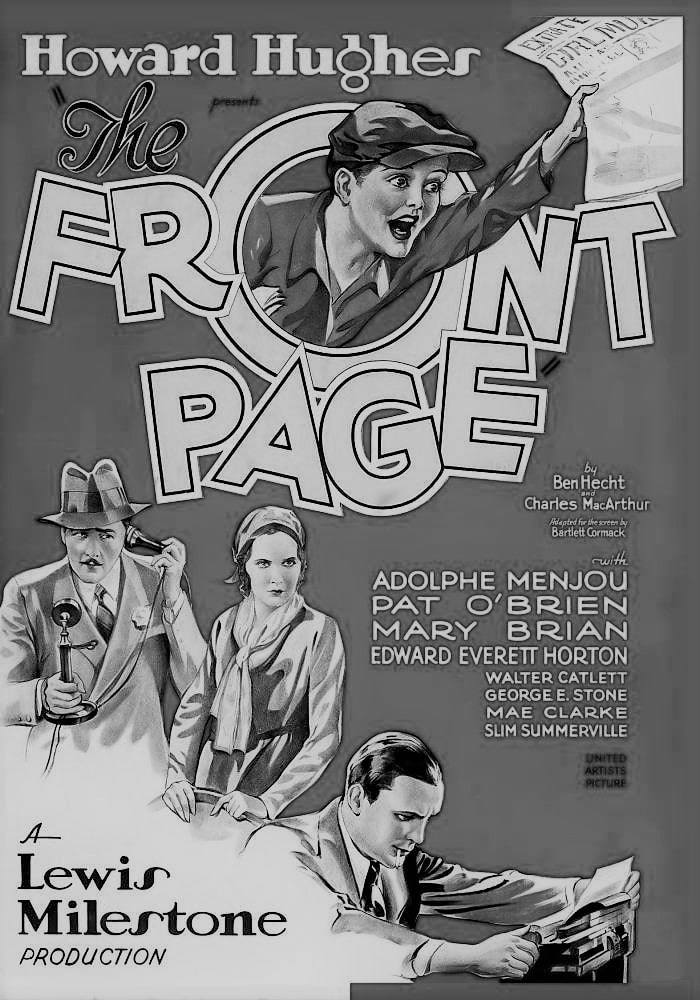 FRONT PAGE, THE (1931)
FRONT PAGE, THE (1931) (100 Min.) Genre: 1930 COMEDY, Transfer Quality: A
This first of four film versions of the Ben Hecht/Charlrd MacArthur Broadway hit stars Adolphe Menjou as explosive Chicago newspaper-editor Walter Burns and Pat O'Brien as his star reporter Hildy Johnson. Hildy is on the verge of getting married and retiring from Burns' dirty little tabloid, but he agrees to cover one last story: the politically motivated execution of convicted cop killer Earl Williams (George E. Stone). Thanks to the stupidity of the police, Williams manages to escape, and Johnson hides the wounded fugitive in a rolltop desk in the prison pressroom. Burns enters the scene, senses a swell story (and also a means of keeping Johnson on his payroll), and conspires with Johnson to keep Williams out of sight until they can secure an exclusive interview. Burns will do anything to keep Johnson on the scene, including having the reporter's future mother-in-law kidnapped. Complicating matters are Johnson's fiancée Peggy (Mary Brian), Williams' girlfriend Molly Malloy (Mae Clarke), and the corrupt mayor (James Gordon) and sheriff (Clarence C. Wilson), who have railroaded Williams to the death house in order to win votes and are now trying to suppress the news that the governor has commuted Williams' sentence. The Front Page was remade by Howard Hawks in 1939 as His Girl Friday, with the symbiotic relationship between Burns and Johnson changed to a sexual one by transforming Hildy Johnson into a woman (played by Rosalind Russell) with Cary Grant as her old flame Walter. It was again remade by Billy Wilder in 1974 with Jack Lemmon, Walter Matthau, Carol Burnett, and a young Susan Sarandon. — Hal Erickson
Starring: Adolphe Menjou, Pat O'Brien, Mary Brian, Edward Everett Horton, Frank McHugh | Directed by: Lewis Milestone
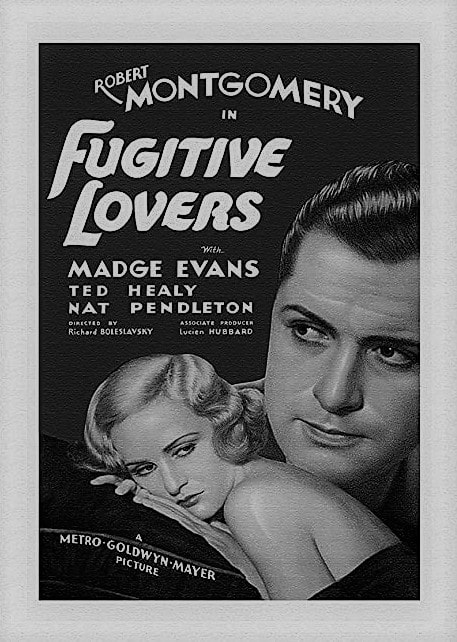 FUGITIVE LOVERS (1934)
FUGITIVE LOVERS (1934) (84 Min.) Genre: 1930 COMEDY, Transfer Quality: A
Though it's also a "bus" picture, MGM's Fugitive Lovers is as different from Columbia's It Happened One Night as oil and water. Escaping from her gangster boyfriend Legs (Nat Pendleton), chorus girl Letty (Madge Evans) boards a Greyhound bus bound for California. Likewise a passenger — albeit a non-paying one — is Porter (Robert Montgomery), a fugitive from justice. As the bus rolls ever onward, hero and heroine are inexorably drawn together, despite the looming twin threats of arrest and/or extermination. The already incredible plotline takes an even more bizarre turn when Porter is obliged to rescue a group of children who've been trapped in a snowbound school bus somewhere in the Rockies. Fugitive Lovers is fascinating on two levels: as a showcase for the directorial excesses of Richard Boleslawski (this picture has more offbeat camera angles than Citizen Kane) and for the comedy relief of Ted Healy and his Stooges (Curly, Larry and Moe — with Curly as the unofficial leader of the group!) The scene in which Moe Howard tries to make time with Madge Evans is worth the admission price in itself. — Hal Erickson
Starring: Robert Montgomery, Madge Evans, Ted Healy, Nat Pendleton | Directed by: Richard Boleslawski
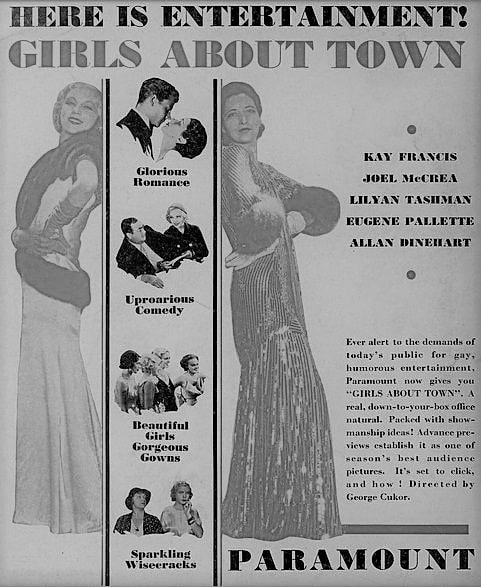 GIRLS ABOUT TOWN (1931)
GIRLS ABOUT TOWN (1931) (80 Min.) Genre: 1930 COMEDY, Transfer Quality: B
Kay Francis and Lilyan Tashman portray what used to be euphemistically labelled "good time girls". They work the convention circuit, providing companionship and other favors for tired business men--who of course lavish the girls with expensive gifts. Francis spoils this little set-up by falling for poor but virtuous Joel McCrea. Meanwhile, Tashman continues plying her trade with wealthy Eugene Pallette, whose wife responds not with jealousy but by trying to imitate Tashman's style! Girls About Town is the sort of ribald film fare that would be chased off the screen a few years later by the more stringent Production Code.
Starring: Kay Francis, Joel McCrea, Lilyan Tashman, Eugene Pallette, Claire Dodd | Directed by: George Cukor
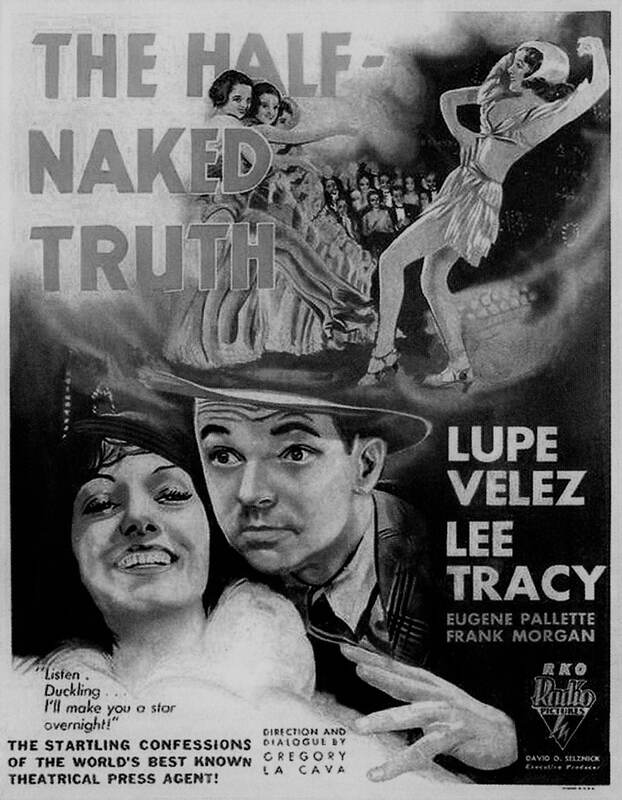 HALF-NAKED TRUTH, THE (1933)
HALF-NAKED TRUTH, THE (1933) (77 Min.) Genre: 1930 COMEDY, Transfer Quality: A
A broad lampoon of celebrity worship, The Half-Naked Truth stars Lee Tracy as a carnival huckster and Lupe Velez as a "kootch" dancer. Reaching for the moon, Tracy passes Lupe off as an exotic foreign princess—and manages to pull the wool over the eyes of all Manhattan. Now "famous for being famous", Lupe is employed for special appearances by Ziegfeldish impresario Frank Morgan. When the fraud is revealed to the world, Tracy returns to the carnival, with Lupe (who's loved him since Reel One) at his side. Half-Naked Truth co-stars Eugene Pallette as Tracy's assistant; the bullfrog-voiced Pallette has a wonderful moment in which he discovers that he's been mistaken for "Princess" Lupe's head eunuch! — Hal Erickson
Starring: Lupe Velez, Lee Tracy, Eugene Pallette, Frank Morgan | Directed by: Gregory La Cava
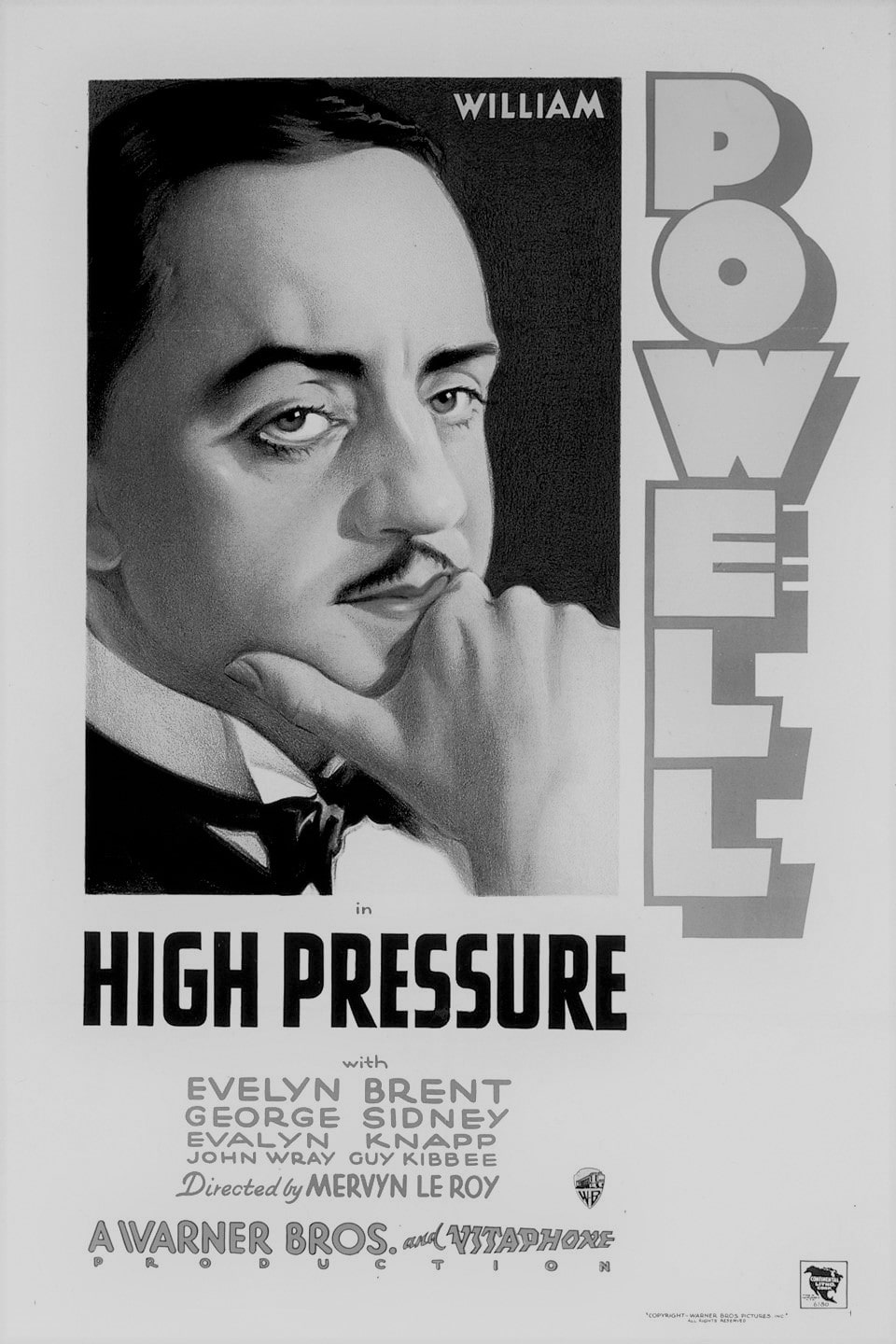 HIGH PRESSURE (1932)
HIGH PRESSURE (1932) (74 Min.) Genre: 1930 COMEDY, Transfer Quality: B
Based on Abel Kandel's 1931 play Hot Money, this delightfully daffy comedy from Warner Bros. is a typical example of that studio's turbo-charged dialogue and irreverent attitude. William Powell, at the top of his game here, plays Gar Evans, the "world's foremost promoter," hired by Jewish entrepreneur Ginsberg (George Sidney) to boost a new discovery that may turn sewage into artificial rubber. Unfortunately, after Evans and his minions have talked untold suckers into buying stocks in the dubious venture, the inventor (Harry Beresford) goes missing. The good professor turns up eventually but proves to be quite demented and the entire scheme is about to fall apart when Evans, more or less at the seat of his pants, manages to sweet-talk himself into an even better deal. William Powell is a marvel in this comedy, whether cheerleading a gaggle of would-be salesmen or attempting to persuade a disillusioned Francine (Evelyn Brent), his good luck charm, to stay onboard despite ever impending doom. Miss Brent, who usually had only one expression — sullen hauteur — is quite charming as Powell's long-suffering girlfriend; and Frank McHugh, whose comedy relief often proved more grating than funny, is more than tolerable this time around as Powell's rah-rah second lieutenant. And finally there is veteran dialectician George Sidney, whose worried entrepreneur offers some of High Pressure's best laughs. A French-language version, La Bluffeur, was produced later in 1932 featuring Andre Luget as the promoter and Danish comic Torben Meyer as Ginsberg. Warner Bros. remade the story under its original title, Hot Money, in 1936, this time featuring Ross Alexander and Joseph Cawthorn.
Starring: William Powell, Evelyn Brent, George Sidney, Guy Kibbee, Frank McHugh | Directed by: Mervyn LeRoy
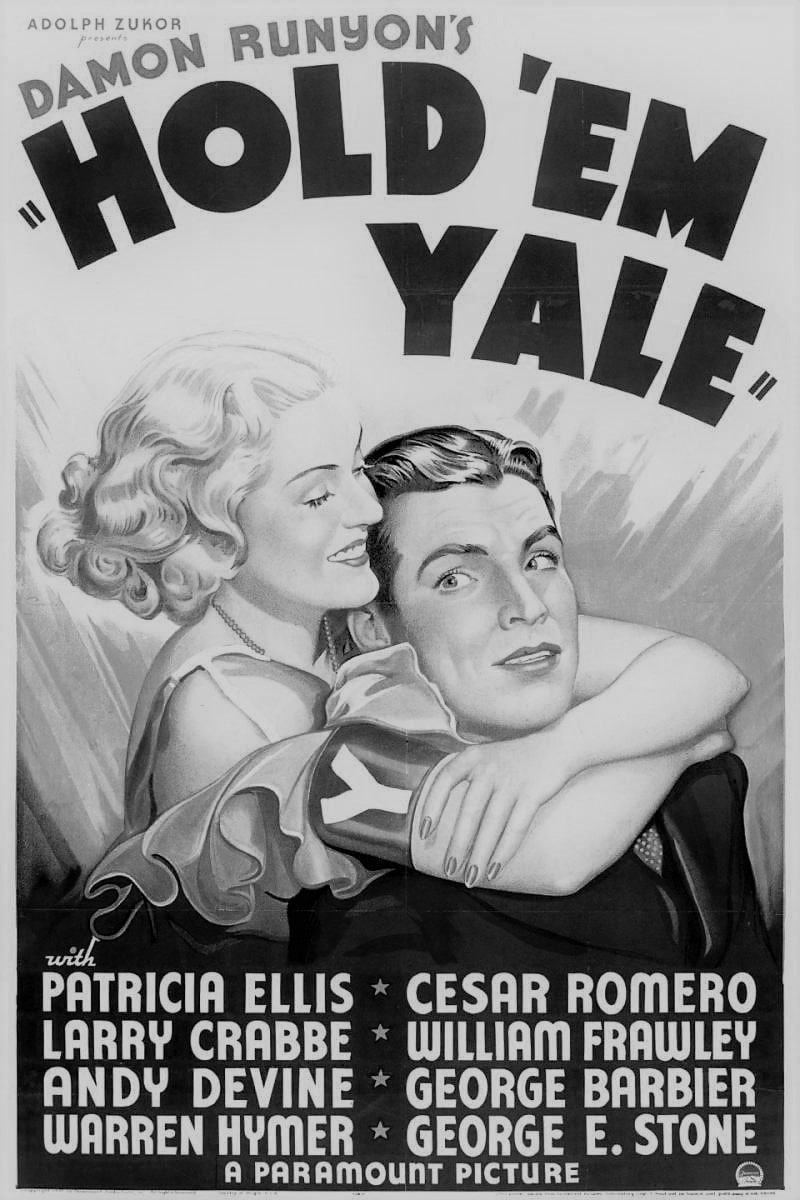 HOLD 'EM YALE (1935)
HOLD 'EM YALE (1935) (61 Min.) Genre: 1930 COMEDY, Transfer Quality: C
Based on a story by Damon Runyon, Hold 'Em Yale is also more than a little beholden to O. Henry's Ransom of Red Chief. Spoiled-rotten heiress Clarice Van Cleve (Patricia Ellis) is enticed to New York by fortune-hunter Gigolo Georgie (Cesar Romero), who dumps her in the apartment owned by Runyonesque hoodlums Sunshine Joe (William Frawley), Liverlips (Andy Devine), Sam the Goniff (Warren Hymer) and Benny Southstreet (George E. Stone). Plotting to hold Clarice for ransom, the four hooligans figure that this "dame" will be easy to handle. Boy, are they wrong! Like the proverbial babysitter from hell, the temperamental Clarice is soon ruling the roost in the foursome's hideout. The beleaguered crooks offer to ship the girl back to her father, Mr. Van Cleve (George Barbier), only to find out that he won't take her back — not even for free! In desperation, the four hoods try to marry Clarice off to college football-hero Hector Wilmot (Buster Crabbe), and to that end they try their best (?) to "fix" the annual Yale-Harvard game so that Hector will prove worthy of the hoydenish heroine — which, as it turns out, was Mr. Van Cleve's plan all along. — Hal Erickson
Starring: Patricia Ellis, Cesar Romero, Larry "Buster" Crabbe, William Frawley | Directed by: Sidney Lanfield
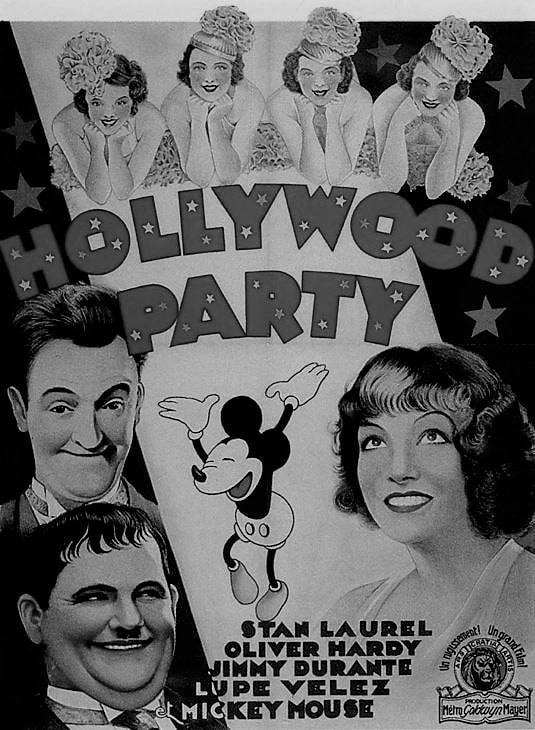 HOLIDAY PARTY (1934)
HOLIDAY PARTY (1934) (72 Min.) Genre: 1930 COMEDY, Transfer Quality: B
Hollywood Party was planned as a lavish, star-studded MGM musical titled Hollywood Revue of 1933. Under the less-than-sterling guidance of "kicked upstairs" MGM producer Harry Rapf, production dragged on interminably, using up the talents of five directors (none of whom were credited) and seven writers. The "all star" cast lineup slowly dwindled down to comparatively inexpensive contract players Jimmy Durante and Jack Pearl (radio's Baron Munchhausen) and a passel of non-MGM personalities. The final product wove a goofy story about The Great Schnarzan (Durante), a jungle-movie star whose films are suffering at the box office because his lions are anemic. Schnarzan schemes to purchase several healthy lions from Baron Munchhausen; to get the baron into a bargaining mood, Schnarzan throws a huge Hollywood party in Munchhausen's honor. Liondora (George Givot), Schnarzan's "hated rival", hopes to purchase the Baron's lions for himself, and crashes the party disguised as a Greek Baron. Also figuring into the plot are the members of the Klemp family (Charles Butterworth, Polly Moran and June Clyde), who are filthy rich and thus quite attractive to both Schnarzan and Liondora; poor-but-honest Eddie Quillan, who romances the Klemp's daughter; and Schnarzan's ex-girlfriend Lupe Velez, who shows up at the party in an astonishingly revealing gown for the express purpose of making trouble. In an amusing animated sequence courtesy of Walt Disney, Mickey Mouse introduces the Technicolor musical exploits of "The Hot Chocolate Soldiers." Shortly before the end, Stan Laurel and Oliver Hardy make a welcome appearance as a pair of lion-farm owners who wish to collect a debt from Baron Munchhausen. This segues into the classic egg-breaking sequence involving Stan, Ollie, and Lupe Velez. Now we've reached the 65 minute mark, with no logical ending in sight. Director Allan Dwan, brought into the project at the last minute, took a look at the existing footage and declared "It's a nightmare!" Inspired, Dwan directed a closing sequence which suggested that the whole plot had been dreamed by Jimmy Durante; Durante is wakened from his slumbers by his wife—played by Mrs. Jimmy Durante. Hollywood Party makes no sense at all, but it's a must for comedy lovers and 1930s film buffs. Don't miss that opening number, written by Rodgers and Hart and performed by Frances Williams and a chorus of barely dressed telephone operators; and keep an eye peeled for a lengthy uncredited appearance by the Three Stooges.
Starring: Jimmy Durante, Lupe Velez, Stan Laurel, Oliver Hardy, Charles Butterworth | Directed by: Allan Dwan, Richard Boleslawski, Edmund Goulding, Charles "Chuck" Riesner, Roy Rowland, Sam Wood, George Stevens
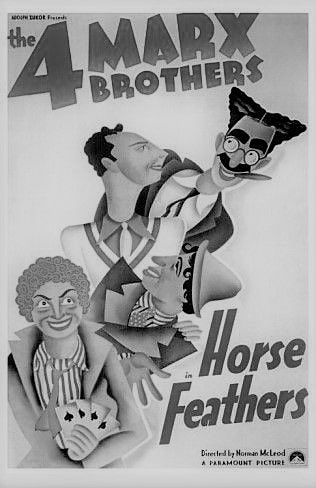 HORSE FEATHERS (1932)
HORSE FEATHERS (1932) (70 Min.) Genre: 1930 COMEDY, Transfer Quality: A
If ever there was an archetypal Marx Brothers comedy, it was the team's 1932 offering Horse Feathers. Groucho Marx is cast as Professor Quincy Adams Wagstaff, the newest president of Huxley College. As he delivers his introductory speech before the assembled student body ("As I look out among your smiling, eager faces, I can readily understand why this college is flat on its back"), he maps out his plans for the future by singing those deathless hits Whatever It Is, I'm Against It and I Always Get My Man. He then has a powwow with his son Frank (Zeppo Marx), who has been a Huxley student for 12 years. Frank tells his old man that Huxley has had a new president every year since 1888, the year the college won its last football game. The only way to save the establishment is to hire a couple of good football players, Mullen and McHardie (Jim Pierce and Nat Pendleton), who hang out at the local speakeasy. With his usual efficiency, Professor Wagstaff signs up the wrong men for the Huxley team: Baravelli (Chico Marx), the ice man/bootlegger, and Pinky (Harpo Marx) the dog catcher. Meanwhile, gambler Jennings (David Landau), who has all his money bet on Darwin College in the upcoming Thanksgiving Day football game, instructs his girlfriend Connie Bailey (Thelma Todd), the college widow, to get her hands on Huxley's secret football signals. This leads to a frenetic four-way courtship in Connie's apartment, as Wagstaff, Baravelli, Pinky and Frank duck in and out of doors and windows to romance the heroine. Later on, Baravelli and Pinky try to kidnap Mullen and McHardie to keep them out of the Big Game, only to end up kidnapped themselves. Miraculously, all four of our heroes show up at the Huxley-Darwin game in time, achieving victory through some of the most creative cheating in gridiron history. Written by such renowned wits as S. J. Perelman, Will B. Johnstone, Bert Kalmar and Harry Ruby, Horse Feathers is a comedy smorgasbord, offering generous doses of all four Marx Brothers performing some of their best-ever material. Who could not love a film in which, just before Chico Marx launches into his obligatory piano solo, Groucho saunters up to the camera and growls "I've got to stay here, but that's no reason why you folks can't go into the lobby until this thing blows over"? In addition, this is the film that introduced the semi-satirical romantic ballad Everyone Says I Love You, which was used over six decades later as the title of a Woody Allen picture. Unfortunately, current prints of Horse Feathers are incomplete, with nearly five minutes of comedy material missing; the search goes on for a pristine, uncut negative. — Hal Erickson
Starring: The Marx Brothers, Thelma Todd, David Landau, Florine McKinney | Directed by: Norman McLeod
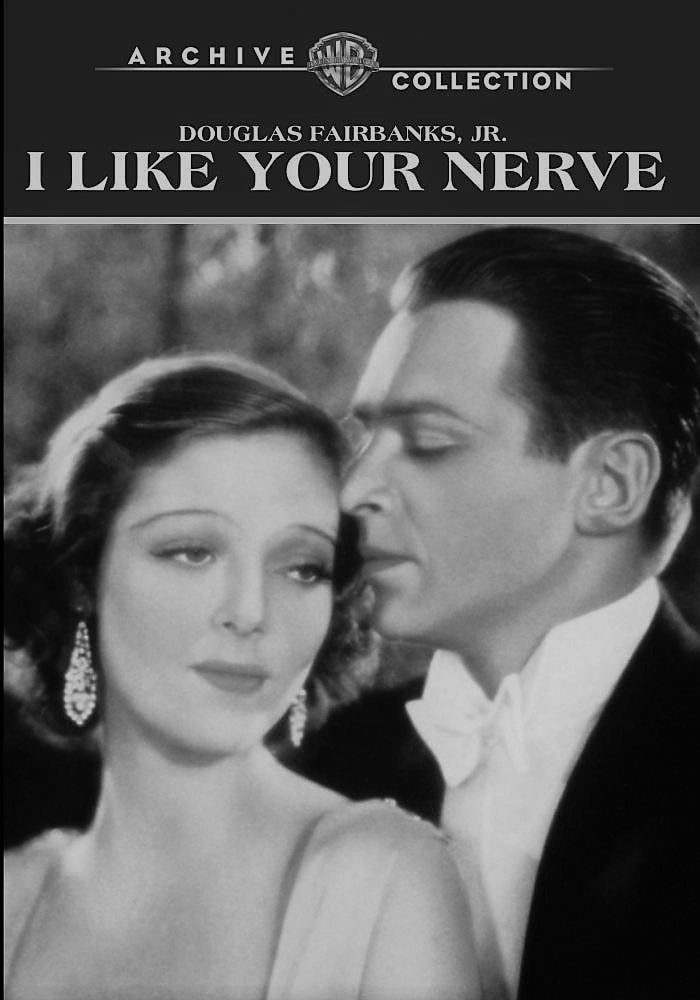 I LIKE YOUR NERVE (1931)
I LIKE YOUR NERVE (1931) (61 Min.) Genre: 1930 COMEDY, Transfer Quality: B
In this romantic comedy, a milquetoast bookworm finds his life transformed when he takes the advice of a fortune teller and travels to Central America. There he finds a distressed young woman about to be sold into marriage. His attempts to rescue her change him into a swashbuckling hero. In the end they marry.
Starring: Douglas Fairbanks, Jr., Loretta Young, Claud Allister, Andre Cheron | Directed by: William McGann
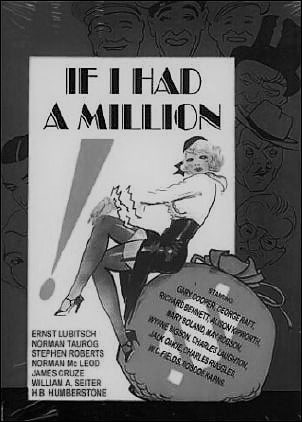 IF I HAD A MILLION (1932)
IF I HAD A MILLION (1932) (88 Min.) Genre: 1930 COMEDY, Transfer Quality: B
Based on a story by Robert Andrews, If I Had a Million is a multipart comedy-drama employing Paramount's top directorial and acting talents. Refusing to leave his fortune to his grasping relatives, dying millionaire Richard Bennett selects several people at random from the phone book and bestows upon each of them a check for one million dollars. The first recipient is henpecked husband Charlie Ruggles, who cheerily enters his former place of employment, a china shop, and smashes every bit of crockery in the place. Prostitute Wynne Gibson uses her money to escape from her sordid lifestyle and finally sleep in a bed all by herself. Forger George Raft finds that he can't convince anyone that his check is genuine, and ends up handing the check to a flophouse manager—who promptly burns it. Husband and wife W.C. Fields and Alison Skipworth, dismayed that their new car has been destroyed by a "road hog," utilize part of their million dollars to purchase a fleet of cars and then smash up every road hog in sight! Convicted murderer Gene Raymond hopes that his million will help finance a new trial, but the execution is carried out on schedule. Newly rich clerk Charles Laughton calmly makes his way through a series of offices, reaches his boss' desk, and delivers a loud Bronx cheer. Gary Cooper, Roscoe Karns and Jack Oakie play three brawling marines who think the check's a joke and sign it over to an illiterate lunch-counter owner. The last million-dollar recipient is May Robson, an elderly woman confined to a dismal nursing home. She spends her money to turn the home into a joyful resort for old people, forcing the formerly repressive nursing-home staffers to earn their paychecks by sitting all day in rocking chairs. The millionaire who started the plot rolling is given a new lease on life by May Robson's example, and he recovers from his "fatal" illness.
Starring: Gary Cooper, Charles Laughton, W.C. Fields, Charlie Ruggles, George Raft, Gale Patrick | Directed by: James Cruze
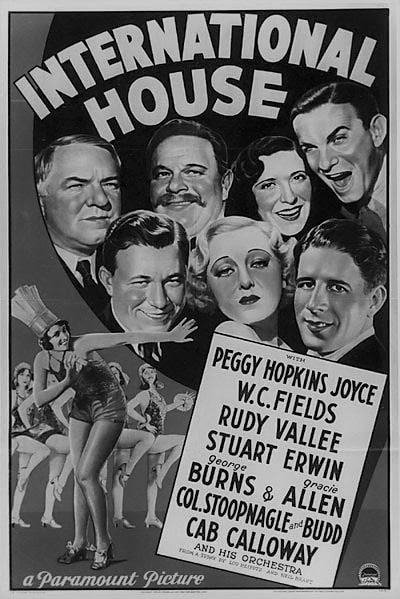 INTERNATIONAL HOUSE (1933)
INTERNATIONAL HOUSE (1933) (72 Min.) Genre: 1930 COMEDY, Transfer Quality: A
Hollywood responded to the exigencies of the Depression with such glorious nonsense as International House. The plot is motivated by a revolutionary television device called the Radioscope, which its Chinese inventor (Edmund Breese) is offering to the highest bidder. All interested parties are obliged to converge at International House, an ultra-modern hotel in the bustling Chinese community of Wu Hu. Among those parties is American envoy Stu Erwin, Russian general Bela Lugosi (a hilarious, pratfalling performance), the general's ex-wife Peggy Hopkins Joyce (a much-married showgirl of the era, who like Zsa Zsa Gabor was famous for being famous), and that celebrated aviator Professor Quail, better known as W.C. Fields. The lunacy begins even before Fields arrives, thanks to the antics of the hotel's doctor George Burns and nurse Gracie Allen. When Erwin comes down with the measles (he is always struck down by a childhood disease whenever he's about to marry his fiancee Sari Maritza), the hotel is quarantined. The guests make the most of their enforced stay by watching the many variety acts broadcast over the radioscope device: Rudy Vallee, singing a love song to his megaphone; Baby Rose Marie (the same), belying her 11 years by belting forth a hotcha jazz number; radio humorists Stoopnagle and Budd, showing off their own goofy inventions; and Cab Calloway, singing a paean to marijuana titled "Reefer Man" (only in recent years has this peppy number been seen with any regularity on television). There's also an elaborate production number on the dance floor of the hotel, featuring Sterling Holloway and a bevy of beauties dressed as cups and saucers. Once Fields drops in via his art-deco autogyro, the film is firmly in his pudgy hands. Erwin outbids the others for the radioscope, while Fields escapes in his aircraft with Peggy Hopkins Joyce in tow (she keeps insisting that she's sitting on something, whereupon Fields replies "I lost mine in the stock market"). A truly unique filmgoing experience, International House is a must-see for any aficionado of 1930s musical comedies. PS: The film's now-famous "outtake," showing Fields calmly advising the cast and crew not to panic while the set is rocked by a California earthquake, was actually staged several days after the genuine quake. — Hal Erickson
Starring: W.C. Fields, Peggy Hopkins Joyce, George Burns, Gracie Allen, Bela Lugosi | Directed by: Edward Sutherland
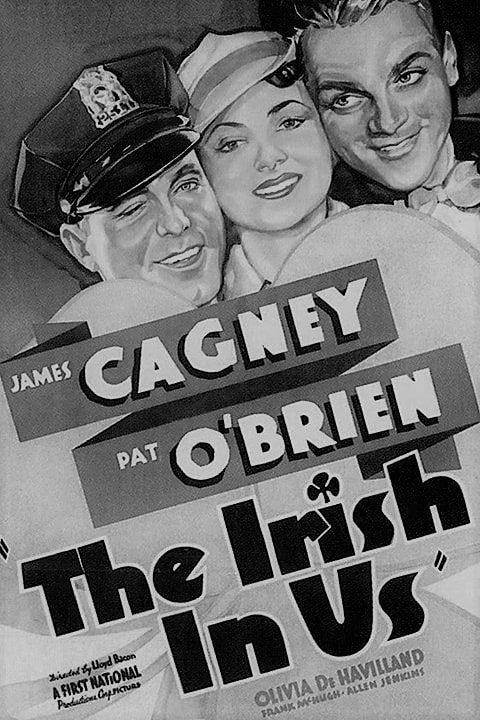 IRISH IN US, THE (1935)
IRISH IN US, THE (1935) (84 Min.) Genre: 1930 COMEDY, Transfer Quality: A
This fast-paced Warner Bros. comedy stars James Cagney and Pat O'Brien as brothers who fight over the same girl. Mrs. O'Hara (Mary Gordon) is the loving mother of three sons: fireman Mike (Frank McHugh), policeman Pat (O'Brien), and the boxing promoter Danny (Cagney). Mike wants to marry Lucille Jackson (Olivia deHaviland), the daughter of his boss, Captain Jackson (John Farrell MacDonald). However, Lucille falls for Danny, causing a fued between the two brothers at the Fireman's Ball. Danny believes he can make a fortune when he meets up with boxer Carbarn Hammerschlag (Allen Jenkins), who starts fighting whenever he hears a bell. On the night of his big fight against champion boxer Joe Delancey (Harvey Parry), Carbarn gets a toothache and Mike gives him some gin. He ends up getting drunk in the locker room and Danny has to fight Delancey in his place. With the help of his brothers, Danny wins the fight and the girl. — Andrea LeVasseur
Starring: James Cagney, Pat O'Brien, Olivia de Havilland, Frank McHugh | Directed by: Lloyd Bacon
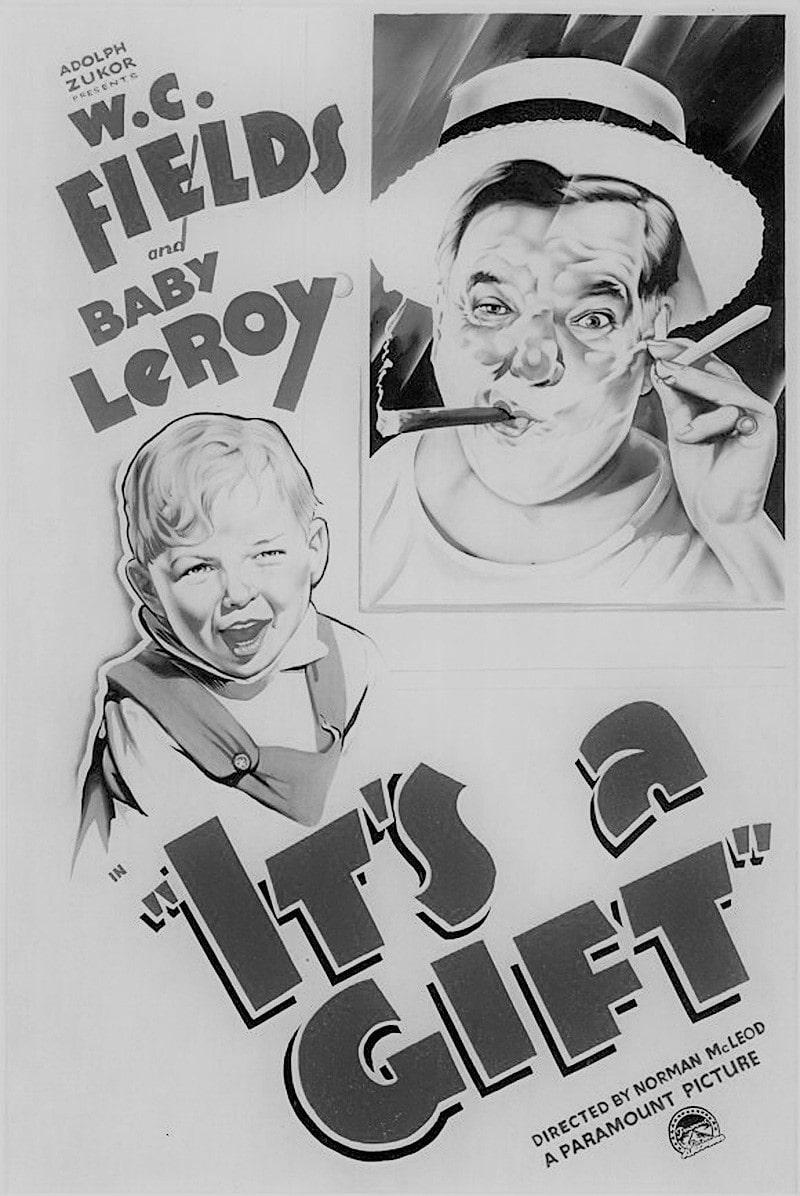 IT'S A GIFT (1934)
IT'S A GIFT (1934) (71 Min.) Genre: 1930 COMEDY, Transfer Quality: A
It's A Gift (1934) is often cited as W. C. Fields' best and funniest picture - it is undoubtedly one of the greatest, classic comedies ever made, although it is probably less well-known than his other two masterpieces: The Bank Dick (1940) and My Little Chickadee (1940). It was his sixteenth (out of twenty-eight) sound film - this time directed by Norman McLeod (director for the Marx Bros.' Monkey Business (1931) and Horse Feathers (1932)). The screenplay by Jack Cunningham was based on a story by Charles Bogle (Fields himself, under an alias). The core of the film remade his silent film It's the Old Army Game (1926) - a collection of gags from his best Ziegfeld Follies vaudeville sketches that co-starred Louise Brooks. Like all other Fields' films, this film wasn't nominated for an Academy Award.
Starring: W.C. Fields, Jean Rouverol, Julian Madison, Kathleen Howard | Directed by: Norman McLeod
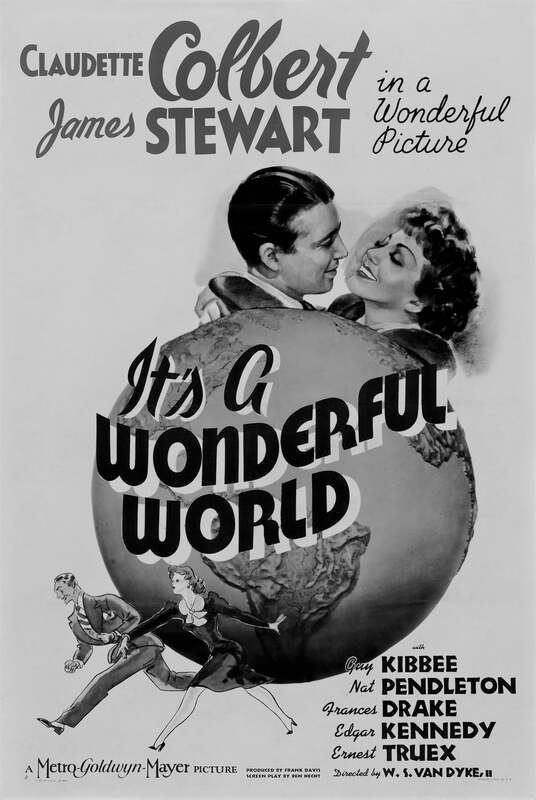 IT'S A WONDERFUL WORLD (1939)
IT'S A WONDERFUL WORLD (1939) (86 Min.) Genre: 1930 COMEDY, Transfer Quality: A
this frothy screwball comedy, Guy Johnson (James Stewart) is a private detective who is dedicated to his job but still quite green and a bit of a bumbler. Guy is hired to keep a close watch on Willie Heyward (Ernest Truex), a footloose millionaire with a habit of getting into trouble. One night, Willie ties one on and somehow ends up accused of murder, with Guy also charged as an accomplice. After the two are convicted, Guy escapes from the train taking him to prison, and he hits the road in hopes of finding evidence that will clear both himself and Willie. En route, Guy encounters Edwina Corday (Claudette Colbert), an eccentric poetess, and essentially abducts her, forcing her to let him use her car and help him as he tries to find the real murderer. But before long, Edwina seems more amused by Guy than threatened, and she falls in love with him as he assumes a bewildering series of disguises (actor, driver, Boy Scout) while trying to find the truth before it's too late. It's a Wonderful World also features Guy Kibbee, Edgar Kennedy, Sidney Blackmer, and Hans Conried. — Mark Deming
Starring: Claudette Colbert, James Stewart, Guy Kibbee, Frances Drake | Directed by: W.S. Van Dyke
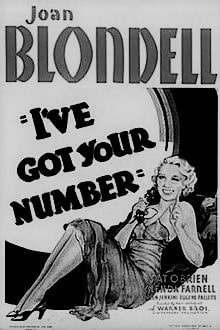 I'VE GOT YOUR NUMBER (1934)
I'VE GOT YOUR NUMBER (1934) (69 Min.) Genre: 1930 COMEDY, Transfer Quality: B
Completed just before the Production Code went into effect, I've Got Your Number is delightfully racy, risque entertainment. Pat O'Brien is all wisecracks and left hooks as Terry, a troubleshooter for the New York telephone company. Terry puts his talents — and his eavesdropping skill — to good use when he decides to rescue his switchboard-operator girlfriend Marie (Joan Blondell) from taking the fall in a stolen-bond scheme. Not to be taken seriously for a moment, I've Got Your Number concludes with a belly-laugh as Terry's old telephone-linemen pals "bug" his honeymoon suite. The only false note struck by the film is the notion that know-it-all Joan Blondell could be slickered twice by the same gang of con artists.
Starring: Joan Blondell, Pat O'Brien, Glenda Farrell, Allen Jenkins | Directed by: Ray Enright
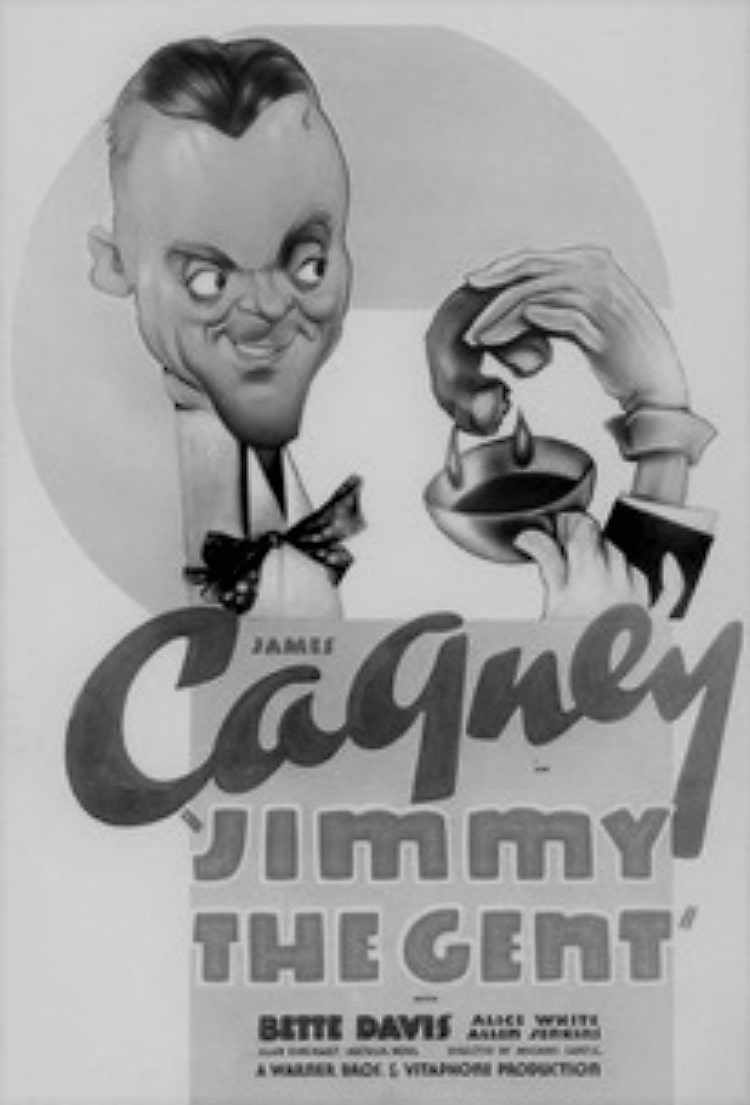 JIMMY THE GENT (1934)
JIMMY THE GENT (1934) (67 Min.) Genre: 1930 COMEDY, Transfer Quality: A
James Cagney runs a shady missing-heir tracing service, occasionally providing phony heirs in order to collect his fee. He suffers a tinge of jealousy when he takes a gander at the offices of a legitimate tracing firm, where his former girlfriend (Bette Davis) has taken a job. Jimmy soon learns that the reputable organization's boss (Alan Dinehart) is more crooked than Jimmy ever was, but he can't convince the girl of this fact. Using his own street smarts, Cagney exposes the "honest" heir tracer and agrees to go straight if his girl will come back to him. At the time Jimmy the Gent was filmed, James Cagney was getting tired of the formula pictures being handed him; rather than go on suspension, he expressed his displeasure by shaving his hair almost down to the bone, which is why he appears in this film with an uncharacteristic buzz-cut. — Hal Erickson
Starring: James Cagney, Bette Davis, Alice White, Allen Jenkins | Directed by: Michael Curtiz
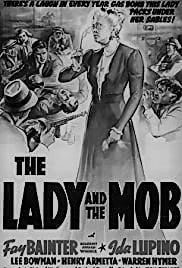 LADY AND THE MOB, THE (1939)
LADY AND THE MOB, THE (1939) (66 Min.) Genre: 1930 COMEDY, Transfer Quality: B
How could anyone dislike a film with the title Lady and the Mob? Sweet Fay Bainter stars as eccentric dowager Hattie Leonard, who takes it upon herself to smash a dry-cleaning racket. When the crooks and the cops laugh at her efforts, the resourceful Hattie sets about to organize her own mob, consisting of such soft-hearted yeggs as Warren Hymer and Joe Sawyer. With the help of her Runyonesque stooges-not to mention her grandson Jeff (Lee Bowman) and his sweetheart Lila (Ida Lupino)-Hattie manages to strike a blow for The American Way, bringing the villains to their knees. The supporting cast includes the ineffable Henry Armetta and versatile radio actor Tommy Mack, of "I'm not excited! WHO'S excited?" fame.
Starring: Fay Bainter, Ida Lupino, Lee Bowman, Henry Armetta | Directed by: Benjamin Stoloff
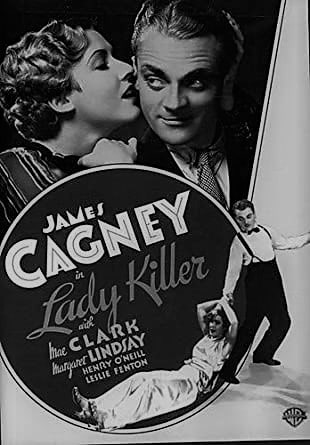 LADY KILLER (1933)
LADY KILLER (1933) (74 Min.) Genre: 1930 COMEDY, Transfer Quality: A
We first lay eyes on Jimmy Cagney in Lady Killer while he's working as a movie theater usher. This job lasts just long enough for Jimmy to be swindled in a "badger game" orchestrated by hard-boiled Mae Clarke and a gang of crooks headed by Douglass Dumbrille. Knowing a good thing when he sees it, Cagney joins the mob, and soon is calling the shots. But though he's got larceny in his soul, Cagney draws the line at murder, and when gang member Raymond Hatton is bumped off, Cagney and Clarke board the Super Chief and head to California. With the cops laying for Cagney in LA, he's suspicious of everyone. A shifty-looking mug (William B. Davidson) takes after Cagney on the street; catching up to the winded Cagney, the mug explains that he's a movie director, and that Cagney is a perfect "type" for an upcoming prison picture. After several months as a bit player, Cagney befriends good-natured movie-star Margaret Lindsay, who encourages Cagney to seek out bigger parts. The enterprising Cagney engineers a phony fan-mail campaign encouraging the studio to give him starring roles. Though now a slick, pomaded romantic lead in pictures, Cagney is still Cagney; when a snooty critic pans Lindsay's most recent performance, Cagney forces the reviewer to literally eat his words! It must needs be that Cagney's old gang shows up in Hollywood, planning to use Cagney's influence to gain entree into movie stars' mansions, then steal their valuables. Cagney says ixnay to this, so the mob schemes to take him for a ride. Tipped off by Clarke, Cagney is able to rout the crooks, save the day, and claim Lindsay for his bride. Lady Killer is vintage Cagney, throwing virtually every one of his star-making attributes (including one cute reference to his legendary "grapefruit scene" in 1931's Public Enemy) into one entertaining 76-minute stew.
Starring: James Cagney, Mae Clarke, Leslie Fenton, Margaret Lindsay | Directed by: Roy Del Ruth
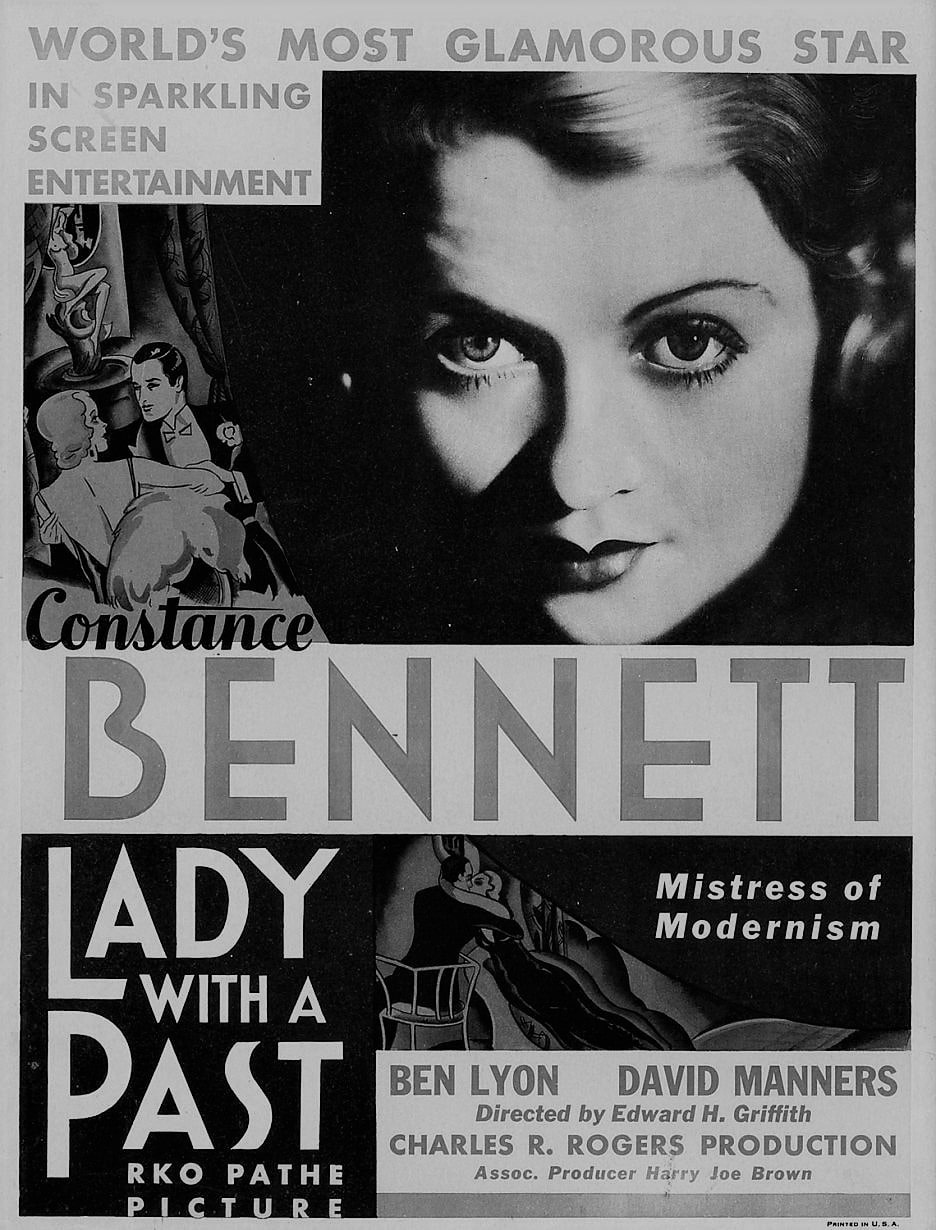 LADY WITH A PAST (1932)
LADY WITH A PAST (1932) (80 Min.) Genre: 1930 COMEDY, Transfer Quality: A
This droll, sophisticated comedy stars Constance Bennett as Venice Muir, a shy young lady with no "past" of any kind — and very little romance in her life. Hoping to overcome her bashfulness during a trip to Europe, she invents a lurid history for herself, then engages the services of paid escort Guy Bryson (Ben Lyon) to accompany her to all the continent's hot spots. Through word of mouth, Venice gains the reputation of being a sexual adventuress (though she's still nothing of the kind), and soon she is headline fodder for all the Parisian newspapers. Her fabricated randy reputation catches the eye of wealthy Donnie Wainright (David Manners), but it is Guy Bryson who ultimately makes an "honest woman" out of her. Lady With a Past was adapted from the equally delightful novel by Harriet Henry.
Starring: Constance Bennett, Ben Lyon, David Manners, Don Alvarado | Directed by: Edward H. Griffith
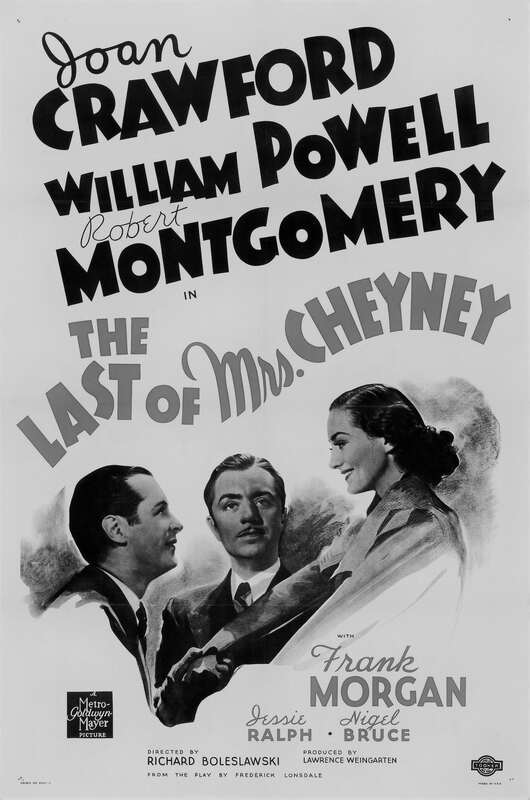 LAST OF MRS. CHEYNEY, THE (1937)
LAST OF MRS. CHEYNEY, THE (1937) (98 Min.) Genre: 1930 COMEDY, Transfer Quality: A
Based on a popular drawing-room drama by Frederick Lonsdale, The Last of Mrs. Cheyney stars Joan Crawford as a jewel thief who poses as an aristocrat. It is Crawford's intention to pilfer a valuable pearl necklace while attending a society party in the company of partner-in-crime William Powell. Here she attracts the attention of Robert Montgomery, a young nobleman who is amused by Crawford's wittiness in the face of the haughty bitchery of Benita Hume. When Montgomery turns out to be a bounder and Powell and Crawford are revealed to be criminals, Crawford does some quick thinking that not only gets her off the hook but puts the two-faced Montgomery in his place as well. Previously filmed in 1929 with Norma Shearer in the lead, The Last of Mrs. Cheyney would itself be remade in 1951 as The Law and the Lady, with Greer Garson as the heroine. — Hal Erickson
Starring: Joan Crawford, William Powell, Robert Montgomery, Frank Morgan | Directed by: Richard Boleslawski, George Fitzmaurice
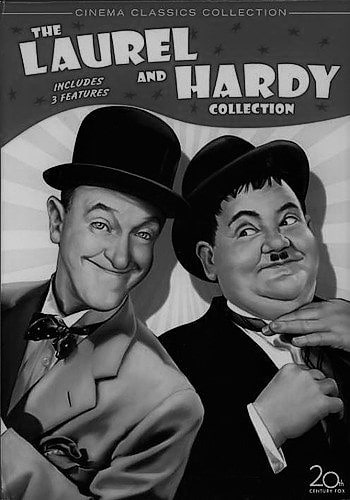 LAUREL & HARDY SHORTS: BEAU HUNKS, GOING BYE-BYE, TOWED IN A HOLE (0)
LAUREL & HARDY SHORTS: BEAU HUNKS, GOING BYE-BYE, TOWED IN A HOLE (0) (0 Min.) Genre: 1930 COMEDY, Transfer Quality: A
BEAU HUNKS: This Laureland Hardy four-reeler is very loosely based on Beau Gest. It opens with Oliver Hardy singing a sweet love song. He's feeling sentimental because he's about to marry his girl, Jeanie-Weanie who, he tells his friend Stan Laurel, "has been all around the world and everyone loves her." Unfortunately, a "Dear John" letter arrives from the girl just then. GOING BYE-BYE: This is an especially violent -- but very funny -- Laurel and Hardy two-reeler. It opens in a courthouse where the vicious Butch Long (Walter Long) is being sentenced for murder. After the judge commends Stan Laurel and Oliver Hardy for providing the evidence necessary for the conviction, he gives Long a life sentence. "Aren't you going to hang him?" Stan asks... TOWED IN A HOLE: This is one of Stan Laurel and Oliver Hardy's most popular two-reelers; it's particularly rich in gags, well-structured, and is a hilarious illustration of the chemistry that brought the duo its fame. It begins with Stan and Ollie as fish salesmen, and doing very well at it too...
Starring: Stan Laurel, Oliver Hardy | Directed by: James W. Horne, Charles Rogers, George Marshall
 LAUREL & HARDY SHORTS: BRATS & TWICE TWO (0)
LAUREL & HARDY SHORTS: BRATS & TWICE TWO (0) (0 Min.) Genre: 1930 COMEDY, Transfer Quality: A
BRATS: Stan Laurel and Oliver Hardy play both the fathers and their unruly children in this two-reel comedy. The really funny thing about this film is that as the kids, Laurel and Hardy don't behave much differently as they generally do as adults. The relationship is basically the same between the two youngsters, and little Ollie usually suffers the most damage. The father/son effect was created by making two sets exactly the same, with one set being more than twice normal size, to make the kid Laurel and Hardy appear child-sized. The two sets are seamlessly combined in several scenes, so we can see, for example, the fathers playing checkers while their sons are a few feet away, playing with alphabet blocks. There's not much plot — the kids misbehave and are sent to bed early, but before they crawl into bed, they create more havoc — and an overflowing bathtub that Ollie doesn't discover until it has flooded the whole bathroom. Because not every theater was yet wired for sound, a silent version of Brats was made, which still exists today, in addition to a colorized version released in the late 1990s. — Janiss Garza TWICE TWO: The whole point of this Laurel and Hardy two-reeler was to dress up the comic duo as women and have them play each other's wives. It's a simple domestic scenario — Oliver Hardy, brain specialist, and Stan Laurel, his "associate advisor," are celebrating their one year wedding anniversary. They are married to each other's sisters and call home to see if the girls want to go out. Mrs. Laurel (played by Hardy) says no, that they want to have dinner in, as they have a surprise for Ollie. As the girls prepare for their husbands' return, the surprise — a cake — winds up on Mrs. Laurel, in a typical Laurel and Hardy SNAFU. Through various edits, doubles and matte shots, all four of them have dinner together, and the girls start bickering at each other. Finally, Ollie grabs his wife, Fannie (played by Laurel), and is about to leave when the replacement cake arrives. Fannie gives it to Mrs. Laurel — right on the head. While this isn't one of the very best Laurel and Hardy shorts — it's basically a one-joke film, with a concept that was done better in 1930's Brats — it does have a fair share of laughs. It's amusing to see Oliver Hardy's mannerisms in feminine form, and Stan Laurel's "sister" is as dither-brained as he is — at one point, Ollie calls her brother stupid, and she retorts, "Don't call him stupid! Why, you've forgotten more than he'll ever know...in his little finger!" The wives' voices were dubbed by actresses Carol Tevis (for Mrs. Hardy) and May Wallace (for Mrs. Laurel). — Janiss Garza
Starring: Stan Laurel, Oliver Hardy | Directed by: James Parrott
 LAUREL & HARDY SHORTS: DIRTY WORK, HOG WILD, BLOTTO (0)
LAUREL & HARDY SHORTS: DIRTY WORK, HOG WILD, BLOTTO (0) (0 Min.) Genre: 1930 COMEDY, Transfer Quality: B
DIRTY WORK: Although this Laurel and Hardy short is quite funny, it's often neglected. The boys, playing chimney sweeps, don't appear right away -- first the stage is set in the laboratory of a mad scientist, Professor Noodle (Lucien Littlefield). He has been working intensely for the past 20 years to create an elixir of youth and he is just moments away from success. At this significant moment, Stan and Ollie arrive to sweep the chimney. The butler, Jessup (Sam Adams), directs them to the fireplace and they go to work while, in another room, Noodle is adding a few drops of this, a half drop of that (he uses a scissors to cut off the last half drop). The professor's work goes far more smoothly than Stan and Ollie's efforts -- in fact, by the time they're done, the room is ankle-deep in debris, and both the boys and the butler are black with soot. Jessup looks at the wreckage and promises that somewhere "an electric chair is waiting." While he is upstairs washing off the grime, the professor proudly appears with his successful elixir and since no one else is around, he decides to show it to the boys. He places a duckling in a big tub of water, adds just a few drops of the potent solution, and the duck reverts to an egg. When Noodle disappears in search of Jessup, Stan and Ollie wonder if there's any validity to what they've just witnessed. They decide to try it out with a fish, but as Ollie stands over the tub holding the full beaker, Stan accidentally knocks him in. The water violently bubbles and churns and finally Ollie emerges -- as a chimp, wearing the inevitable bowler hat. His reply to Stan and the whole situation: "I have nothing to say!" HOG WILD: Oliver Hardy wants to go see his friend Stan Laurel; his wife (Fay Holderness) tells him, in no uncertain terms, that he must put up the radio antenna first. When Stan comes by and gives Ollie his helping hand, the inevitable mayhem ensues. He begins by setting Ollie's pants on fire with the exhaust from his car. A bucket of water meant to douse the smoke coming from Ollie's behind hits him in the face instead. Ollie throws the bucket through a window; Mrs. Hardy whacks him with a frying pan. The boys climb onto the roof to get the antenna set up but just can't seem to keep from falling into the pond, causing a disgusted Mrs. Hardy to command them to stop playing. The boys get around to the wiring and Stan electrocutes Ollie, sending him down the chimney. Ollie gets back on the ladder, which has been set in Stan's car for support, but Stan starts the engine and they end up on a wild ride through town. The ladder ends up on a bus and Ollie falls in its path. He manages to escape getting run over when his tearful wife appears. Ollie tells her reassuringly that he is okay, but she's not crying over him -- she's upset because the radio has been repossessed. They all head back to Stan's car, just in time for it to be crushed by a streetcar. In most Laurel and Hardy films, Ollie's the one who suffers the most damage; this time around he seems to get it even worse than usual! BLOTTO: In this especially amusing Laurel and Hardy short, the boys are planning a night on the town. Standing in their way is Mrs. Laurel (Anita Garvin). Ollie telephones Stan with a scheme: Stan will send himself a bogus telegram, calling him away on "business." Unfortunately for the duo, Mrs. Laurel hears all on the extension and upon learning that they intend to take the bottle she's been saving, comes up with a scheme of her own. She takes the bottle, pours out the liquor and replaces it with every disgusting thing she can find in her kitchen -- spices, hot pepper sauce, etc. Stan and Ollie take this concoction to the Rainbow Club and proceed to have a grand time, impressed by the fire of their brew. They find out the truth -- and suffer instant sobriety -- when Mrs. Laurel shows up to tell them the bottle's actual contents...and brandishes a shotgun.
Starring: Stan Laurel, Oliver Hardy | Directed by: Lloyd French / Tom Walls , James Parrott
 LAUREL & HARDY SHORTS: OLIVER THE EIGHTH, THE STOLEN JOOLS, COUNTY HOSPITAL (0)
LAUREL & HARDY SHORTS: OLIVER THE EIGHTH, THE STOLEN JOOLS, COUNTY HOSPITAL (0) (0 Min.) Genre: 1930 COMEDY, Transfer Quality: B
OLIVER THE EIGHTH: Mae Busch never looked more menacing than she did in this Laurel and Hardy three-reeler. She plays a wealthy widow who was once dumped by an Oliver and has sworn to kill every subsequent Oliver that crosses her path. Stan and Ollie, blissfully ignorant of her scheme, see her advertisement in the personals section of the newspaper while working at their barber shop -- or "tonsorial parlor," as its window proclaims. Both of them decide to answer her ad, but Oliver only mails his own letter. She replies and has Ollie come to her mansion. Stan shows up not long after, having discovered his unmailed letter, and he now demands that he get half the cut -- not realizing how appropriate the term is. He has traded the barber shop away for a "gold" brick...and some nuts. It becomes clear to both Stan and Ollie that something is very wrong -- the butler, Jitters (Jack Barty), plays cards with an invisible deck, and their dinner, too, is invisible. Finally, Jitters confesses the widow's plan to cut Ollie's throat. Since the doors are all locked and the windows barred, it seems like there's nothing for the boys to do but stay up all night. This comedy has a number of similarities to 1930's The Laurel-Hardy Murder Case, and even though it's not one of the duo's best, it still has a number of very funny moments. THE SLOLEN JOOLS: In a Los Angeles police station, it is reported that Norma Shearer's pearls have been stolen. A detective is sent to the actress' home to interrogate party guests, most of whom are famous Hollywood stars. The detective ends up chasing leads all over town, ending up at a movie studio, where he learns the truth behind "the slippery pearls." COUNTY HOSPITAL: Stan Laurel arrives at the hospital to visit his friend Oliver Hardy. It takes him more time to locate Ollie's room than it does for him to destroy it completely. That happens when the doctor (Billy Gilbert at his most fulsome) enters to see how his patient is doing. Ollie, his broken leg elevated, tells him how nice it is to have some peace for once, and that's about when Stan decides to use the counterweight attached to Ollie's leg as a nutcracker. In the blink of an eye, Ollie is smashed up on the ceiling and the doctor is out the window, hanging onto the counterweight for dear life. The rope breaks, Ollie falls and breaks the bed and the doctor just barely escapes being flattened on the sidewalk far below. As a result, Ollie's hospital stay, which was supposed to last two months, has been shortened to just enough time for him to get his clothes and leave. Stan cuts off the leg of Ollie's pants so he can get them on -- the trouble is that the wrong leg was removed; what's more, the pants aren't even Ollie's, but his roommate's. Then Stan accidentally sits on a hypodermic needle that was left in the room. The needle was loaded with sedative, so when Stan gets behind the wheel to take Ollie home, it turns into a wild ride that goes on for a surprisingly long time before the inevitable accident. The first half of County Hospital is classic Laurel and Hardy fare, but the second half is marred by bad back projection. The Roach Studio was having some financial difficulties at the time, which had an affect on the quality of its releases.
Starring: Stan Laurel, Oliver Hardy | Directed by: William McGann, James Parrott
 LAUREL & HARDY SHORTS: OUR WIFE, SCRAM, (0)
LAUREL & HARDY SHORTS: OUR WIFE, SCRAM, (0) (0 Min.) Genre: 1930 COMEDY, Transfer Quality: B
OUR WIFE: Oliver Hardy finds that getting married is more difficult than he had planned in this two-reeler. It starts off with partner and best man Stan Laurel's adventures with a container of fly spray. While Laurel is ruining the wedding breakfast and cake, Hardy's fiancée, Dulcy (Babe London), is having her own problems. Her father (James Finlayson), who disapproves of the marriage, has locked her in her bedroom. The couple arrange to elope, but Laurel gives away the plans. Hardy, on the requisite elopement ladder, winds up flying through a window. Dulcy tosses her suitcase, but it opens up, and her clothes go flying everywhere. Finally, Hardy, Dulcy, and Laurel make it to the Justice of the Peace (Ben Turpin), but in his confusion, he marries Hardy to Laurel. This Laurel and Hardy short features a rare sound performance by Ben Turpin, best known for his work in silent comedies. This is also the only time Babe London appeared with the boys. It's too bad it was only this once; London's heft and talent made her a good comic foil for Oliver Hardy. SCRAM: It's a rainy night and Stan Laurel and Oliver Hardy are faced with a particularly ill-tempered judge Rychard Cramer. He'd love to throw them in the clink for vagrancy, but since the jail is full, he gives them just one hour...to leave town. Out on the street, they encounter a drunk (perennial screen inebriate Arthur Housman) who has lost his car keys. He finds them with Stan and Ollie's help, and out of gratitude invites them to spend the night at his house. Once there, the drunk discovers that he has apparently forgotten his house keys. The three of them manage to get in anyway -- the only problem is that it's the wrong house! The drunk has just poured his bootleg gin into a water pitcher when a butler tells him to leave. This wakes up the lady of the house (Vivian Oakland). She's glad the man is gone -- her husband, who isn't home yet, abhors drunks. Stan and Ollie are still around, however, making themselves comfortable and completely unaware of the mix up. Dressed in the husband's silk pajamas and robes, they encounter the wife in the hallway and she faints dead away. To revive her they give her a glass of "water" from the pitcher containing the bootleg gin. This brings her back to consciousness -- and then some! The boys are having a time keeping her antics under control but finally they just relax. The three of them are laughing it up and having a grand old time when her husband finally comes home. It's the judge and he slowly approaches Laurel and Hardy, the menace on his face a frightening sight. Stan goes for the light switch and the screen goes dark.
Starring: Stan Laurel, Oliver Hardy | Directed by: James W. Horne, Ray McCarey,
 LAUREL & HARDY SHORTS:THEM THAR HILLS & TIT FOR TAT (0)
LAUREL & HARDY SHORTS:THEM THAR HILLS & TIT FOR TAT (0) (0 Min.) Genre: 1930 COMEDY, Transfer Quality: A
THEM THAR HILLS: This Stan Laurel and Oliver Hardy short was so successful that it inspired a sequel -- Tit for Tat -- and it's still one of the comic duo's best films. After Ollie comes down with the gout, a doctor (Billy Gilbert) recommends that he quit his high living and take a vacation in the country. Ollie suggests he and Stan rent a trailer and they're on their way... TIT FOR TAT: Stan and Ollie play proprietors of an electric store, anxious to make friends with neighboring grocer Charlie Hall. Unfortunately they'd already earned the enmity of Hall in a previous two-reeler, Them That Hills (34), and he is in no mood to bury the hatchet...
Starring: Stan Laurel, Oliver Hardy | Directed by: Charles Rogers
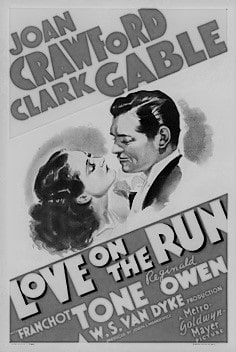 LOVE ON THE RUN (1936)
LOVE ON THE RUN (1936) (80 Min.) Genre: 1930 COMEDY, Transfer Quality: B
Having turned down the opportunity to produce Frank Capra's It Happened One Night (1934), MGM's Louis B. Mayer had second thoughts when the Capra film swept the 1935 Oscars ceremony. Mayer hastily commissioned an It Happened One Night wannabe titled Love on the Run, tailored for the talents of Joan Crawford and Clark Gable (who, of course, had starred in the Capra picture, and had copped one of those Oscars). Gable and Franchot Tone play rival journalists Michael Anthony and Barnabas Pells, who travel the length and breadth of Europe to outscoop one another. Crawford portrays madcap heiress Sally Parker, who is engaged to marry fortune-hunting Prince Igor (Ivan Lebedeff). Whereas in It Happened One Night the heroine (Claudette Colbert) linked up with Gable in order to expedite her elopement with the wrong man, in Love on the Run Crawford seeks out Gable's help to escape her impending marriage with Prince Igor. The two stars combine their flight across Europe with business, dogging the trail of international aviator Baron Spandermann (Reginald Owen), whom Anthony suspects of being a spy. Pells goes along with Anthony and Parker, and soon all three of them are tied up (literally, in Pells' case) with an espionage ring. While it is Clark Gable who ends up with Joan Crawford at fadeout time, it was Franchot Tone who claimed her as his bride in real life.
Starring: Joan Crawford, Clark Gable, Franchot Tone, Reginald Owen | Directed by: W.S. Van Dyke
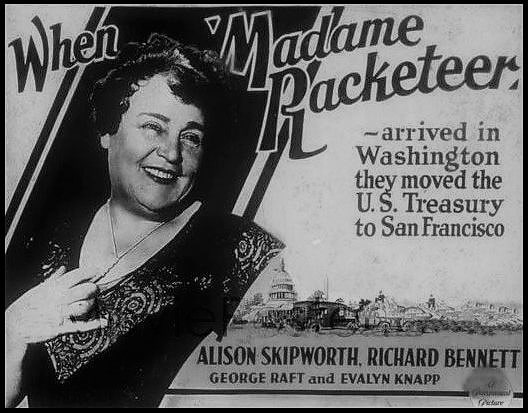 MADAME RACKETEER (1932)
MADAME RACKETEER (1932) (71 Min.) Genre: 1930 COMEDY, Transfer Quality: B
Confidence woman Martha Hicks (Alison Skipworth), better known to those who know her at all as "the Countess," is a career criminal who has just been paroled. She would like to slip away from the authorities and leave the country, but first she wants to look in on the only decent, respectable part of her life, the two daughters whom she left behind with her onetime husband, Elmer Hicks (Richard Bennett), a small-town hotel owner. She arrives to find that Elmer, in his well-meaning but dithering way, has let their younger daughter (Gertrude Messinger) fall in with the wrong crowd, including a two-bit criminal, Jack Houston (George Raft). He has filled her head with stories about what a big man he is and plans to take her to Chicago with him, until Martha intervenes — she manages to turn the interest of veteran lawman John Adams (J. Farrell MacDonald) to her advantage and nearly gets Houston thrown in the slammer. When he proves tougher to get out of the way than she'd thought he'd be, Martha has to choose between freedom or the well-being of her daughter, and gets some unexpected help from Elmer. Skipworth is charming and the rest of the cast is first-rate in this sly, fast-paced, and enjoyable comedy drama.
Starring: Alison Skipworth, Richard Bennett, Evelyn Knapp, George Raft | Directed by: Harry Wagstaff Gribble, Alexander Hall
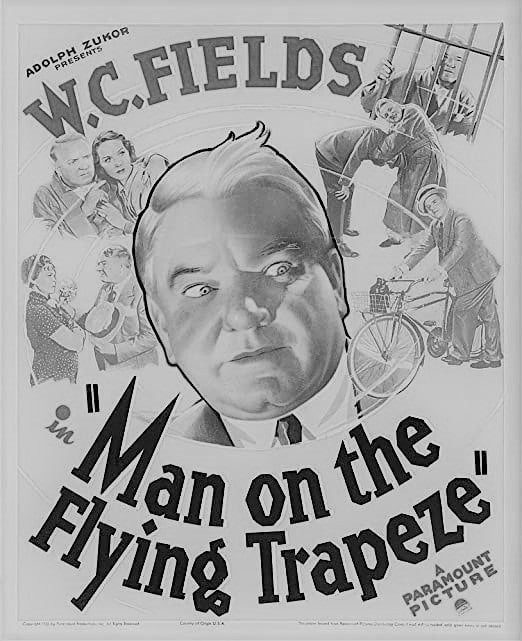 MAN ON THE FLYING TRAPEZE, THE (1935)
MAN ON THE FLYING TRAPEZE, THE (1935) (65 Min.) Genre: 1930 COMEDY, Transfer Quality: B
W.C. Fields plays Ambrose Wolfinger, the henpecked husband to end all henpecked husbands. A widower, Ambrose married a second time only to provide a mother for his pretty daughter (Mary Brian). What he got was an overbearing harpy of a wife (Kathleen Howard), a fussy and imperious mother-in-law (Vera Lewis) and a shiftless brother-in-law (Grady Sutton). Ambrose plans to attend a much-awaited wrestling match, but can't get the day off of work. He lies for the first time in his life, telling his boss that his mother-in-law has died. En route to the wrestling meet, Ambrose suffers one mishap after another, from a string of traffic tickets to an encounter with a runaway tire. He gets to the match just in time to miss the whole thing, and ends up bruised and battered on the sidewalk. Meanwhile, his home is being deluged with flowers, offered in sympathy for his "dead" mother-in-law who is very much alive but not amused. When his boss discovers the deception, he fires Ambrose. The poor man returns home to face the cold stares of his wife's family. They goad and harass him until he can stand no more: when brother-in-law insults his daughter, Ambrose punches him out (a scene that always results in audience cheers) and tells everyone else where to go. Soon after, his anxious ex-boss calls up; only Ambrose can decipher the important messages left behind on his cluttered desk, and would Ambrose like to come back to work? His loyal and loving daughter negotiates a hefty salary hike for Ambrose, and the film ends with Our Hero assuming his proper role as head of the household, with his obnoxious in-laws literally left out in the rain. An uproarious "worm turns" farce, Man on the Flying Trapeze was an expanded version of 1932 Mack Sennett two-reeler, Too Many Highballs, and a partial remake of Fields' own silent feature Running Wild (27).
Starring: W.C. Fields, Mary Brian, Kathleen Howard, Grady Sutton | Directed by: Clyde Bruckman
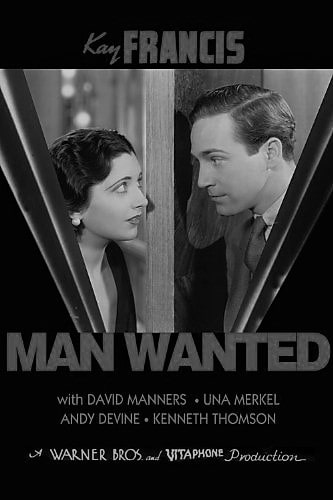 MAN WANTED (1932)
MAN WANTED (1932) (63 Min.) Genre: 1930 COMEDY, Transfer Quality: A
In her first film under contract to Warner Bros., Kay Francis plays Lois Ames, a magazine editor whose husband Fred (Kenneth Thomson) is too busy with his polo friends to pay her much attention. But when her secretary (Charlotte Merriam) suddenly leaves, Lois hires handsome Tom Sheridan (David Manners), who has arrived to demonstrate a new rowing machine. Sharing work brings boss and employee closer together and they soon fall in love. Tom's dumbbell fiancée, Ruth (Una Merkel), does not take this development very well and threatens to tell Fred. But the latter is discovered making love to the uppity Ann Le Maire (Claire Dodd) and Lois is able to obtain a divorce. — Hans J. Wollstein
Starring: Kay Francis, David Manners, Andy Devine, Una Merkel, Claire Dodd | Directed by: William Dieterle
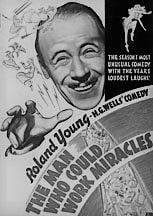 MAN WHO COULD WORK MIRACLES, THE (1936)
MAN WHO COULD WORK MIRACLES, THE (1936) (82 Min.) Genre: 1930 COMEDY, Transfer Quality: A
As a result of a discussion between a trio of gods over the true worthiness of Earth, a retiring British shop assistant is granted miraculous powers in this fantasy based on an H.G. Wells story. Roland Young stars as George McWhirter Fotheringay, whose new powers are virtually limitless; choosing to use them for good, he sets out to create a utopian society. Still, despite a succession of miraculous deeds, George's plans to cure all of the world's ills is met with disbelief. As proof of his power, George wills the earth to stop spinning on its axis, which results in its citizens flying off the planet into space. Because George is indestructible, he is able to shout out his last wish, which restores the world—and George himself—back to normal. — Jason Ankeny
Starring: Roland Young, Joan Gardner, Ralph Richardson, Ernst Thesiger, George Zucco | Directed by: Lothar Mendes
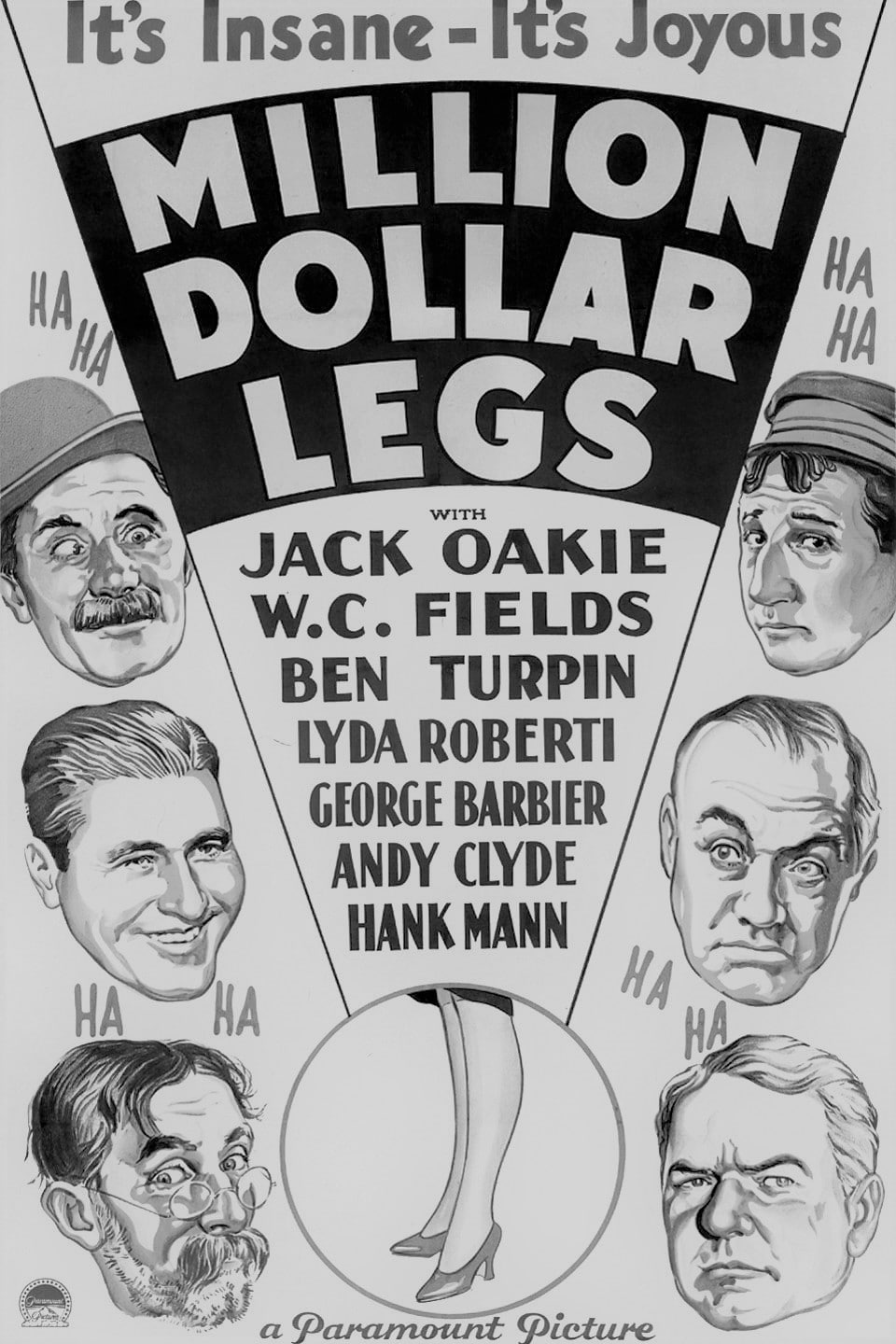 MILLION DOLLAR LEGS (1932)
MILLION DOLLAR LEGS (1932) (64 Min.) Genre: 1930 COMEDY, Transfer Quality: B
Klopstokia: A Far-Away Country. Chief Exports: Goats and Nuts. Chief Imports: Goats and Nuts. Chief Inhabitants: Goats and Nuts. This introductory title ushers in Million Dollar Legs, one of the zaniest comedies ever to emerge from a major studio. W.C. Fields stars as the president of Klopstokia, who will hold on to his office so long as he can best the secretary of the treasury (Hugh Herbert) in their daily arm-wrestling contests. Like most of the Depression-era world, Klopstokia is broke, forcing the government to take drastic measures to raise money. Fortunately, everyone in the country is a super-athlete, inspiring visiting Fuller Brush salesman Migg Tweeney (Jack Oakie) to come up with a brilliant idea: Klopstokia will enter the 1932 Olympics in Los Angeles. Alas, the subversive cabinet members, hoping to overthrow the president, plot to undermine the Klopstokian athletic team with the aid of sexy seductress Mata Machree (Lyda Roberti), "the woman no man can resist." Words can hardly describe the nonstop parade of gags and verbal insanity in Million Dollar Legs: Ben Turpin, playing a cloaked-and-caped spy, pops in and out with neither rhyme nor reason; the conspirators' outdoor hideout is incongruously equipped with hydraulic lifts and elevators; Mata Machree's butler informs the villains that "Madame can only be resisted from 2 to 4,"; and, when asked why all the Klopstokian men are named George and the women named Angela, the president's daughter (Susan Fleming, later the wife of Harpo Marx), replies "Why not?" then launches into the national anthem — a double-talk version of "One Hour With You." Among the writers were Joseph L. Mankiewicz and Henry Myers, who were also responsible for the wacky Wheeler andWoolsey political satire Diplomaniacs.
Starring: W.C. Fields, Jack Oakie, Andy Clyde, Lyda Roberti | Directed by: Edward F. Cline
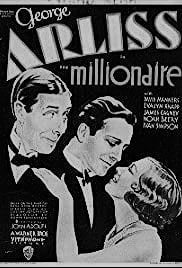 MILLIONAIRE, THE (1931)
MILLIONAIRE, THE (1931) (81 Min.) Genre: 1930 COMEDY, Transfer Quality: A
George Arliss is the millionaire of the title, a retired auto tycoon who's been ordered by his doctor to rest and avoid exercise. Arliss is shaken out of his sedentary existence by an insurance salesman who advises him to pick himself up and enjoy life. The old man heads to California, where he conceals his identity and goes to work for a service station. Given a new lease on life, the millionaire amuses himself by playing matchmaker with his own daughter (Evelyn Knapp) and the go-getting young service station manager (David Manners). Barely distinguishable from George Arliss' other non-historical vehicles, The Millionaire is given an added dimension by James Cagney, who shows up for three wonderful minutes as the friendly insurance agent.
Starring: George Arliss, Evelyn Knapp, David Manners, Florence Arliss | Directed by: John G. Adolphi
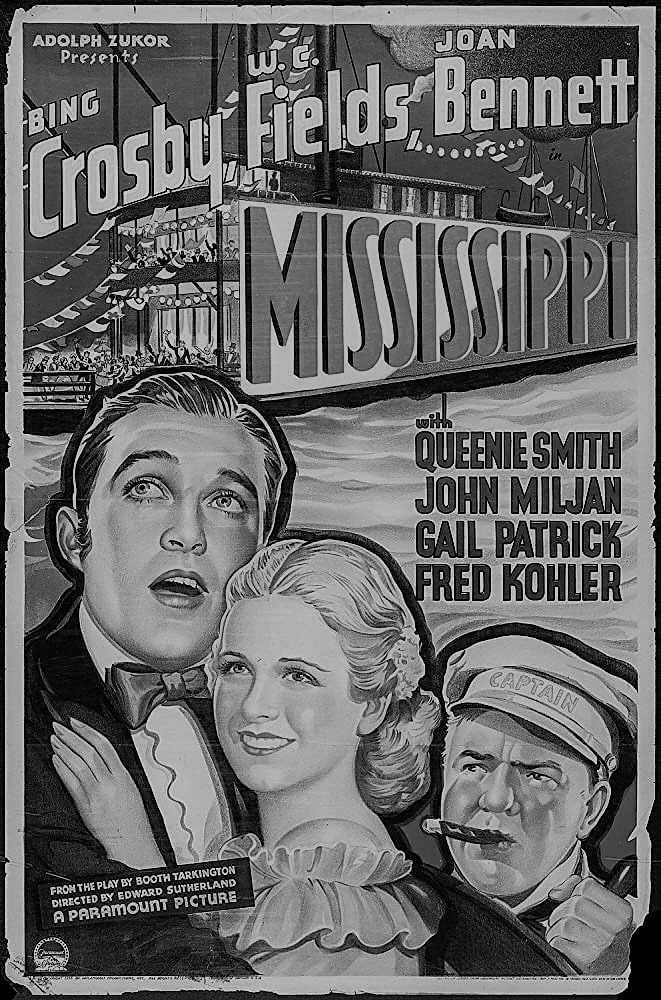 MISSISSIPPI (1935)
MISSISSIPPI (1935) (73 Min.) Genre: 1930 COMEDY, Transfer Quality: B
In this comedy with musical numbers set in the Old South, Bing Crosby plays a singer (talk about a casting stretch!) from Philadelphia named Tom Grayson, who has fallen in love with Southern heiress Elvira Rumford (Gail Patrick). Tom wants to marry Elvira, but a man called Major Patterson (John Miljan) has announced his desire to do the same, and he challenges Tom to a duel to decide who will have Elvira's hand. Tom is not at all agreeable to this idea, which leads Elvira's father (Claude Gillingwater) to proclaim Tom to be a coward and deny him permission to wed his daughter. Elvira's sister Lucy (Joan Bennett), who is infatuated with Tom, thinks that he's merely being sensible, but Tom thinks that Lucy is too young for a serious relationship. In need of work and not especially welcome in the Rumford's community, Tom takes a job performing on a riverboat piloted by the blustery Commodore Orlando Jackson (W.C. Fields). One night, Tom finds himself in a barroom brawl with a man named Captain Blackie (Fred Kohler), who dies accidentally from a shot fired by his own gun. Hoping that his infamy will draw crowds, Jackson begins billing Tom as "The Singing Killer." Tom comes to realize that Lucy may be the right woman for him after all, but Lucy is not interested in a man with blood on his hands, and now Tom must convince her that he's not a killer at all. Noted gambling aficionado Fields has a hilarious poker-playing bit, and he steals most of his scenes from the rest of the cast. Mississippi was loosely based on the play "Magnolia" by Booth Tarkington. — Mark Deming
Starring: Bing Crosby, W.C. Fields, Joan Bennett, Queenie Smith, Ann Sheridan, Gale Patrick | Directed by: Edward Sutherland
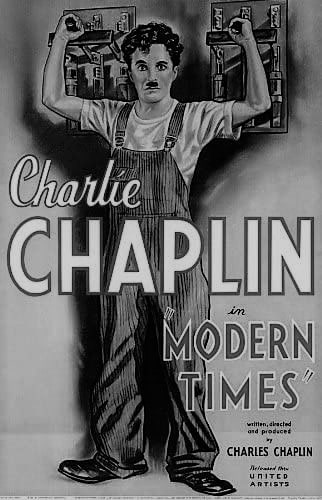 MODERN TIMES (1936)
MODERN TIMES (1936) (89 Min.) Genre: 1930 COMEDY, Transfer Quality: A
This episodic satire of the Machine Age is considered Charles Chaplin's last "silent" film, although Chaplin uses sound, vocal, and musical effects throughout. Chaplin stars as an assembly-line worker driven insane by the monotony of his job. After a long spell in an asylum, he searches for work, only to be mistakenly arrested as a Red agitator. Released after foiling a prison break, Chaplin makes the acquaintance of orphaned gamine (Paulette Goddard) and becomes her friend and protector. He takes on several new jobs for her benefit, but every job ends with a quick dismissal and yet another jail term. During one of his incarcerations, she is hired to dance at a nightclub and arranges for him to be hired there as a singing waiter. He proves an enormous success, but they are both forced to flee their jobs when the orphanage officials show up to claim the girl. Dispirited, she moans, "What's the use of trying?" But the ever-resourceful Chaplin tells her to never say die, and our last image is of Chaplin and The Gamine strolling down a California highway towards new adventures. The plotline of Modern Times is as loosely constructed as any of Chaplin's pre-1915 short subjects, permitting ample space for several of the comedian's most memorable routines: the "automated feeding machine," a nocturnal roller-skating episode, and Chaplin's double-talk song rendition in the nightclub sequence. In addition to producing, directing, writing, and starring in Modern Times, Chaplin also composed its theme song, Smile, which would later be adopted as Jerry Lewis' signature tune. — Hal Erickson
Starring: Charlie Chaplin, Paulette Goddard, Henry Bergman, Chester Conklin, Stanley "Tiny" Sandford | Directed by: Charlie Chaplin
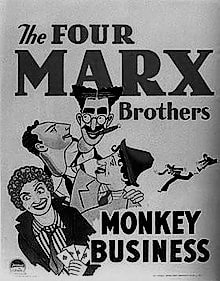 MONKEY BUSINESS (1931)
MONKEY BUSINESS (1931) (77 Min.) Genre: 1930 COMEDY, Transfer Quality: A
The first Marx Brothers film to be written directly for the screen (its authors included S. J. Perelman, Arthur Sheekman and Will B. Johnstone), Monkey Business is also the merry Marxes' first Hollywood production. Groucho, Harpo, Chico and Zeppo are brilliantly cast as four stowaways on an ocean liner, bound for New York. As our heroes endeavor to elude dimwitted First Mate Gibson (Tom Kennedy), each of the brothers gets involved in an adventure of his own. Groucho finds himself in a menage a trois with gangster Alky Briggs (Harry Briggs) and Briggs' sexy wife Lucille (Thelma Todd); Harpo joins a "Punch and Judy" puppet show, driving the ship's crew into a frenzy of confusion; Chico hires himself out as bodyguard to retired bootlegger Joe Helton (Rockliffe Fellowes); and Zeppo romances Joe's pretty daughter Mary (Ruth Hall). Once they've arrived in New York, the Marx boys head to Helton's Long Island mansion, where, after the obligatory harp-and-piano musical interludes, the fearsome foursome team up to rescue Mary from her kidnappers. There are far too many wonderful moments in Monkey Business to detail here, but highlights include Groucho's initial confrontation with Alky Briggs ("With a little study, you'll go a long way, and I wish you'd start now!") and his romantic tete-a-tetes with Lucille ("Come with me, and we'll lodge with my fleas in the hills — er, flee to my lodge in the hills"); Harpo and Chico's attempts to shave a sleeping barbershop customer ("You know what, partner? I think we give-a him one snoop too much"); and the classic setpiece, "borrowed" from the team's early Broadway hit I'll Say She Is, in which all Four Marx Brothers try to slip past the customs officials by posing as Maurice Chevalier! Though not the best of their Paramount features, Monkey Business is still among the funniest Marx Brothers comedies ever made — and one of the funniest comedies, period. — Hal Erickson
Starring: The Marx Brothers, Thelma Todd, Tom Kennedy, Ruth Hall | Directed by: Norman McLeod
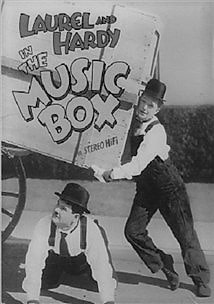 MUSIC BOX, THE (1932)
MUSIC BOX, THE (1932) (30 Min.) Genre: 1930 COMEDY, Transfer Quality: A
This most famous of Laurel and Hardy shorts won an Oscar for "Best Comedy Short Subject." Stan Laurel and Oliver Hardy play characters who run a transfer company. They are hired to deliver a player piano to an address which turns out to be up a very long flight of steps The whole film involves the pair's adventures bringing the piano up the steps, the piano sliding back down, the pair bringing it up again — and then being told by the postman (Charlie Hall) that they could have driven it up a side road. Typically, the boys take the piano back down and bring it up "the right way," by the side road, only to find that the person receiving the piano is a temperamental professor (Billy Gilbert) who had been annoyed by them earlier. He destroys the piano in a fit of pique before discovering that his wife purchased it for him as a gift. The Music Box is classic Laurel and Hardy — almost painfully hilarious. The same daunting concrete stairs (which still exist today in the Silverlake section of Los Angeles) were used previously by the comic duo in their 1927 two-reeler Hats Off. — Janiss Garza
Starring: Stan Laurel, Oliver Hardy, Charlie Hall, Billy Gilbert | Directed by: James Parrott
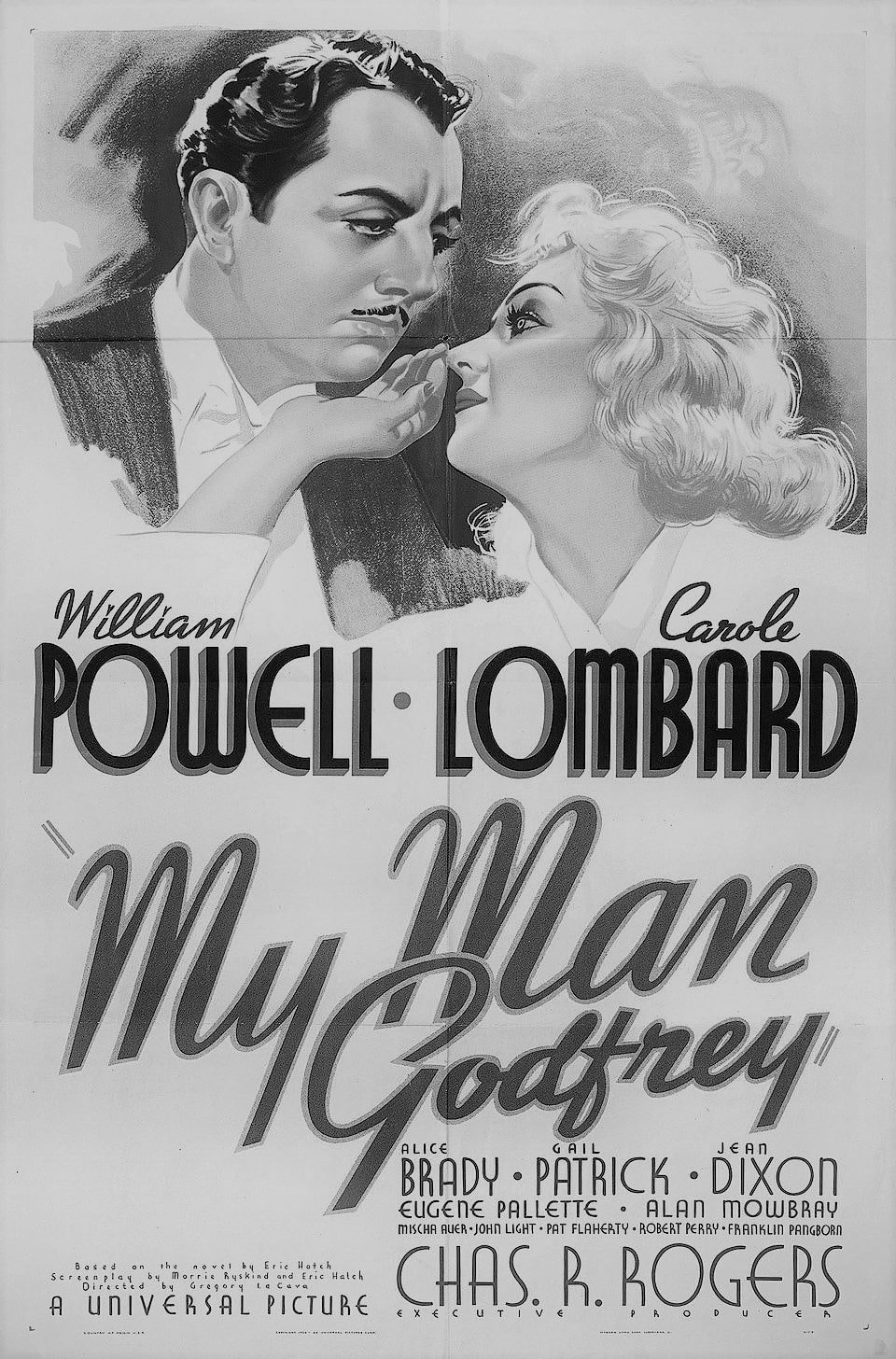 MY MAN GODFREY (1936)
MY MAN GODFREY (1936) (95 Min.) Genre: 1930 COMEDY, Transfer Quality: A
One of the landmark "screwball" comedies of the 1930s, My Man Godfrey offers the radiant Carole Lombard in her definitive performance as flighty young heiress Irene Bullock, who on a society scavenger hunt stumbles on Godfrey (William Powell), an erudite hobo residing in the city dump. Godfrey becomes the family's butler, much to the dismay of Irene's father Alexander (Eugene Pallette), who thinks his household is crazy enough without another apparent lunatic under his roof. Halfway through the film, we discover that Godfrey isn't a penniless bum at all, but the scion of a wealthy Boston family. Having been burned by an unhappy romance, Godfrey dropped out of life, taking up residence in the dump. Here his faith in humanity was restored by his fellow indigents, who managed to survive and remain optimistic despite the worst deprivations. Meanwhile, however, he wants to straighten out the Bullock family, who he feels are a basically decent bunch beneath all their pretensions and eccentricities — and along the way, of course, Irene determines that Godfrey will be her husband. While Godfrey's ultimate "solution" to the exigencies of the Depression seems more of a placebo, My Man Godfrey is all in all a totally satisfying jolt of 1930s-style wish fulfillment. — Hal Erickson
Starring: William Powell, Carole Lombard, Alice Brady, Gail Patrick | Directed by: Gregory La Cava
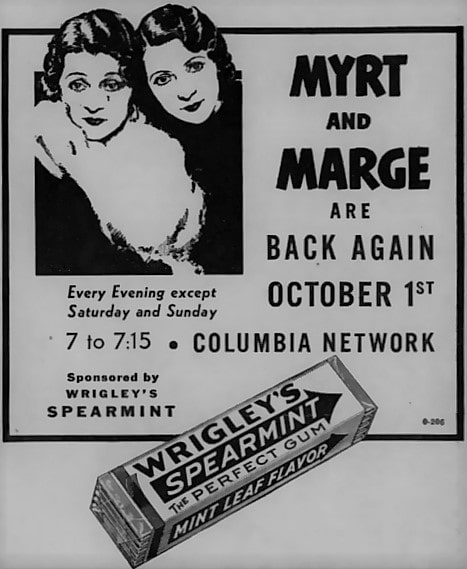 MYRT AND MARGE (1934)
MYRT AND MARGE (1934) (62 Min.) Genre: 1930 COMEDY, Transfer Quality: B
Were it not for the diligence of old-time radio buffs and Three Stooges fans, the 1933 Universal epic Myrt and Marge might have remained in (deserved) obscurity. The film was inspired by The Story of Myrt and Marge, a popular radio serial which ran from 1931 to 1946. Repeating their radio roles, Myrtle Vail and her real-life daughter Donna Damarel star as sisters Myrt Minter and Marge Spear (Spear-Minter, get it?), chorus girls in the long-running Broadway show Hayfield's Pleasures. For plot purposes, Myrt and Marge spend most of the film mired in a third-rate theatrical troupe which only makes it to Broadway in the final reel. The story is maudlin and predictable in the extreme, relieved only by the antics of the Three Stooges — Moe, Larry and Curly — and their vaudeville mentor Eddie Foy Jr.
Starring: Myrtle Vail, Trixie Friganza, Eddie Foy, Jr, John Farrell MacDonald | Directed by: Al Boasberg
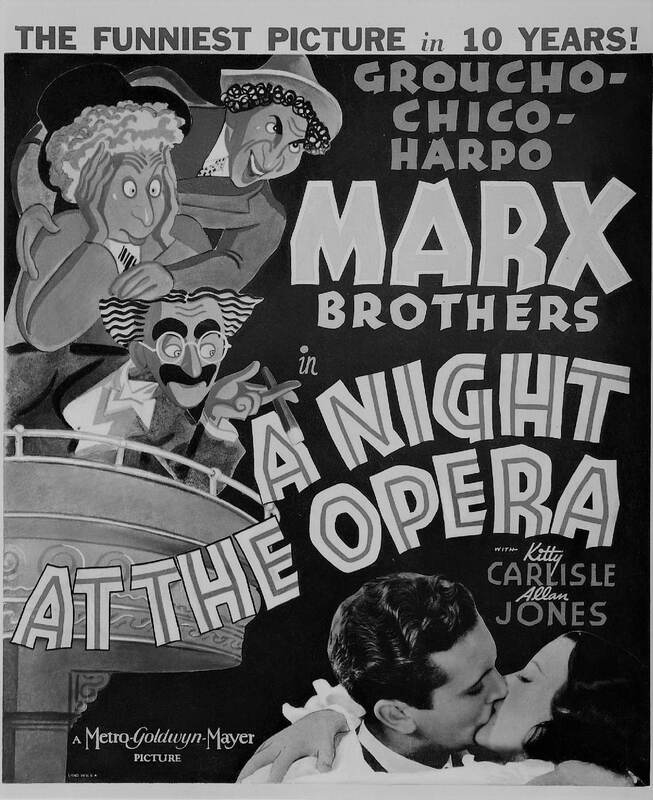 NIGHT AT THE OPERA, A (1935)
NIGHT AT THE OPERA, A (1935) (91 Min.) Genre: 1930 COMEDY, Transfer Quality: A
A Night at the Opera was the first Marx Brothers movie without Zeppo Marx (though his replacement here, Allan Jones, is not a notable improvement) and also the first under the supervision of MGM's legendary producer Irving Thalberg. A relatively sane plot line and conventional romantic subplot place this film in the more conventional camp of Marx Brothers movies. Due to the critical and commercial failure of Duck Soup (1933), the brothers' previous movie, the studio decided to pre-test many of the skits on live audiences; while Duck Soup's anarchic revelry left many in the audience less amused than baffled, A Night at the Opera's script by George S. Kaufman and Morris Ryskind and direction by Sam Wood were more controlled and focused than in previous Marx efforts. But as was often the case in their movies, the brothers' comedy takes aim at the pompous and pious hypocrisy of the upper crust, and this movie features many of their most famous routines, including the stateroom scene, the contract scene, the bed-switching sequence, and the operatic finale. The film's openly subversive and derisive tone was a perfect match for a Depression-era crowd looking for some wealthy authority figures to laugh at. — Dan Jardine
Starring: Marx Brothers, Kitty Carlisle, Walter Woolf King, Edward Keane | Directed by: Sam Wood
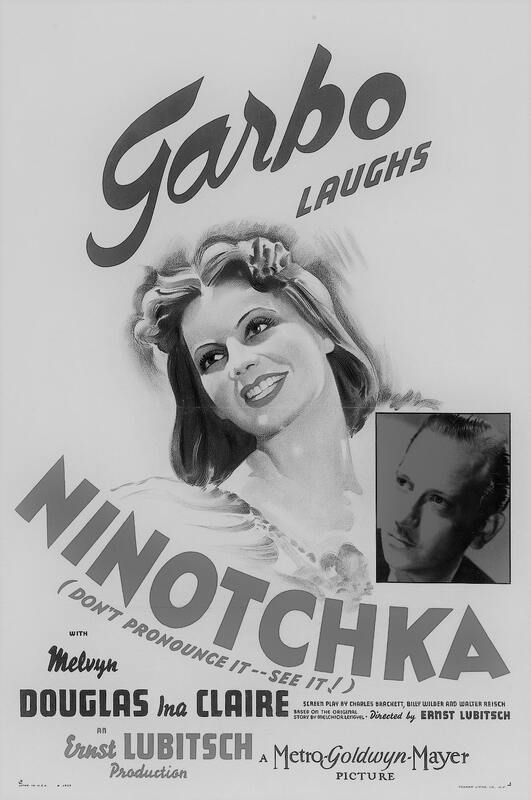 NINOTCHKA (1939)
NINOTCHKA (1939) (111 Min.) Genre: 1930 COMEDY, Transfer Quality: A
Garbo Laughs! declared the ads for Ninotchka. In the face of dwindling foreign revenues, MGM decided to put Greta Garbo, a bigger draw in Europe than the US, in a box-office-savvy comedy, engaging the services of master farceur Ernst Lubitsch to direct. The film opens in Russia during another one of its starvation-condition Five Year Plans. A trio of Russian delegates (Sig Ruman, Felix Bressart, and Alexander Granach) are sent to Paris to sell the Imperial Jewels for ready cash. Grand Duchess Swana (Ina Claire), who once owned the jewels, sends her boyfriend Count Leon (Melvyn Douglas) to retrieve the diamonds, and he turns the trio into full-fledged capitalists, wining and dining them all through Paris. Moscow then dispatches the humorless, doggedly loyal Comrade Ninotchka (Garbo) to retrieve both the prodigal Soviets and the gems. When Leon turns his charm on Ninotchka, she regards him coldly, informing him that love is merely a "chemical reaction." Even his kisses fail to weaken her resolve. Leon finally wins her over by taking an accidental fall in a fancy restaurant, whereupon Ninotchka laughs for the first time in her life. She goes on a shopping spree and gets drunk, while Leon begins falling in love with her in earnest. As a bonus to the frothy script, by Billy Wilder and others, and its surefire star power, Ninotchka features what is perhaps Bela Lugosi's most likeable and relaxed performance. — Hal Erickson
Starring: Greta Garbo, Melvyn Douglas, Bela Lugosi, Sig Rumann | Directed by: Ernst Lubitsch
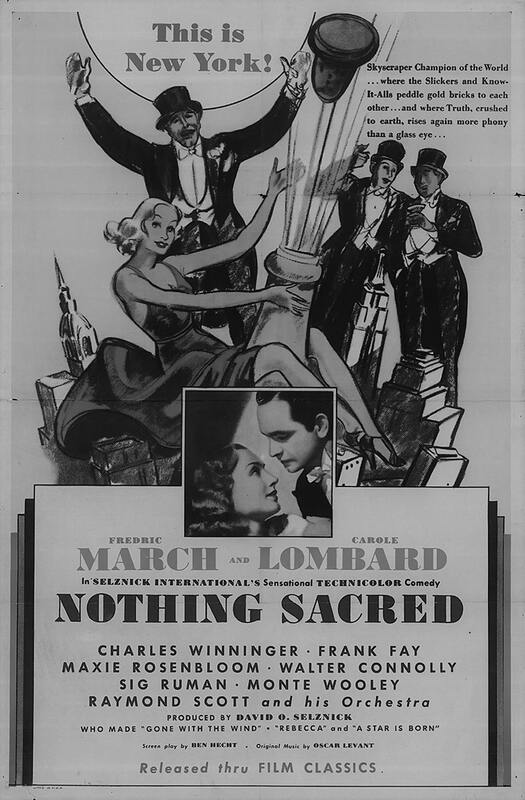 NOTHING SACRED (1937)
NOTHING SACRED (1937) (75 Min.) Genre: 1930 COMEDY, Transfer Quality: A
This is New York, Skyscraper Champion of the World...Where the Slickers and Know-It-Alls peddle gold bricks to each other...And where Truth, crushed to earth, rises again more phony than a glass eye... With this jaundiced opening title, scripter Ben Hecht introduces his classic comedy Nothing Sacred. Fredric March plays Wally Cook, a hotshot reporter condemned to writing obituaries because of his unwitting complicity in a fraud. Anxious to get back in the good graces of his editor Oliver Stone (Walter Connolly), Cook pounces on the story of New England girl Hazel Flagg (Carole Lombard), who is reportedly dying from radiation poisoning. Actually, Hazel isn't dying at all; she's been misdiagnosed by Moscow's eternally drunk doctor (Charles Winninger). But when Cook offers to take her on an all-expenses-paid trip to New York in exchange for her exclusive story, it's too good an offer to pass up. Once in the Big Apple, Hazel is feted as a heroine by the novelty-seeking populac; she enjoys the adulation at first, but soon (and with the help of gallons of alcoholic beverages) suffers the pangs of conscience. She confesses her deception to Cook, who by now has fallen in love with her. Cook and Stone conspire to keep the public from discovering the truth, eventually dreaming up a phony suicide. Travelling incognito to avoid arrest, Wally and Hazel marry and go on a honeymoon, secure in the knowledge that New York City has forgotten all about her and moved on to their next fad. Brimming with witty, acerbic dialogue and hilarious bits of physical business, Nothing Sacred is among the best "screwball" comedies of the 1930s. The musical score by Oscar Levant both mocks and celebrates the George Gershwinesque musical style then in vogue. As an added bonus, the film is lensed in Technicolor (avoid those two-color reissue prints), allowing modern viewers to see what New York City looked liked back in 1937. Nothing Sacred was later adapted into a Broadway musical, Hazel Flagg, which in turn was filmed by Dean Martin and Jerry Lewis as Living It Up (1954), with Lewis in the Carole Lombard role. — Hal Erickson
Starring: Carole Lombard, Fredric March, Charles Winninger, Walter Connolly | Directed by: William Wellman
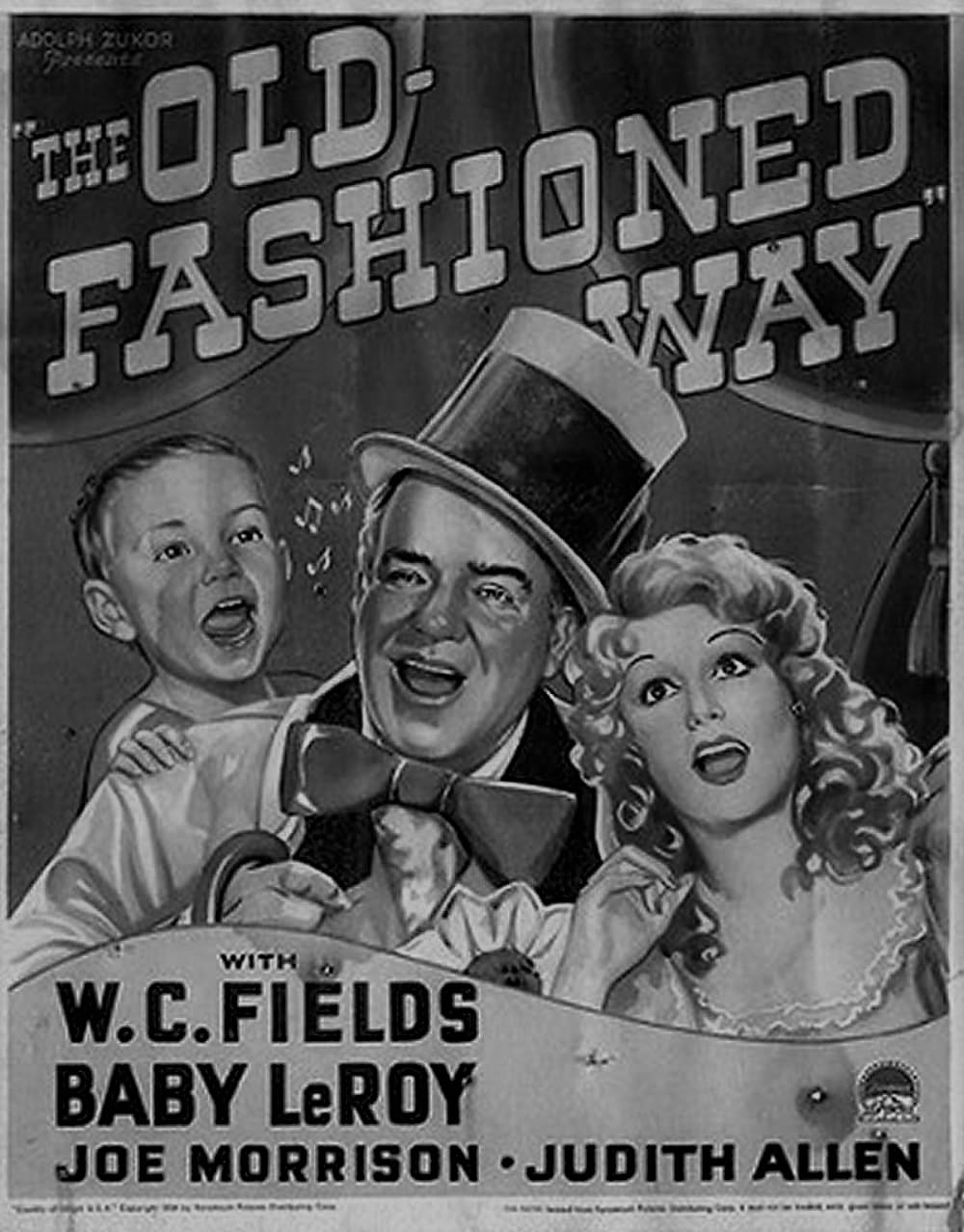 OLD FASHIONED WAY, THE (1934)
OLD FASHIONED WAY, THE (1934) (74 Min.) Genre: 1930 COMEDY, Transfer Quality: A
W.C. Fields plays the Great McGonigle, the manipulative manager of a large 19th century theatrical troupe. Notorious for skipping board bills and forgetting the pay his actors, McGonigle descends on a small town, where he relies on the hospitality of a wealthy widow (Jan Duggan). He secures lodging for his cast and financing for his production by promising the widow a major part in his upcoming production of The Drunkard. The play goes on as schedule, but the widow's part is cut down to one line which she's never permitted to deliver. McGonigle escapes with his hide again, but not before securing the future happiness of his daughter (Judith Allen) so that she won't have to spend the rest of her life one step ahead of the sheriff. The storyline of The Old-Fashioned Way is conveniently shunted aside as W.C. Fields does battle with Baby LeRoy, cons everyone in sight with equanimity, and offers the audience an uninterrupted display of his remarkable juggling skills. — Hal Erickson
Starring: W.C. Fields, Joe Morrison, Judith Allen, Jan Duggan | Directed by: William Beaudine
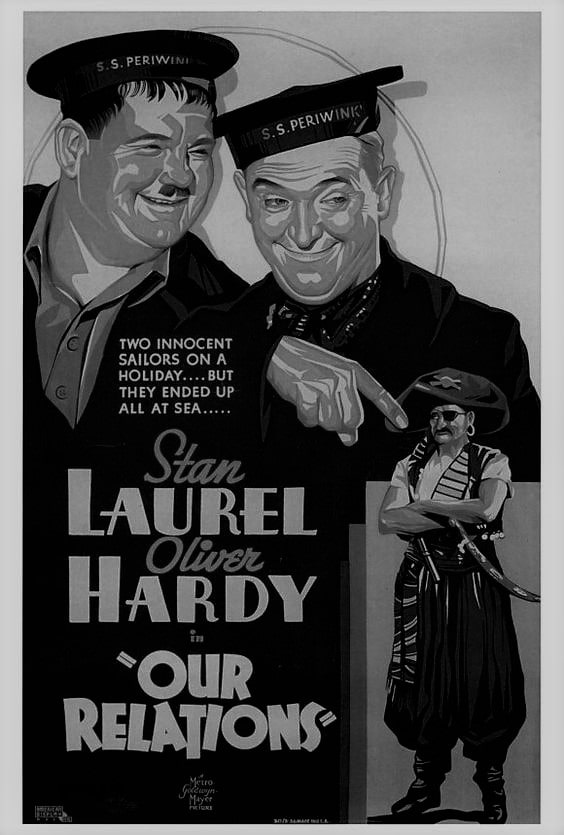 OUR RELATIONS (1936)
OUR RELATIONS (1936) (69 Min.) Genre: 1930 COMEDY, Transfer Quality: A
Working on the theory that the only thing funnier than Laurel and Hardy is two sets of Laurel and Hardys, Our Relations milks its central mistaken-identity situation for all it's worth. Stan Laurel and Oliver Hardy are two solid citizens, happily married and highly respected in their community. One morning, Hardy receives a letter from his mother, containing an old photo of himself and Laurel with their twin brothers, Alf Laurel and Bert Hardy. Mamma also reveals that Alf and Bert turned out to be "bad lads" and ran off to sea, and that reportedly they'd been hanged for taking part in a mutiny. "Isn't that calamitous!" remarks Hardy, who conspires with Laurel to hide the facts about their no-good brothers from their wives. Meanwhile, in another part of town, the S.S. Periwinkle pulls into port. Among the crew members are the selfsame Alf and Bert, who have decided to entrust their pal Fin (James Finlayson) with their month's salary. Fin has promised to invest the dough so that the boys will become millionaires "before you can say Jack Robinson". Alf and Bert are then summoned to the cabin of their captain (Sidney Toler), who orders them to pick up a valuable package for him, then meet him later at Denker's Beer Garden. While waiting for the captain at Denker's, Alf and Bert are captivated by a pair of waterfront floozies, Alice (Iris Adrian) and Lily (Lona Andre). Talked into buying the girls a huge meal for which they haven't the necessary funds, Alf and Bert decide to go back to Fin and reclaim their money, leaving the contents of the captain's package-a valuable pearl ring-with tough waiter Joe Groagan (Alan Hale) as security. Later, Laurel and Hardy take their wives Betty (Betty Healy) and Daphne (Daphne Pollard) to lunch-and, inevitably, they end up at Denker's Beer Garden, where the equally inevitable mix-ups begin to occur. Things snowball from bad to worse before both sets of twins, an angry captain, a disgruntled Fin, the wives, the floozies, a genial drunk (Arthur Housman) and a brace of smooth gangsters (Ralf Harolde and Noel Madison) all converge at the upscale Pirate Club. Several slapstick complications later, Laurel and Hardy are captured by the gangsters, who threaten to dump the boys in the river with their feet encased in cement if they don't cough up the pearl ring. Alf and Bert come to the rescue, and all is well, at least until the film's boffo punchline. Based on W.W. Jacobs' short story The Money Box, Our Relations is perhaps the most plot-heavy of Laurel and Hardy's features for Hal Roach Studios. It is also one of their funniest, as well as their most lavishly produced. The film was officially listed as "A Stan Laurel Production"-as if Laurel hadn't been the prime creative force behind all of the team's previous films. — Hal Erickson
Starring: Stan Laurel, Oliver Hardy, Betty Healy, Sidney Toler | Directed by: Harry Lachman
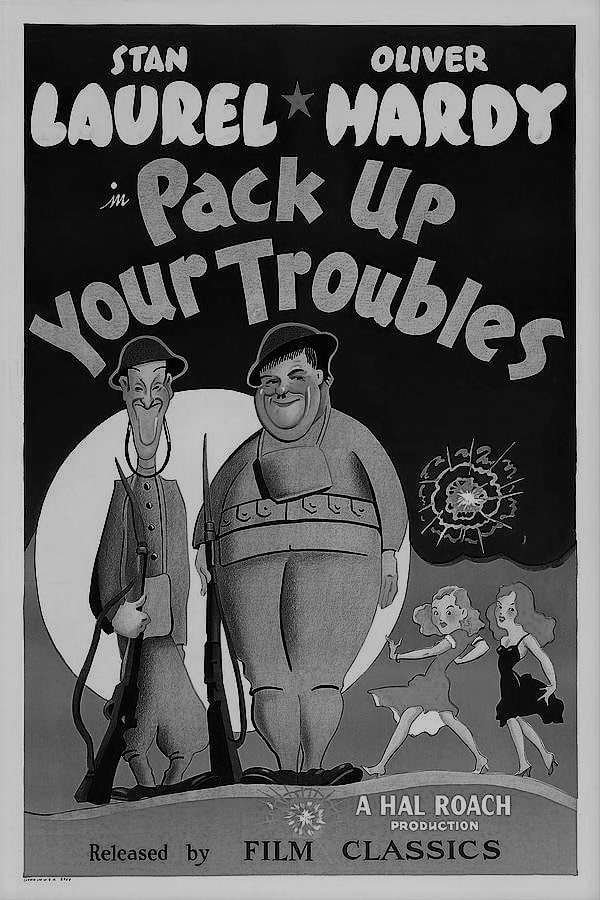 PACK UP YOUR TROUBLES (1932)
PACK UP YOUR TROUBLES (1932) (68 Min.) Genre: 1930 COMEDY, Transfer Quality: A
Drafted into the army during World War I, those muddled misfits Stan Laurel and Oliver Hardy make a shambles of Training Camp before being shipped to France. When their best pal Eddie (Donald Dillaway) is killed in battle, Stan and Ollie vow to locate the grandparents of Eddie's orphaned little daughter (Jacquie Lyn). Unfortunately, the grandparents are named Smith—and they live in New York City. With only a city directory and phone book as their guide, Stan and Ollie undergo several chucklesome misadventures as they scour the canyons of Manhattan to find Mr. and Mrs. Smith. With the orphanage officials hot on their heels, the boys take drastic action to raise enough money to get out of town with the little girl. All turns out well when Eddie's grandfather makes an appearance under the least likely circumstances. But before Laurel & Hardy can enjoy their own happy ending, they cross the path of an old enemy from their army days: a knife-wielding chef with blood in his eye. The second of Laurel & Hardy's feature-length films, Pack Up Your Troubles is, so far as we're concerned (and here we part company with most Laurel & Hardy buffs), infinitely more amusing than their first feature effort, 1931's Pardon Us. Best bit: An overtired Laurel, attempting to tell a bedtime story to the little girl, ends up snoozing away as the kid finishes the story. The powerhouse supporting cast includes such Laurel & Hardy regulars as James Finlayson, Billy Gilbert, Rychard Cramer, Charles Middleton and Charlie Hall. George Marshall, the film's director, proves a mirthsome menace in the small role of the vengeful chef. For years available only in its 62-minute reissue form, Pack Up Your Troubles was restored to its full 68-minute glory in the mid-1980s. — Hal Erickson
Starring: Stan Laurel, Oliver Hardy, Donald Dillaway, Jacquie Lyn | Directed by: George Marshall, Ray McCarey
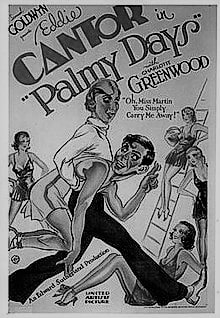 PALMY DAYS (1931)
PALMY DAYS (1931) (77 Min.) Genre: 1930 COMEDY, Transfer Quality: B
Palmy Days is an engagingly loopy Eddie Cantor vehicle. It's certainly entertaining, although many of the jokes will cause a wince and the plot is just so much hooey -- complicated hooey, too. There are enough "high concept" ideas here -- Cantor as an efficiency expert, a gang of thieves masquerading as fortune telling mystics, a romantic misunderstanding, a bakery manned by vivacious young women, etc. -- for two or three films. That Palmy doesn't really take full advantage of any of them works to its detriment, but it's still such a good natured film that most viewers won't really mind. Watching Cantor sawing off edges of his desk (ostensibly so that people won't be able to sit or lean on his desk and waste his time) or breaking into song whenever he's nervous makes up for the many problems with the screenplay. As usual, Cantor can't resist donning blackface for one of his songs. While it tends to jolt and jar modern viewers, at least when Cantor is in blackface in Palmy he's still being Cantor (as opposed to suddenly adopting a stereotypical "black" personality). Palmy also benefits from the presence of Charlotte Greenwood, a gifted Amazon of a comedienne whose gifts were rarely well utilized onscreen. Acting like something of a cross between Marjorie Main and Helen Broderick, but much warmer, Greenwood is a great foil for Cantor (and even gets to nonchalantly throw in a couple of her trademark high kicks). And choreographer Busby Berkeley demonstrates that, even this early in his career, he could create some dazzling images. Palmy is terribly slight, but there's a good deal to enjoy.
Starring: Eddie Cantor, Charlotte Greenwood, Spencer Charters, George Raft | Directed by: Edward Sutherland
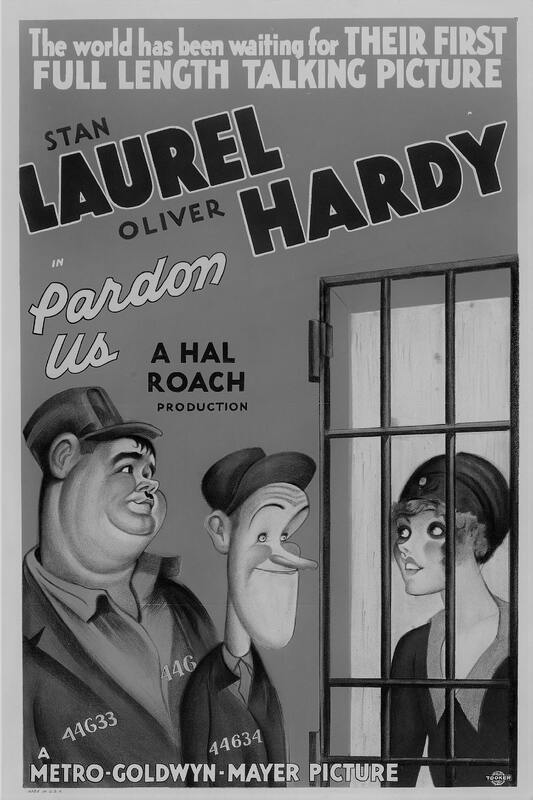 PARDON US (1931)
PARDON US (1931) (68 Min.) Genre: 1930 COMEDY, Transfer Quality: A
Two-reel comedy favorites Stan Laurel and Oliver Hardy made their feature-film debut (excluding their guest appearances in Hollywood Revue of 1929 and Rogue Song) in the prison comedy Pardon Us. A spoof of MGM's The Big House, the story begins when erstwhile bootleggers Laurel and Hardy sell a bottle of beer to a Prohibition agent. Shipped off to the pen, our heroes are escorted to the cell occupied by "The Tiger" (Walter Long), the toughest con in the joint. The Tiger immediately becomes the boys' best friend when he mistakes Laurel's loose-tooth "buzz" as an act of defiance! Swept up in one of The Tiger's escape attempts, Laurel and Hardy disguise themselves in blackface and lose themselves among the cotton-pickers in the Deep South, but Stan's buzzing tooth gives the game away when the warden's (Wilfred Lucas) car breaks down near the cotton fields. Carted back to jail, Stan and Ollie become heroes when they inadvertently foul up The Tiger's next prison break. Pardon Us was previewed in late 1930 in a 70-minute version titled The Rap, which included several sequences (including an elaborate prison fire) which never made it to the final, 56-minute release version. More recently, the film has been reissued to TV in the 65-minute print prepared for Great Britain; the "new" footage includes a handful of previously discarded gag punchlines and several outtakes. In its 56-minute state, Pardon Us is not bad for a first feature-length attempt, even though the best Laurel & Hardy features were still to come. Highlights include an "Our Gang"-style schoolroom routine with perennial Laurel & Hardy foil James Finlayson as the teacher (incidentally, June Marlowe, who played Miss Crabtree in the real Our Gang comedies, shows up as the warden's daughter), a pleasant song-and-dance number in blackface, and a hilarious dentist-office routine "borrowed" from the team's 1928 silent comedy Leave 'Em Laughing. Pardon Us was simultaneously filmed in several foreign languages — one of which, the Spanish-language De Bote en Bote, has popped up from time to time on American cable television. — Hal Erickson
Starring: Stan Laurel, Oliver Hardy, Walter Long, Wilfred Lucas | Directed by: James Parrott
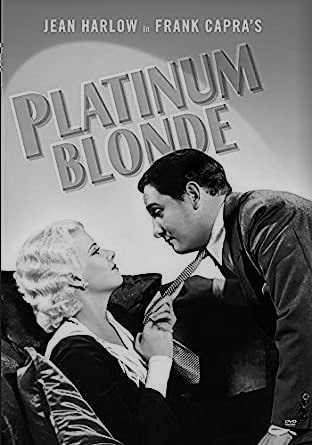 PLATINUM BLONDE (1931)
PLATINUM BLONDE (1931) (86 Min.) Genre: 1930 COMEDY, Transfer Quality: A
A rather bleak comedy-drama from Frank Capra, Platinum Blonde basically starts where Capra's later and much more buoyant It Happened One Night (1934) ends: the marriage between a brash newspaperman and a society dame. But where the latter comedy was enhanced by the director's patented optimism, Platinum Blonde, produced at the height of the Great Depression, expresses no faith in a common ground between the classes. Star reporter Stew Smith (Robert Williams) falls in love with the sister (Jean Harlow) of his latest victim (Donald Dillaway). They marry despite the misgivings of Ann Schuyler's blue-nosed mother (Louise Closser Hale) and Stew's cynical colleagues ("Ann Schuyler's in the blue book. You're not even in the phone book!"). Unable to stand life in a gilded cage for long, Stew upsets the Schuyler mansion by inviting his friends to a wild and woolly party. Returning home unexpected in the middle of the drunken revelry, Ann lays down the law and Stew bolts -- right into the arms of girl reporter Gallagher (Loretta Young), whom he has loved all along without realizing it. Jean Harlow is surprisingly realistic as the callous society girl but Robert Williams' wisecracking reporter comes across as rather grating. An up-and-coming comic lead, Williams died after an operation for appendicitis on November 3, 1931, less than a month after Platinum Blonde had premiered to mostly positive reviews. Ironically, Loretta Young, who received top billing, had demanded to star in this film when it was still known as "Gallagher," the name of her character. Harlow, needless to stay, stole the limelight completely and Capra changed the title much to Young's chagrin.
Starring: Jean Harlow, Loretta Young, Robert Williams, Louise Closser Hale | Directed by: Frank Capra
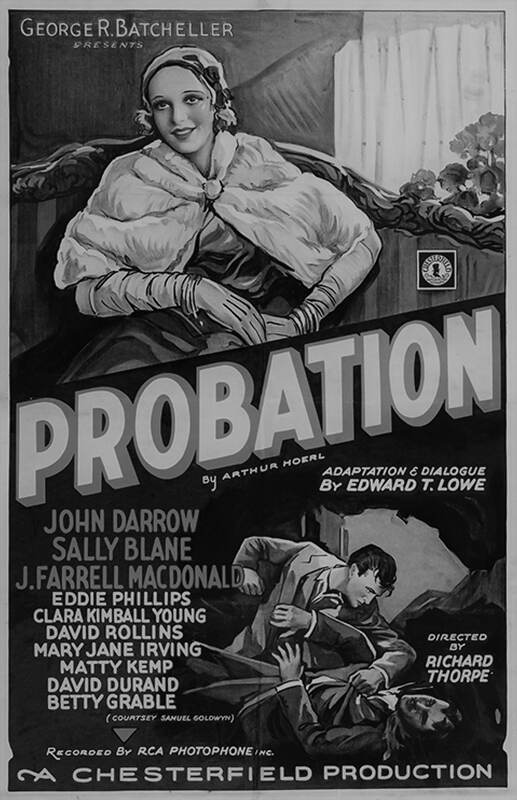 PROBATION (1932)
PROBATION (1932) (60 Min.) Genre: 1930 COMEDY, Transfer Quality: B
Sally Blane (Loretta Young's look-alike sister) plays Janet, a Manhattan socialite who is fed up with the superficiality of her friends. Sensing that Janet is bored with life in general, her Uncle George (J. Farrell McDonald), who happens to be a judge, decides to show the girl how well off she really is. He invites her to sit in on a session of Night Court, so that she may see how many unfortunates there are in the world. One of the defendants brought up before Uncle George is handsome young Nick (John Darrow), arrested for pummeling a man who'd propositioned Nick's sister (played by a 16-year-old Betty Grable). Paroled in Janet's custody, Nick is hired as the girl's chauffeur — and guess where all this is leading. Minus the romantic angle, Probation was partially remade as the East Side Kids comedy Mr. Muggs Steps Out.
Starring: Sally Blane, John Darrow, Clara Kimball Young, Edward Phillips | Directed by: Richard Thorpe
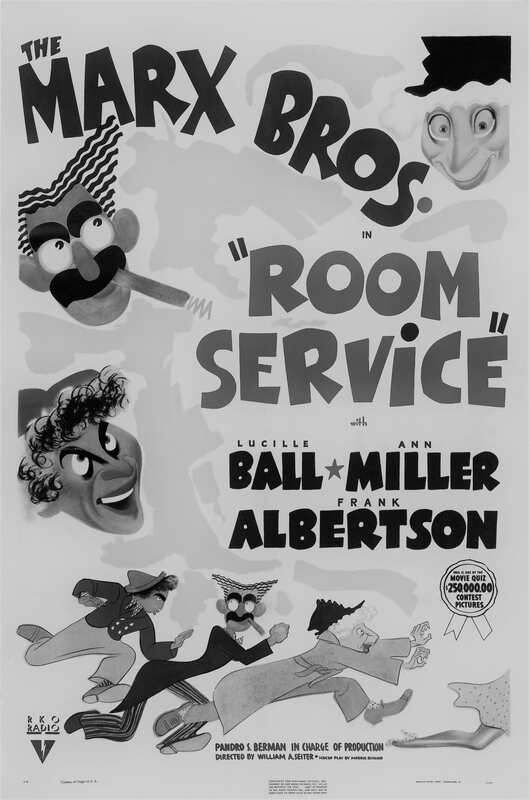 ROOM SERVICE (1938)
ROOM SERVICE (1938) (79 Min.) Genre: 1930 COMEDY, Transfer Quality: A
A notch below the most boisterous Marx Brothers fare, such as Duck Soup and Monkey Business, Room Service capped a decade of sensational success for the masters of mayhem. Unlike some of their earlier films, which were based on their own vaudeville shows, Room Service was adapted from a Broadway play by Allen Boretz and John Murray that was not written for the Marxes. The script is a bit too constraining for Groucho, Harpo, and Chico (Zeppo does not appear), requiring them to play real characters rather than cartoonish self-inventions. Groucho is a producer holed up in a hotel room trying to scrounge up money to put on a show. A young comedienne named Lucille Ball appears in the lead female role, only her second starring role in almost a decade in film, but she doesn't make much of an impact. Still, for fans of the Marx Brothers, the movie is indispensible. It was remade five years later as a musical, Step Lively. — Michael Betzold
Starring: Groucho Marx, Chico Marx, Harpo Marx, Lucille Ball, Ann Miller | Directed by: William Seiter
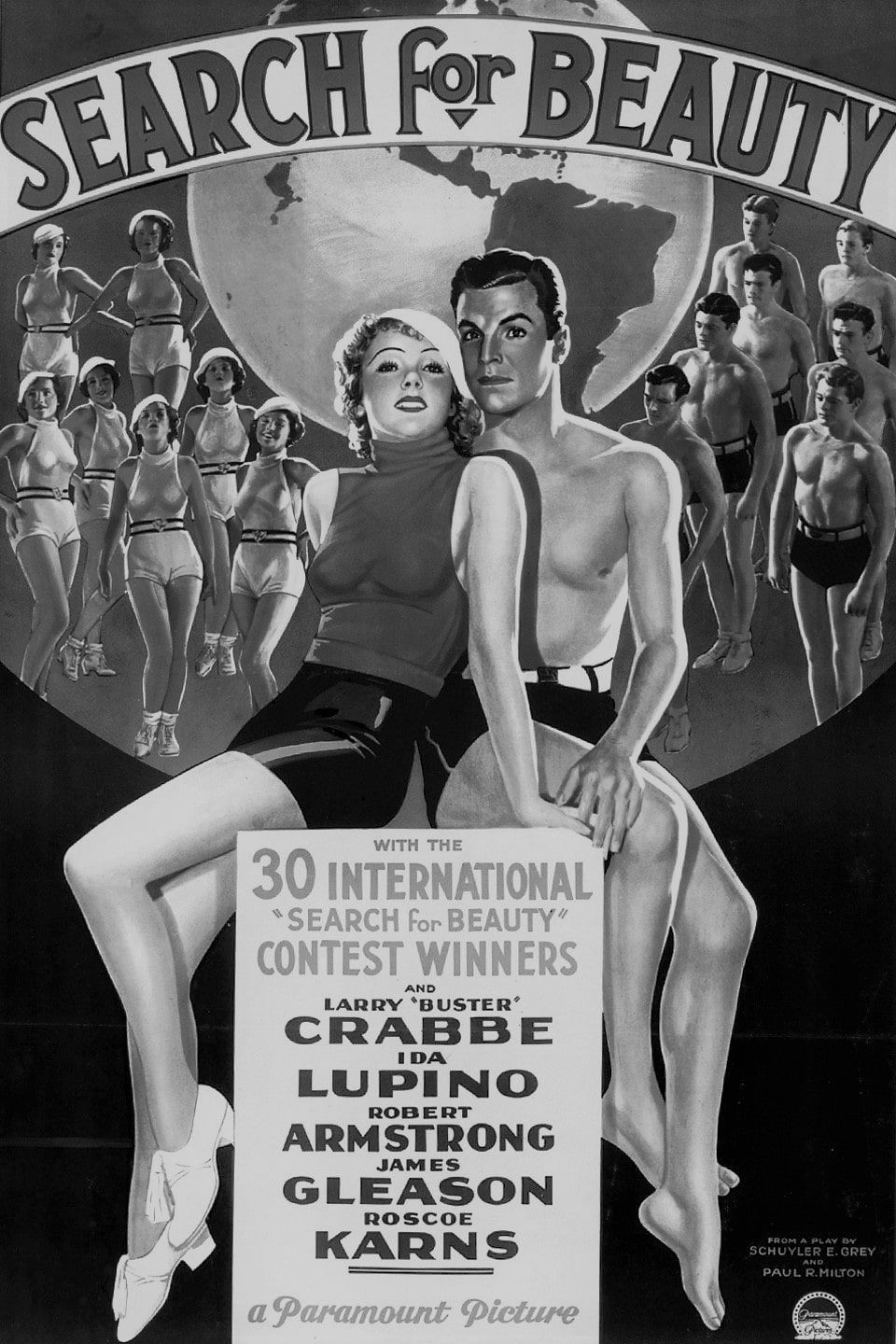 SEARCH FOR BEAUTY (1934)
SEARCH FOR BEAUTY (1934) (78 Min.) Genre: 1930 COMEDY, Transfer Quality: B
Back in the 1930s, the "Search for Beauty" contests were designed to scout the hinterlands of America and England for beautiful girls and handsome men who might qualify as movie contractees — though most the winners were drawn from the ranks of Hollywood residents. These contests, coupled with a play by Schuyler E. Gray and Paul R. Milton, formed the basis for this 1934 comedy. Real-life "Search for Beauty" winners Larry "Buster" Crabbe and Ida Lupino (both of whom had already appeared in a few films) head the cast in this story of a contest staged by a two-bit "physical culture" magazine. When the winners, Don Jackson (Crabbe) and Barbara Hilton (Lupino), realize that they've been hired exclusively to pose in bathing suits for the pin-up trade, they leave for the greener pastures of a legitimate health farm. The magazine's crooked publishers try to extort money from Don and Barbara, but they're foiled by a local justice of the peace (Frank McGlynn Sr.) who turns out to be an agent of the U.S. Department of Justice!
Starring: Larry "Buster" Crabbe, Ida Lupino, Toby Wing, James Gleason, Ann Sheridan | Directed by: Erle C. Kenton
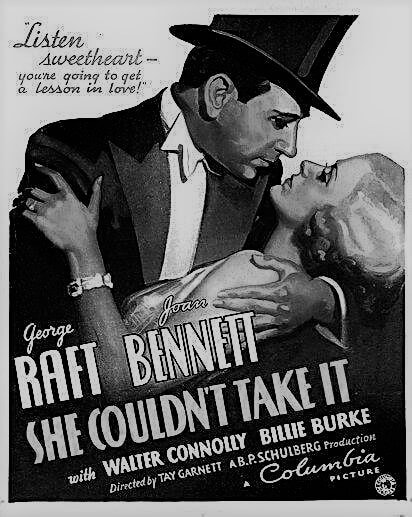 SHE COULDN'T TAKE IT (1935)
SHE COULDN'T TAKE IT (1935) (89 Min.) Genre: 1930 COMEDY, Transfer Quality: B
When he's shipped off to prison on a tax-evasion charge, millionaire Van Dyke (Walter Connolly) breathes a sigh of relief: at least he'll be free of his dizzy, spendthrift wife (Billie Burke) and spoiled-rotten daughter Carol (Joan Bennett). Once behind bars, Van Dyke strikes up a friendship with amiable reformed bootlegger Ricardi (George Raft). Since Ricardi is to be sprung first, Van Dyke suggests that the ex-crook take on the task of "taming" the incorrigible Carol. Unwilling to be stifled by a former jailbird (even a good-looking one), Carol decides to get even by persuading one of Ricardi's former cohorts, a shady character named Tex (Lloyd Nolan) to stage a fake kidnapping. Trouble is, Tex kidnaps the girl for real, obliging Ricardi to race to her rescue -- but only after deliberately breaking every traffic law known to man, so that he'll be pursued by a veritable battalion of motorcycle cops (this hilarious finale was later re-used in the 1941 Buster Keaton two-reeler So You Won't Squawk). A heady blend of screwball comedy and crime melodrama, She Couldn't Take It is one of the fastest and funniest films of 1935.
Starring: George Raft, Joan Bennett, Wallace Ford, Walter Connolly, Billie Burke | Directed by: Tay Garnett
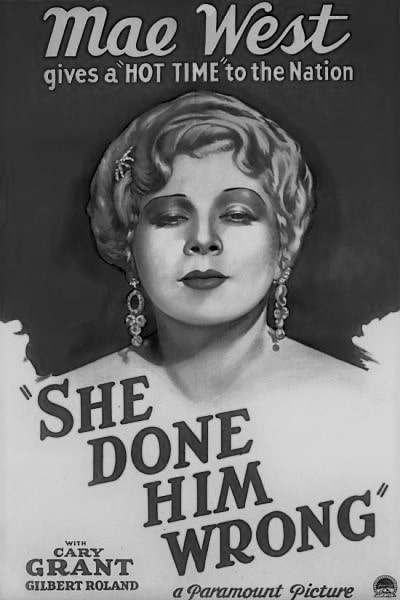 SHE DONE HIM WRONG (1933)
SHE DONE HIM WRONG (1933) (65 Min.) Genre: 1930 COMEDY, Transfer Quality: A
I'm the finest woman who walked the streets, declares bejeweled, hip-swishing Lady Lou (Mae West) at the beginning of She Done Him Wrong. Lou works as a singer at the Gay Nineties saloon of Gus Jordan (Noah Beery, Sr.), who plys her with diamonds to keep her by his side. She runs afoul of stalwart Salvation Army captain Cummings (Cary Grant), who warns her that she's on the road to perdition. Lou sizes up the "Tall, dark 'n' handsome" Cummings, undressing him with her eyes and inviting him to "Come up 'n'...see me sometime." Though Lou herself steers clear of criminal activities, Gus Jordan runs a counterfeiting and white slavery ring. Also, Lou's ex-lover Chick Clark (Owen Moore) has been sent to jail for stealing diamonds for her. Things come to a boil when Chick breaks prison and goes gunning for Lou; at the same time, Lou is accidentally involved in the killing of her rival, Russian Rosie (Rafaela Ottiano). She is rescued from Chick by Cummings, but not from the manslaughter charge; Cummings, it turns out, is actually The Hawk, a wily detective who has disguised himself as a man of peace to get the goods on Jordan. But the Hawk hasn't any intention of sending Lou to jail with Chick and Gordon; he wants to keep her for himself! "You're a ba-a-ad girl" he coos, wrapping his arms around her. "You'll learn!" replies Lou with a knowing glance. Mae West's first starring film, I'm No Angel literally saved Paramount Pictures from bankruptcy. It would remain the best of her feature films, most of which were severely watered down by the Production Code (whose renewed stringency of 1933 was brought about in great part by La West herself!). She Done Him Wrong was based on Mae's own stage play Diamond Lil, which ran on Broadway for 97 weeks. PS: This is the one where West sings "Frankie and Johnny," "I Like a Man Who Takes His Time," and "I Wonder Where My Easy Rider's Gone." — Hal Erickson
Starring: Mae West, Cary Grant, Owen Moore, Gilbert Roland | Directed by: Lowell Sherman
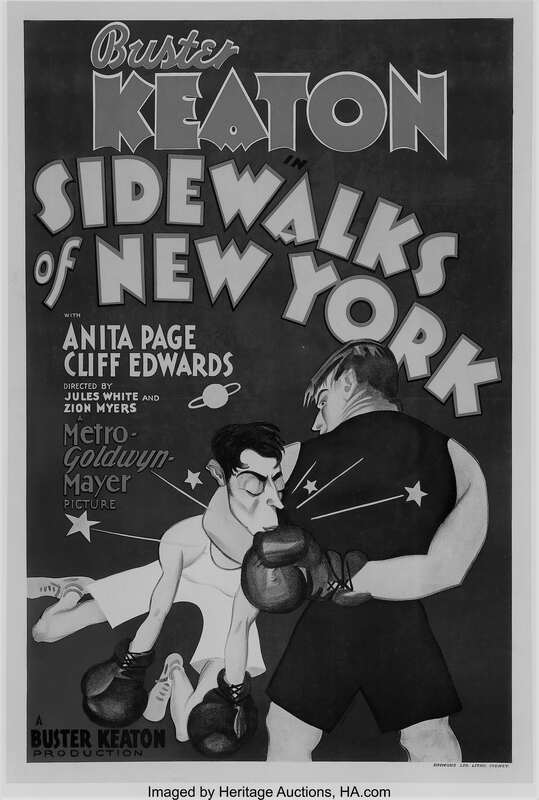 SIDEWALKS OF NEW YORK (1931)
SIDEWALKS OF NEW YORK (1931) (75 Min.) Genre: 1930 COMEDY, Transfer Quality: A
Buster Keaton once described his 1931 vehicle Sidewalks of New York as "God-awful"; it's hardly that bad, though admittedly it pales in comparison with his silent classics. Keaton plays Harmon, a wealthy young Park Avenue socialite who falls in love with Lower East Side denizen Margie (Anita Page). For her sake, he tries to reform a tough gang of kids (including Margie's brother) by building a gym to keep them off the streets. A bunch of gangsters, mistakenly believing that Harmon intends to turn them over to the authorities, try to bump him off, but he's oblivious to their homicidal overtures, believing them to be his best pals. Ultimately, Margie's brother and his gang are obliged to come to Harmon's rescue. The film's highlight is a boxing match, pitting puny Harmon against the toughest lug in all New York. Though Buster Keaton was unable to get along with his director Jules White, it was ironically White who helped Keaton stage a comeback in the late 1930s by casting the comedian in a series of mediocre but profitable Columbia two-reelers.
Starring: Buster Keaton, Anita Page, Cliff Edwards, Norman Phillips | Directed by: Zion Myers, Jules White
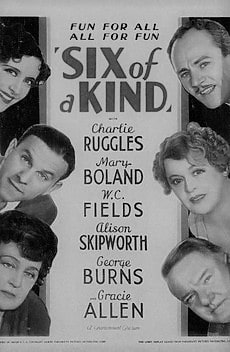 SIX OF A KIND (1934)
SIX OF A KIND (1934) (62 Min.) Genre: 1930 COMEDY, Transfer Quality: A
The "six" are Charlie Ruggles, Mary Boland, George Burns, Gracie Allen, W.C. Fields, and Alison Skipworth, who star in this cross-country comedy. Planning a motor vacation to California, J. Pinkham Whinney (Ruggles) and Flora Whinney (Boland) advertise for a couple to help drive and share expenses. That couple turns out to be George Edwards (Burns) and Gracie De Vore (Allen), accompanied by Allen's surly Great Dane. Whinney is driven to near-insanity by Edwards' intrusiveness and stupidity, but the worst is yet to come: thanks to a crooked co-worker, Whinney has been accused of stealing bank funds and is now an unwitting fugitive from justice. Sheriff Hoxley (W.C. Fields, who spends a priceless ten minutes explaining why he's called "Honest John") joins forces with hotel proprietor Mrs. "Duchess" K. Rumford (Alison Skipworth) in hopes of capturing Whinney and claiming the reward. After a zany night of everybody in the cast running in and out of hotel rooms, the real crook is captured and Whinney and Flora prepare to enjoy what's left of their vacation.
Starring: Charlie Ruggles, Mary Boland, George Burns, W.C. Fields, Gracie Allen | Directed by: Leo McCarey
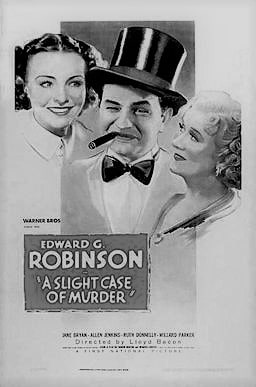 SLIGHT CASE OF MURDER, A (1938)
SLIGHT CASE OF MURDER, A (1938) (85 Min.) Genre: 1930 COMEDY, Transfer Quality: A
Slight Case of Murder is a breakneck-paced comedy starring Edward G. Robinson as a tough but good-hearted bootlegger. When Prohibition is repealed, Robinson faces a financial crisis: His beer tastes so awful that no one wants to drink it legally. As an additional headache, Robinson is under scrutiny from the Law, which is waiting to slip the cuffs on him for the slightest infraction. He arrives at his rented Saratoga mansion with his wife (Ruth Donnelly), daughter (Jane Bryan) and adopted son (Bobby Jordan), only to discover that a killer has left four corpses in his bedroom. Robinson and his stooges are forced to hide the bodies before his future son-in-law (Willard Parker), who happens to be a cop, tumbles to the dilemma. Based on a stage play by Howard Lindsay and Damon Runyon, A Slight Case of Murder a just as entertaining in the 1990s as it was fifty years ago (please ignore a tepid 1953 musical remake titled Stop, You're Killing Me). Surprisingly, this film was not a favorite of star Edward G. Robinson, who felt that director Lloyd Bacon rushed through the material without taking full advantage of its comic potential. — Hal Erickson
Starring: Edward G. Robinson, Jane Bryan, Allen Jenkins, Ruth Donnelly, Carole Landis | Directed by: Lloyd Bacon
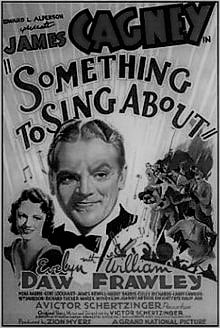 SOMETHING TO SING ABOUT (1936)
SOMETHING TO SING ABOUT (1936) (84 Min.) Genre: 1930 COMEDY, Transfer Quality: A
Battling Hoofer is the reissue title of the 1936 James Cagney vehicle Something to Sing About. Cagney plays Terry Rooney, a New York bandleader who heads to Hollywood when he is offered a movie contract. The down-to-Earth Rooney resists the "star treatment," an attitude misinterpreted by movie executive Bennett O. Regan (Gene Lockhart) as arrogance. When Terry's first film is a hit, Regan orders everyone involved to keep its success a secret from Terry, lest he develop a swelled head! (We don't believe it either.) The best sequence has Rooney chewing out his Asian houseboy, Ito (Philip Ahn), whereupon he drops his "So solly" pidgin English and begins talking like a Harvard professor! Terry gets to romance newcomer Evelyn Daw, as well as veteran vamp Mona Barrie; he also gets to participate in several lively dance numbers. Something to Sing About was the second of Jimmy Cagney's films for Poverty Row studio Grand National: the production values and snappy script work that he might have enjoyed at Warner Bros. are noticeably lacking, but Cagney is always fun to watch.
Starring: James Cagney, Evelyn Daw, William Frawley, Gene Lockhart | Directed by: Victor Schertzinger
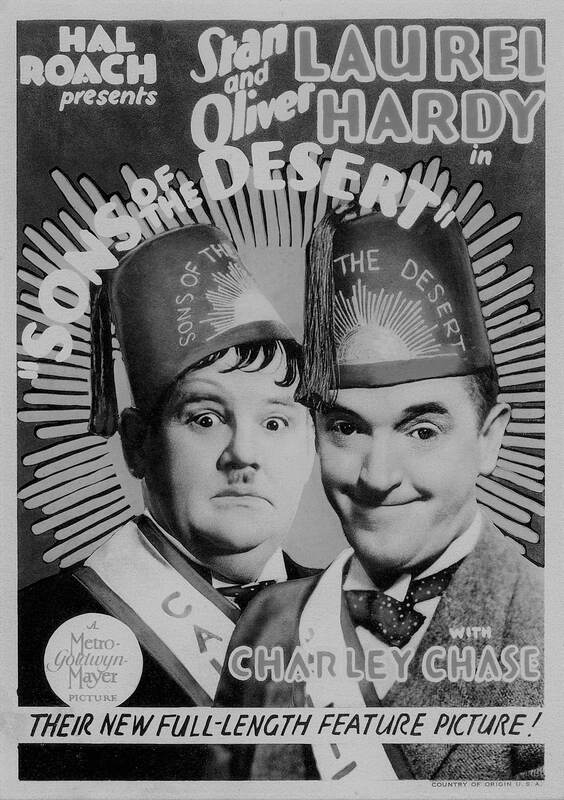 SONS OF THE DESERT (1933)
SONS OF THE DESERT (1933) (73 Min.) Genre: 1930 COMEDY, Transfer Quality: A
Stan Laurel and Oliver Hardy made many successful comedies in the 1930s, but none was as big a hit or as well-realized a feature as the lunatic Sons of the Desert. Hands-down the best Laurel and Hardy feature, it's a complicated tale of two henpecked husbands who scheme to ditch their wives and attend a fraternal organization's festive meeting in Chicago. The sight gags, slapstick, and repartee are all top-notch. Written by Frank Craven and Byron Morgan and directed by William A. Seiter, Sons of the Desert shows how entertaining the fat-and-thin comedy team, who often weren't given much to work with, could be when they had rich material. Sons of the Desert puts movies like Dumb and Dumber into perspective: nobody plays stupidity better than Laurel and Hardy. — Michael Betzold
Starring: Stan Laurel, Oliver Hardy, Charley Chase, Mae Busch, Lucien Littlefield | Directed by: William Seiter
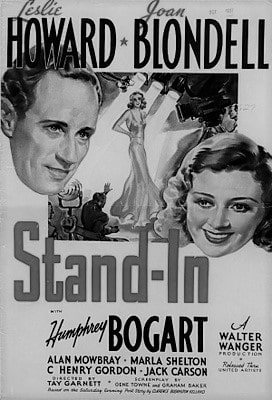 STAND-IN, THE (1937)
STAND-IN, THE (1937) (91 Min.) Genre: 1930 COMEDY, Transfer Quality: A
Bookish bank employee Leslie Howard is ordered to investigate the near-bankrupt Colossal Studios in Hollywood, to see if the firm is any sort of good risk. Howard's first brush with Tinseltown's cuckoo atmosphere occurs when he takes a room in a boarding house for extras, where all manner of eccentrics wander about as they wait for the phone to ring (Charles Middleton comports himself in an Abe Lincoln costume, on the off-chance that Hollywood will go back to making Civil War pictures soon). He befriends Joan Blondell, a former child star now working as a stand-in for haughty movie queen Marla Shelton, and perpetually soused producer Humphrey Bogart. Aware that the latest epic of autocratic director Alan Mobray will ruin the studio, Howard investigates further, discovering that a rival company has bribed Mobray to pad the budget and thus bring about the foreclosure of Colossal. While his business sense tells him that this is the next logical move, Howard has fallen in love with Blondell; thus, he gives Bogart 48 hours to re-edit Mobray's fiasco into something workable, and himself staves off the studio's shutdown by rallying all the Colossal employees to stand firm against being removed from the premises. Based on a Saturday Evening Post story by Clarence Buddington Kelland, this is a light-hearted satire of the movie industry, the sort of amiable farce in which everyone—even the most contentious of characters—is shown to be basically decent underneath. — Hal Erickson
Starring: Leslie Howard, Joan Blondell, Humphrey Bogart, Alan Mowbray | Directed by: Tay Garnett
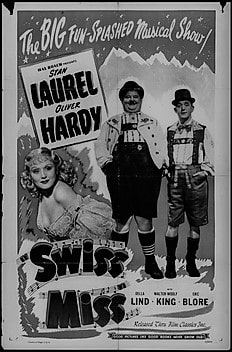 SWISS MISS (1938)
SWISS MISS (1938) (97 Min.) Genre: 1930 COMEDY, Transfer Quality: B
American mousetrap salesmen Stan Laurel and Oliver Hardy journey to Switzerland, reasoning that where there's cheese, there's mice. When they innocently try to pay their dinner bill with phony money, Stan and Ollie are put to work in the kitchen of the Alpen Hotel. Their enforced stay coincides with the visit of famed composer Walter Woolf King, who has come to Switzerland to soak up "local color." He also hopes to write an operetta that will succeed on its own merits, without the lovely voice of his lovely actress wife Della Lynd winning over the audience. But Lynd is determined to star in King's latest opus, and to that end she finagles Stan and Ollie into getting her a job as a hotel chambermaid. As the plot rolls along its merry way, Ollie labors under the misapprehension that Lynd is in love with him. Swiss Miss is, on the whole, one of Laurel and Hardy's weaker feature films, with far too much emphasis on the romantic leads and way too many forgettable songs ("Crick Crick Crick Here the Cricket" is a particular low point). But the team's individual scenes save the show, even though Stan Laurel, who'd been ill during production, looks like he's about to fall asleep at any moment. Best bits: Stan hoodwinking a St. Bernard out of a cask of brandy; Ollie serenading Lynd while Stan accompanies him on tube; and the legendary sequence, immortalized by film critic James Agee, wherein Stan and Ollie try to transport a piano across a rope bridge high above an alpine chasm—only to confront a gorilla! One of the screenwriters of Swiss Miss was Jean Negulesco, later the director of such memorable films as Mask of Dmitrios, Three Strangers, Titanic and How to Marry a Millionaire. Also on this DVD are two shorts: "The Chimp" and "Flying Elephants"
Starring: Stan Laurel, Oliver Hardy, Della Lind, Walter Woolf King | Directed by: John G. Blystone, Hal Roach
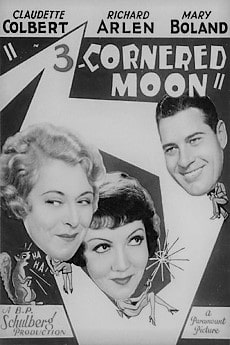 THREE CORNERED MOON (1933)
THREE CORNERED MOON (1933) (77 Min.) Genre: 1930 COMEDY, Transfer Quality: B
Three-Cornered Moon is regarded by many film buffs as the first of the genuine "screwball comedies." Claudette Colbert stars as the only level-headed member of a wacky Brooklyn family. Her mother (Mary Boland) loses the family fortune in the stock market, forcing Colbert's knuckleheaded brothers to look for work. Unfortunately the boys seem interested only in jobs for which they're uniquely unsuited. Even Colbert has her weak moments, especially when she falls for a callow writer (Hardie Albright), but she eventually finds happiness with sensible doctor Richard Arlen. Three-Cornered Moon was written by the gloriously named Gertrude Tonkonogy.
Starring: Claudette Colbert, Richard Arlen, Mary Boland, Wallace Ford | Directed by: Elliott Nugent
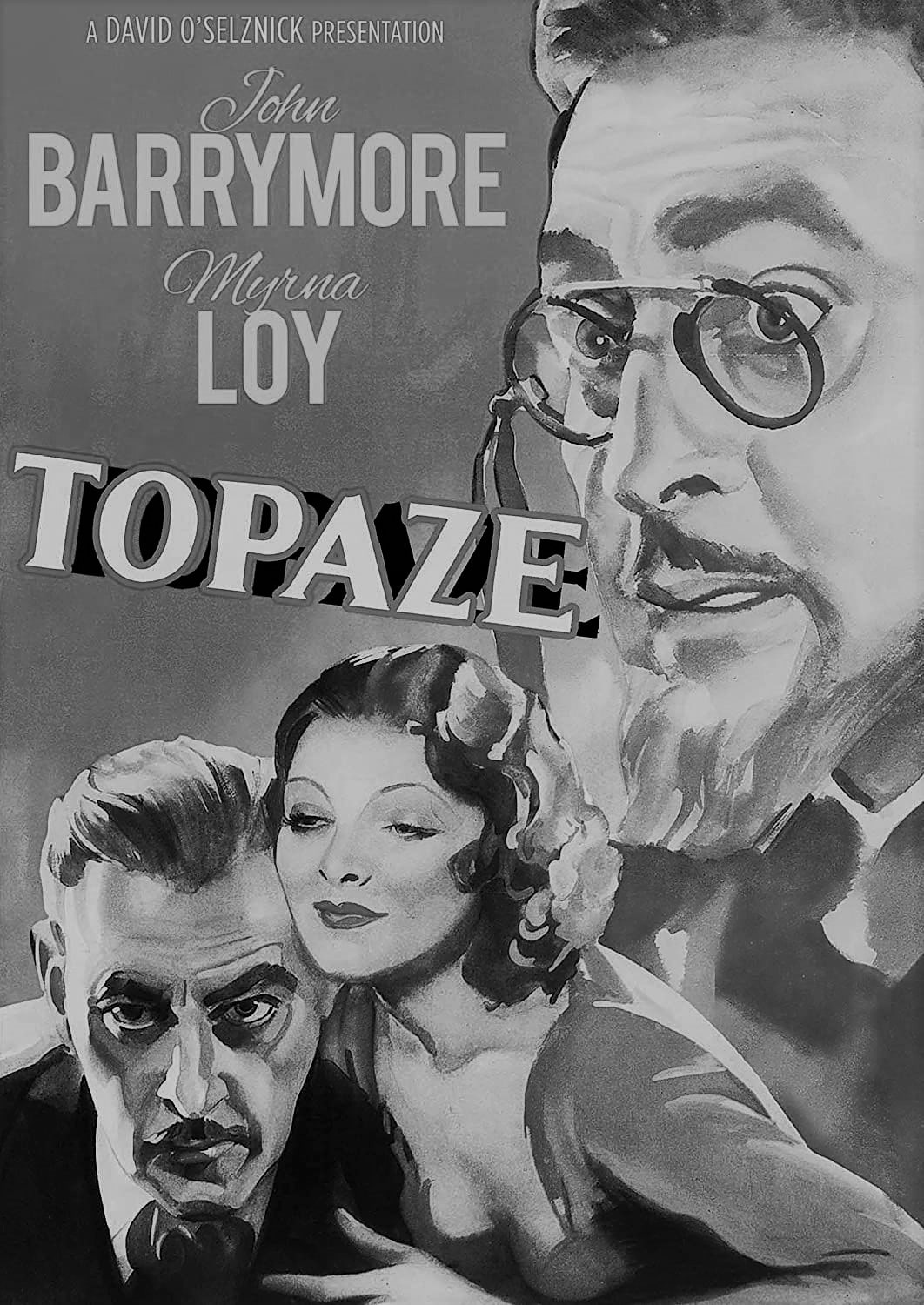 TOPAZE (1933)
TOPAZE (1933) (78 Min.) Genre: 1930 COMEDY, Transfer Quality: B
Producer David O. Selznick's adaptation of Marcel Pagnol's satirical play Topaze stars John Barrymore, delivering a peerless comedy performance a full year before Howard Hawks allegedly "discovered" Barrymore's comic potential in Twentieth Century. Barrymore plays a French science teacher who is dismissed because he refuses to compromise his integrity by passing the student of a wealthy man. To console himself, Barrymore tinkers in his laboratory, where he stumbles upon the formula for a health tonic. Hired by unscrupulous tycoon George Mason to market the drink, Barrymore finds himself becoming as dishonest as his fellow businessmen. On the road to redemption toward the end, Barrymore wins the love of Mason's mistress Myrna Loy, who likewise seeks to change her ways. Eschewing much of the cynicism of the Pagnol original, Topaze aims more for whimsical chuckles than knowing nods. The property would be remade with most of its sardonic humor restored by Fernandel in 1951 and Peter Sellers in 1963.
Starring: John Barrymore, Myrna Loy, Albert Conti, Luis Alberni, Reginald Mason, Jobyna Howland | Directed by: Harry D'Abbadie D'Arrast
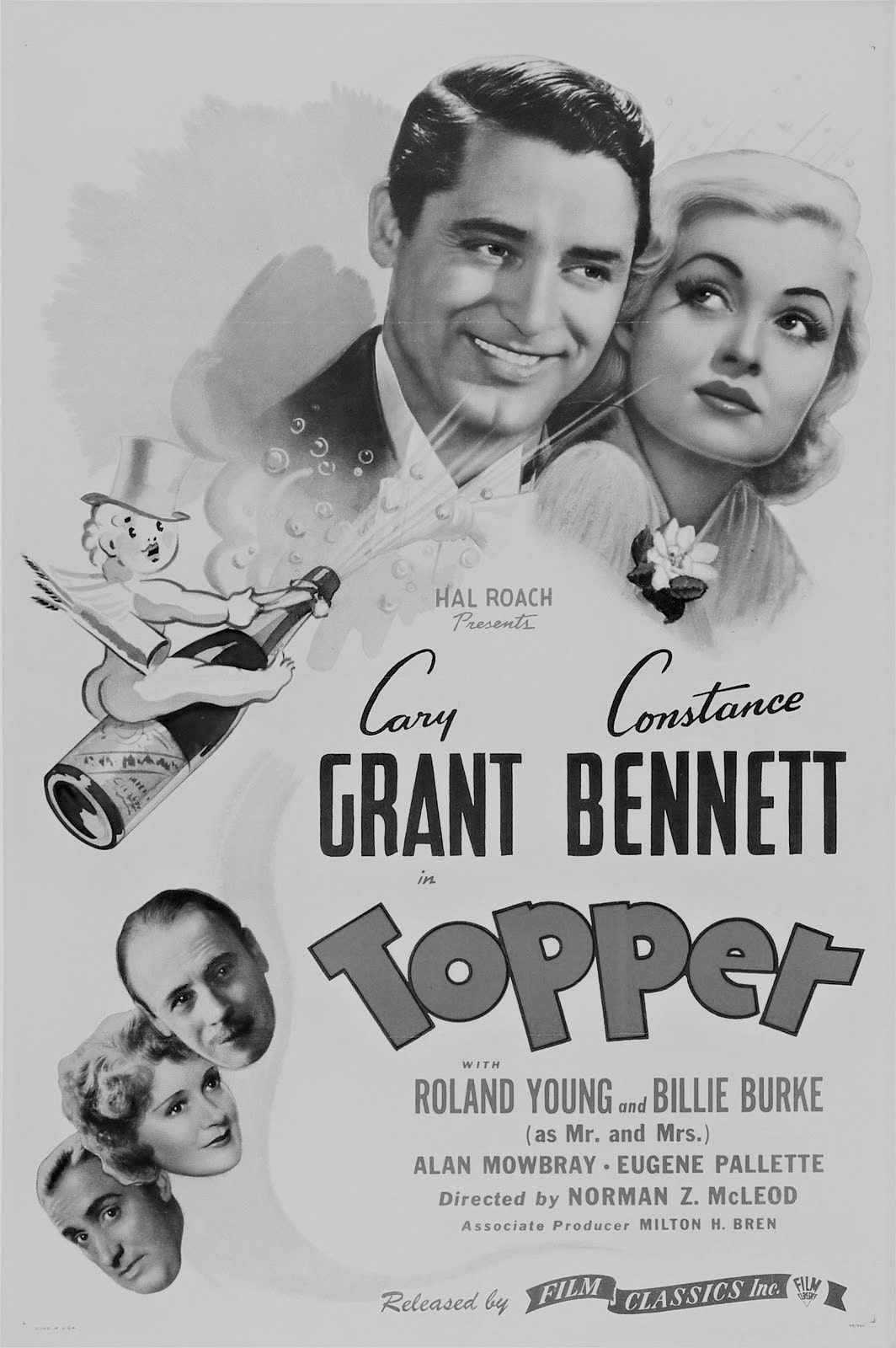 TOPPER (1937)
TOPPER (1937) (97 Min.) Genre: 1930 COMEDY, Transfer Quality: A
By 1937, producer Hal Roach was hoping to wean himself away from the Laurel & Hardy-Our Gang slapstick on which he had built his studio's reputation by delving into the "screwball comedy" genre. Roach selected the racy Thorne Smith fantasy novel Topper for adaptation, and the result was one of the most endearingly funny films of the decade. Constance Bennett and Cary Grant play Marion and George Kerby, a wealthy, freewheeling young married couple whose uninhibited lifestyle is the talk of the town. After a particularly bibulous evening on the town, the Kerbys race homeward in their gleaming new roadster. George fails to negotiate a curve, and the car plows into a tree, killing both its occupants. Seconds later, the ghosts of George and Marion emerge from the wreckage, behaving as frivolously as if nothing had happened. Upon realizing that they're dead, the Kerbys also realize that they haven't been immediately snatched up into Heaven. Determining that they're required to perform one good deed before being allowed past the Pearly Gates, George and Marion set about to "liberate" stuffy, sedate, henpecked banker Cosmo Topper (Roland Young). At first resistant to the charms of his invisible benefactors, Topper begins to loosen up and truly enjoy life for the first time. Naturally, this doesn't sit well with Topper's supercilious wife (Billie Burke) nor his long-suffering butler (Alan Mobray), especially during a climactic free-for-all at a vacation resort. Though special effects abound in Topper, most of the humor derives from the embarrassed reactions of Roland Young as he tries to fend off the flirtatious advances of the ghostly Marion and the benignly strongman tactics of the spectral George. Adding to the fun are Eugene Pallette as a flustered house detective and Arthur Lake as a pratfalling bellboy. The musical score by longtime Hal Roach composer Marvin Hatley is perfectly attuned to the zany goings-on (including snatches of background music from Roach's earlier Laurel and Hardy comedies), while Hoagy Carmichael appears briefly on screen to introduce the film's signature tune, "Old Man Moon." Topper proved successful enough to warrant two sequels, as well as a popular TV series of the early 1950s. — Hal Erickson
Starring: Cary Grant, Constance Bennett, Billie Burke, Roland Young | Directed by: Norman Z. McLeod
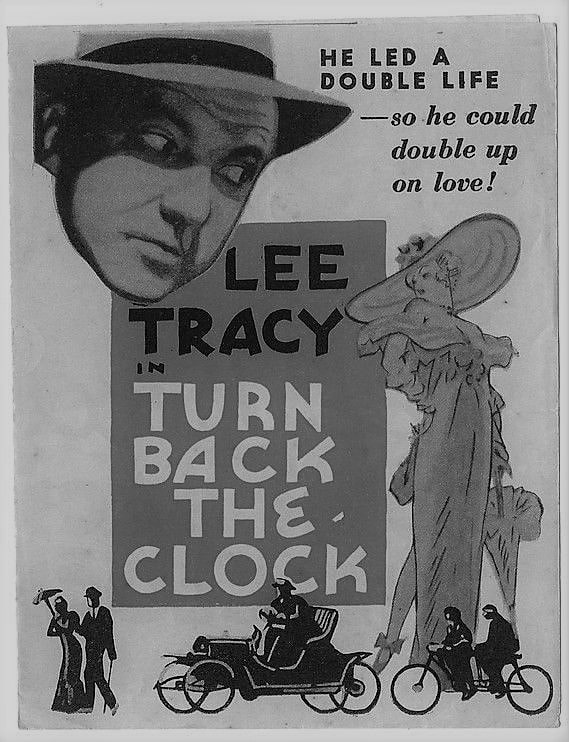 TURN BACK THE CLOCK (1933)
TURN BACK THE CLOCK (1933) (77 Min.) Genre: 1930 COMEDY, Transfer Quality: B
Lee Tracy is a middle-aged, middle-class man dissatisfied with his life. If he'd only married the girl he wanted to and had been a smarter businessman (he believes), things would have been better. One morning, Tracy wakes up and discovers he's been transported twenty years in the past. Armed with foreknowledge of future events, Tracy determines to correct his mistakes and become what he considers a success. "Be careful what you wish for," goes the old saying. "You just might get it." Tracy comes to regret his "new" life and yearns for things to go back to normal—but will they? A truly imaginative fantasy, Turn Back the Clock is acted with conviction by everybody from star Lee Tracy to a trio of bit players (in the wedding sequence) who later called themselves The Three Stooges.
Starring: Lee Tracy, Mae Clarke, Otto Kruger, George Barbier | Directed by: Edgar Selwyn
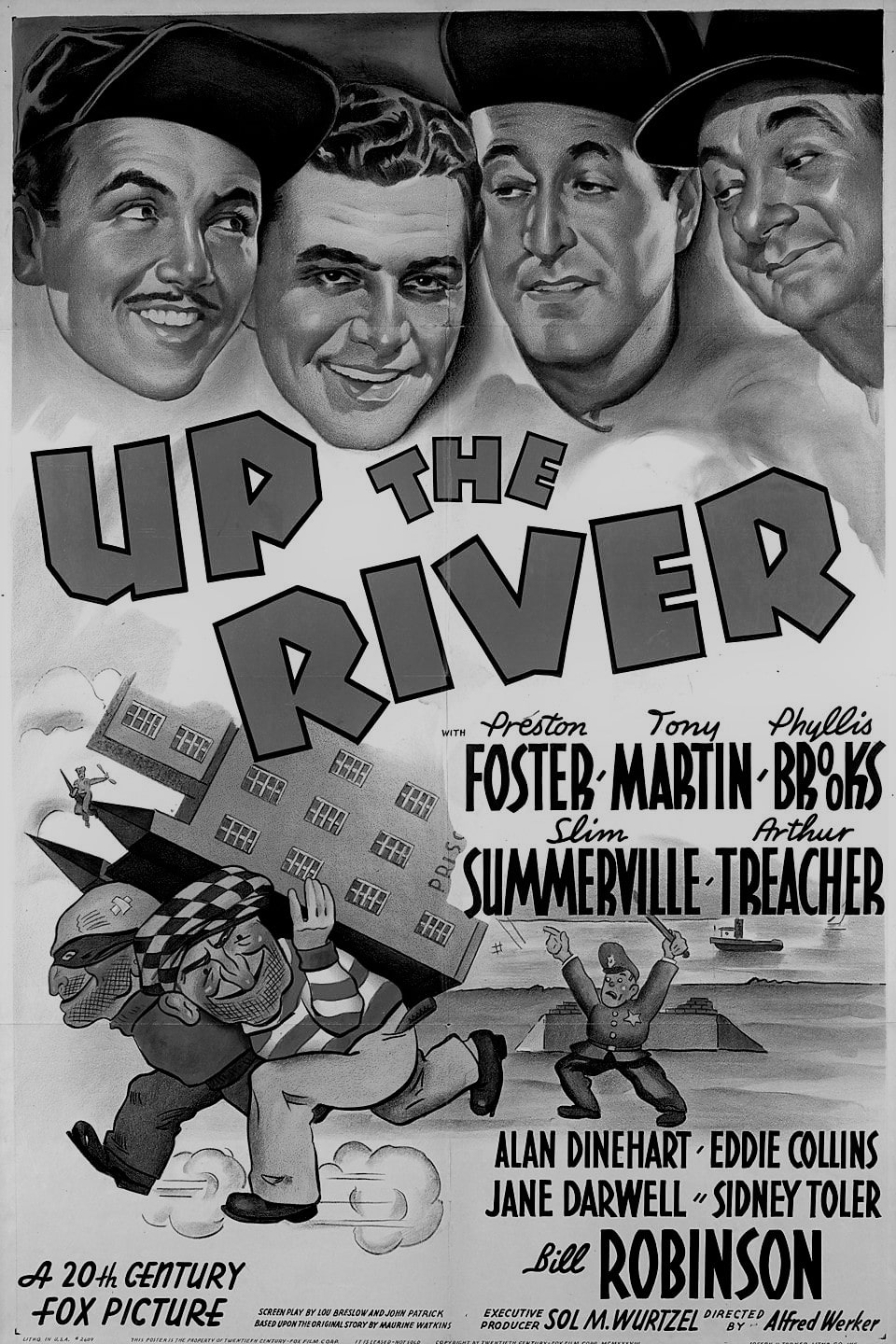 UP THE RIVER (1930)
UP THE RIVER (1930) (90 Min.) Genre: 1930 COMEDY, Transfer Quality: C
The one-time-only combination of director John Ford and actors Spencer Tracy (in his first film) and Humphrey Bogart (in his second) should be recommendation enough for the offbeat comedy-drama Up the River. Tracy and Warren Hymer play Saint Louis and Dannemora Dan, two hard-boiled but likeable prison convicts. While in stir, the boys befriend another convict named Steve (Bogart), who is in love with woman's-prison inmate Judy (Claire Luce). Eventually, Steve and Judy are released, whereupon they get married and head to a small town where no one knows of their criminal pasts. It isn't long, however, before the couple's future happiness is threatened by dishonest salesman Frosby (Gaylord Pendleton), the no-good rat who framed Judy. Frosby threatens to expose Steve's prison record if the latter refuses to go along with a scheme to defraud his neighbors. Learning of this situation, Saint Louis and Dan escape from jail, foil Frosby's scheme, and return behind bars just in time to play in a prison all-star baseball game! Nonsensical to say the least, Up the River is also a film that's hard to dislike. It was remade by 20th Century-Fox in 1938, with Preston S. Foster and Tony Martin respectively in the Tracy and Bogart roles. — Hal Erickson
Starring: Spencer Tracy, Claire Luce, Warren Hymer, Humphrey Bogart | Directed by: John Ford
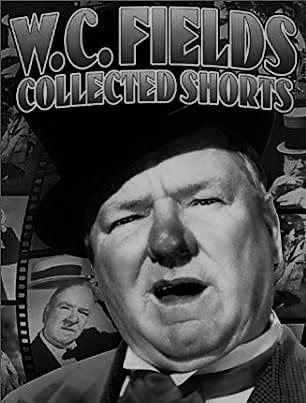 W.C. FIELDS SHORTS:THE FATAL GLASS OF BEER, THE BARBER SHOP, THE DENTIST (0)
W.C. FIELDS SHORTS:THE FATAL GLASS OF BEER, THE BARBER SHOP, THE DENTIST (0) (0 Min.) Genre: 1930 COMEDY, Transfer Quality: B
The short comedy The Fatal Glass of Beer stars the legendary W.C. Fields as Mr. Snavely, a prospector who is awaiting the return of his prodigal son, Chester, who has been in prison for the last few years. The last time Snavely saw his son was when the boy consumed "The Fatal Glass of Beer," and set out to the Big City in order to pursue a hedonistic life. The film is meant as a spoof of Northern melodramas that Fields enthusiasts have come to regard as an almost surreal masterpiece.*** W.C. Fields stars as the subject of this classic comedy short, which he also wrote the screenplay for. The dentist is a misanthropic, absent-minded sort who keeps an office in the same house that he shares with his rebellious young daughter. One morning she announces that she has fallen in love with Arthur, the iceman. Fields won't have it, and scares the poor Romeo off when he tries to make his daily "delivery." The hubbub makes him late for his golf game. When he tees off, the ball knocks an elderly man out cold but he plays through regardless, trying to cheat wherever possible. Frustrated by a particularly difficult hole, Fields loses his temper and tosses all of his clubs (and the caddy) into a water trap. Back at the office, the dentist locks his daughter in her room to prevent her from eloping with the iceman, and takes out all his frustrations on his patients (whom he refers to as "buzzards" and "palookas"). An attractive young girl naively bends over to show where a little dog bit her, a sophisticated society dame is driven into bizarre contortions while Fields sadistically drills, and a strange "little fella" ends up with a mouth full of broken teeth and birds in his beard. Through it all, the dentist treats everyone with disdain, but his well-deserved comeuppance is on the way. *** In his last two-reeler for Mack Sennett, W. C. Fields plays small-town barber Cornelius O'Hare. The film's wisp of a storyline concerns an escaped criminal (Cyril Ring), who demands that O'Hare give him a haircut and who is eventually captured by a small boy -- even though our "hero" tries to grab the credit. As if we care a hoot about the plot! Best bits: Fields "babysitting" a troublesome infant; a haphazard shaving session, with the customer barely escaping with his ears and lower lip intact; and all that byplay with a bass fiddle named Lena. The magnificent Elise Cavanna, who played the hyperathletic patient in Fields' The Dentist (1932), appears as the great man's long-suffering wife.
Starring: W.C. Fields | Directed by: Clyde Bruckman, Leslie Pearce, Arthur Ripley
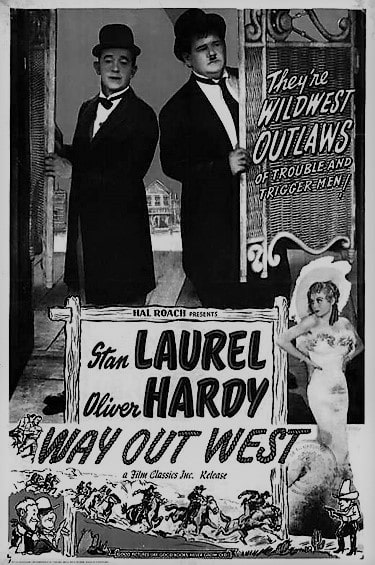 WAY OUT WEST (1937)
WAY OUT WEST (1937) (65 Min.) Genre: 1930 COMEDY, Transfer Quality: A
Prospectors Stan Laurel and Oliver Hardy head to the western town of Brushwood Gulch, two men on a top-secret mission. The boys have been entrusted by their recently deceased partner Cy Roberts with a deed to a valuable gold mine, to be delivered in person to Roberts' daughter Mary (Rosina Lawrence). Stan inadvertently spills the beans to crooked saloon owner Mickey Finn (James Finlayson), who proceeds to pass off his own wife, saloon chanteuse Lola Marcel (Sharon Lynne), as Mary Roberts. The ever-trusting Stan and Ollie fall for the subterfuge hook, line and sinker, handing the deed over to Lola. Upon running into the real Mary, who slaves away in Mickey Finn's kitchen, Our Heroes vow to retrieve the deed. A battle royale ensues, with Stan, Ollie, Mickey and Lola passing the deed around like a football. Ultimately, Lola manages to wrest the deed away from Stan by tickling him into helpless submission. Chased out of town by the sheriff (Stanley Fields), who harbors a grudge against the boys from a previous misunderstanding, Stan and Ollie sneak back to Brushwood Gulch in the dead of night, hoping to break into Finn's saloon, steal back the deed, and place it firmly in the hands of Mary Roberts. Upon this foundation is built Way Out West, arguably Laurel & Hardy's best feature film (many aficionados prefer Sons of the Desert). Highlights include the aformentioned tickling and burglary scenes, Stan literally eating his hat after losing a bet, Ollie's perennial plunges into a pothole, and the boys' charming singing-and-dancing interludes. Also take note of Marvin Hatley's Oscar-nominated musical score, and the presence of a young, thin Chill Wills as one of "The Avalon Boys". Even if you're not a fan of The Thin One and The Fat One, you'll be limp with laughter at the end of Way Out West. — Hal Erickson
Starring: Stan Laurel, Oliver Hardy, Sharon Lynne, James Finlayson, Ann Dvorak | Directed by: James W. Horne
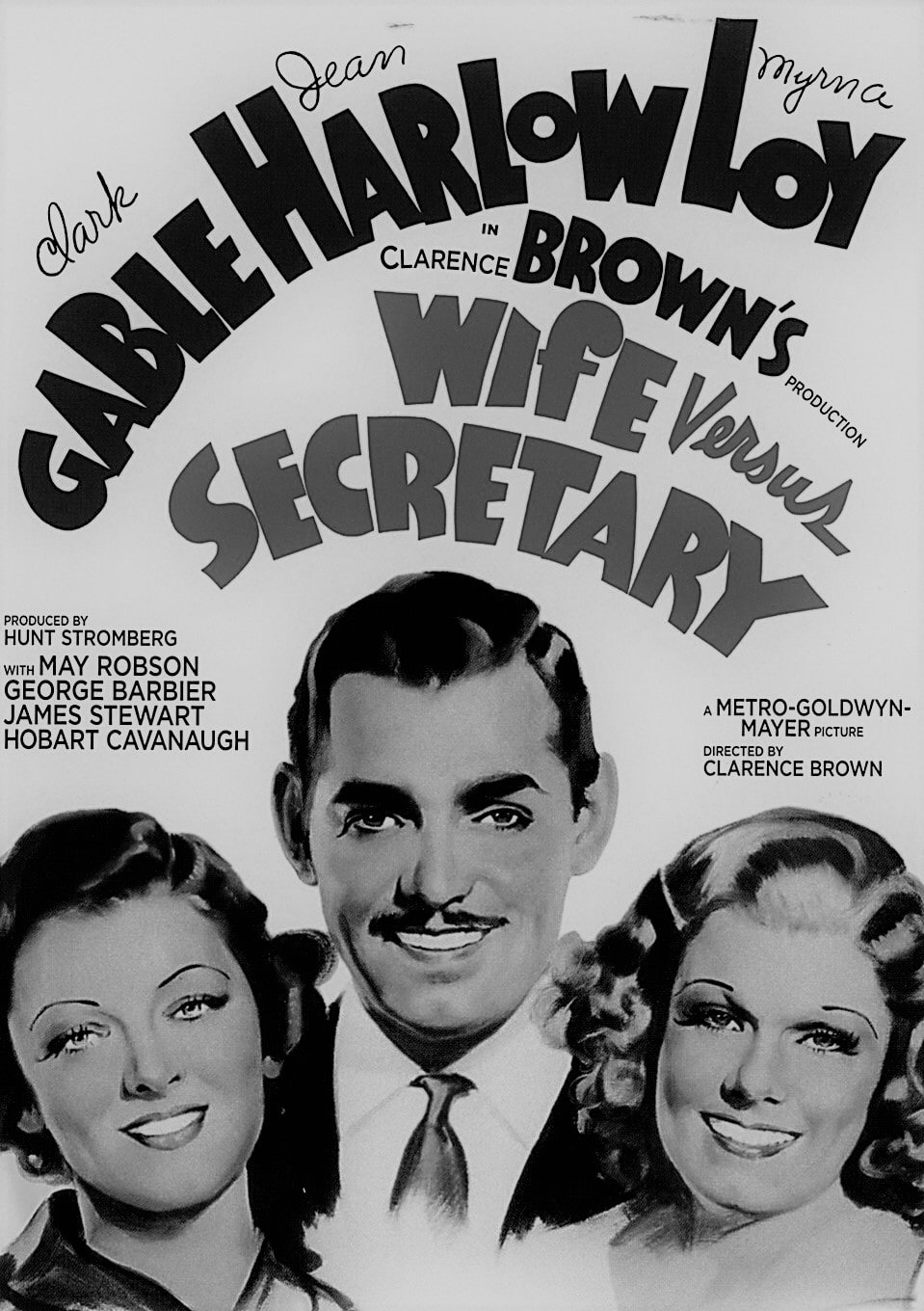 WIFE VS. SECRETARY (1936)
WIFE VS. SECRETARY (1936) (88 Min.) Genre: 1930 COMEDY, Transfer Quality: A
Magazine publisher Clark Gable is happily married to Myrna Loy. Clark's devoted, super-efficient secretary Jean Harlow may have once harbored a secret desire for her boss, but she's perfectly content with boyfriend James Stewart. Accompanying Gable on a crucial business trip, Jean answers the phone in her boss' suite. Myrna, on the other end of the line, misunderstands, thereby setting the stage for a series of subsequent misunderstandings. As one can see, nothing much really happens in Wife vs. Secretary. The film is a vehicle in every sense of the word, totally reliant on the appeal of its stars. But it works beautifully, and remains as entertaining now as it did sixty years ago. One film historian has wondered what Wife vs. Secretary would have looked like had it been made before the imposition of the production code: would Jean have really had an affair with Clark, thereby giving Myrna something to really worry about? No matter; while it may have been racier, it's not likely the film could have been any more entertaining than it already is. — Hal Erickson
Starring: Clark Gable, Jean Harlow, Myrna Loy, May Robson | Directed by: Clarence Brown
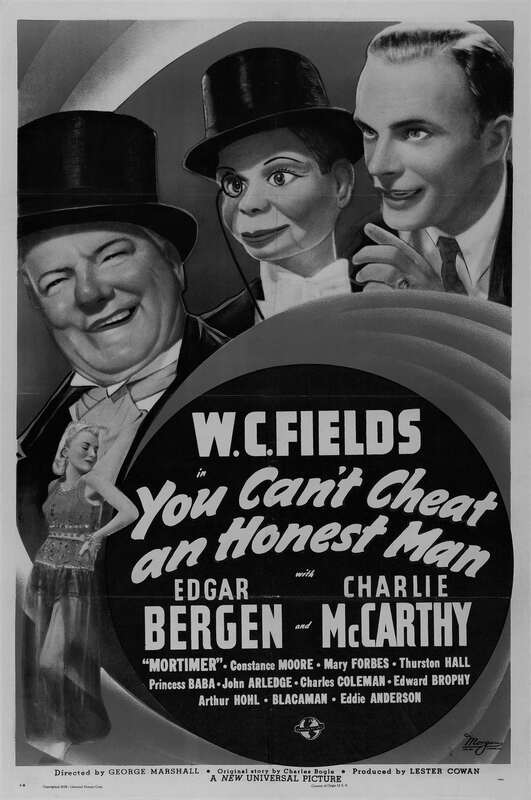 YOU CAN'T CHEAT AN HONEST MAN (1939)
YOU CAN'T CHEAT AN HONEST MAN (1939) (79 Min.) Genre: 1930 COMEDY, Transfer Quality: A
In his starring film for Universal Pictures, W.C. Fields plays circus manager and all-around flim flam man Larson E. Whipsnade. When he's not trying to fleece the customers or elude the sheriff, Whipsnade busys himself trying to break up the romance between his daughter Vicky (Constance Moore) and carnival ventriloquist Edgar Bergen (playing himself). He also carries on a running feud with Bergen's nattily attired dummy Charlie McCarthy ("I'll slash you into venetian blinds!"). Bergen's other dummy is Mortimer Snerd, who occasionally comments upon the action in his own thickheaded fashion. Anxious to arrange a marriage between Vicki and the wealthy Roger Bel-Goodie III (James Bush), Whipsnade disposes of Bergen and his dummies by sending them aloft in a hot-air baloon. Attending a party at the Bel-Goodie mansion, Whipsnade makes a pest of himself by constantly referring to snakes, a subject that invariably causes Mrs. Bel-Goodie (Mary Forbes) to swoon. He also engages in a zany ping-pong tournament with socialite Ronnie (Ivan Lebedeff). But it is Vicki, and not Whipsnade, who breaks up the engagement by telling off her pompous fiance. At that very instant, Bergen, having escaped from the balloon, arrives to claim Vicki and to help Whipsnade escape the sheriff once more. A partial remake of the W.C. Fields silent Two Flaming Youths, You Can't Cheat an Honest Man was scripted by Fields under the pseudonym "Charles Bogle." As published in the 1973 compendium W.C. Fields by Himself, the original screenplay was to have had dramatic overtones, including the death of Fields' trapeze-artist wife and a climactic soul-baring scene wherein Fields expresses his genuine love for his daughter. All this was jettisoned when it was decided to capitalize on the Fields-Charlie McCarthy "feud" then blazing on radio's Chase and Sanborn Show. While nowhere near as funny as Fields' subsequent Universal feature The Bank Dick, You Can't Cheat an Honest Man still contains a generous supply of laughs. Our favorite line: "Somebody's taken the cork out of my lunch." — Hal Erickson
Starring: W.C. Fields, Edgar Bergen, Constance Moore, James Bush | Directed by: George Marshall
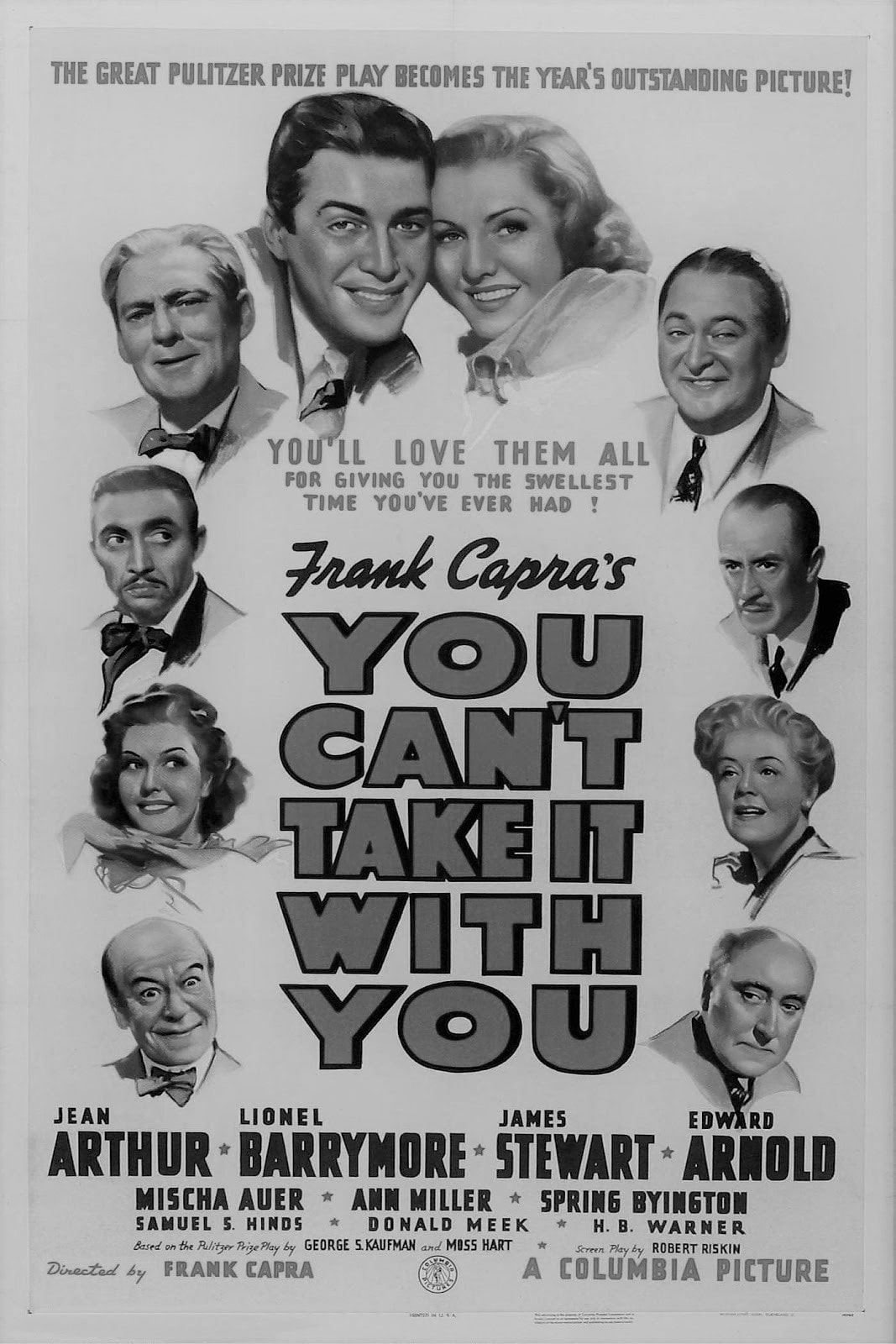 YOU CAN'T TAKE IT WITH YOU (1938)
YOU CAN'T TAKE IT WITH YOU (1938) (126 Min.) Genre: 1930 COMEDY, Transfer Quality: A
Moss Hart's and George S. Kaufman's whimsical Pulitzer Prize-winning Broadway play You Can't Take It With You was transformed into a paean to populism by director Frank Capra and screenwriter Robert Riskin. This is the story of the zany Sycamore household, presided over by Grandpa Vanderhof (Lionel Barrymore), a former businessman who has turned his back on commerce to enjoy life. At the Sycamores, everyone does just what he or she pleases. Penny Sycamore (Spring Byington), Grandpa's daughter, has become a novelist because someone delivered a typewriter to her home by mistake. Penny's husband makes firecrackers in his basement with the help of Mr. DePinna, an iceman who showed up at the Sycamore doorstep one day and never left. Their daughter Essie (Ann Miller) imagines that she's a prima ballerina, even though her dour teacher Boris assesses her work with, "Confidentially, it steenks!" Essie's husband Ed, who'd rather play a xylophone than work, spends his free time selling Essie's candy, wrapping each package in paper from a used printing press that dispenses anarchistic slogans. The one normal member of the household is Alice Sycamore (Jean Arthur), in love with wealthy Tony Kirby (James Stewart). Naturally, when the stuffy, aristocratic Kirbys come to the Sycamores for dinner, the event is a disaster, capped with the arrest of everyone in the household. Hart and Kaufman's third act found the previously judgmental Kirby softening his attitude towards the freewheeling Sycamore clan, admitting that he's never had so much fun in his life. Screenwriter Riskin altered the focus of the play by throwing out the third act and concentrating upon Tony Kirby's father, Kirby, Sr., who as played by Edward Arnold is transformed from a stock stuffed shirt into a ruthless, grasping tycoon, eager to buy up every house on the Sycamores' block to make room for a munitions plant.
Starring: Jean Arthur, Lionel Barrymore, James Stewart, Edward Arnold | Directed by: Frank Capra
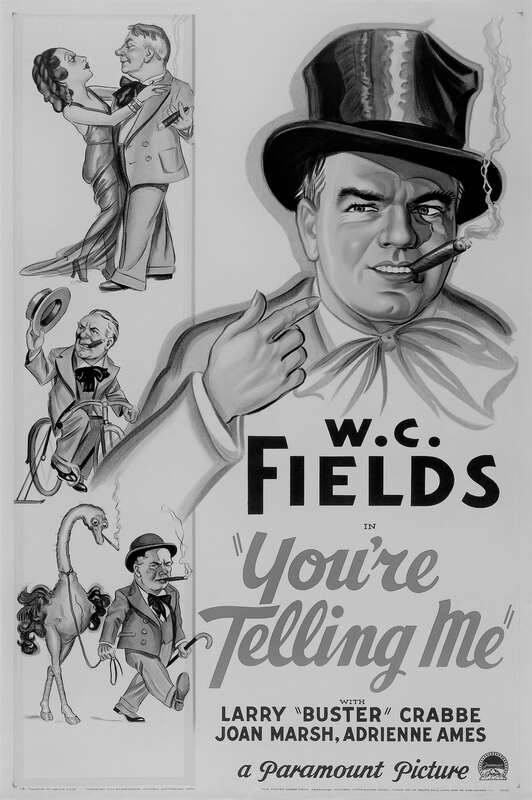 YOU'RE TELLING ME (1934)
YOU'RE TELLING ME (1934) (67 Min.) Genre: 1930 COMEDY, Transfer Quality: B
W.C. Fields stars in a remake of his silent comedy So's Your Old Man. Fields plays Sam Bisbee, an erstwhile inventor who is the laughingstock of his small town. Returning in defeat from a disastrous big-city demonstration of his latest invention, Sam makes the acquaintance of a beautiful young woman (Adrienne Ames) who happens to be an incognito foreign princess. After Bisbee tells her of how he'd like to be a success for the sake of his family, the princess decides to use her celebrity to Sam's benefit. She arrives in his town and lets it be known of her high regard for the downtrodden Bisbee. Suddenly Sam is the town's big shot, enabling him to merchandise his inventions and do right by his wife and daughter. Sam earns the respect he's so long deserved—but he's never completely convinced that the princess is who she claims to be, and keeps congratulating her on her "racket." Based on a story by Julian Street, You're Telling Me is climaxed by a sidesplitting recreation of W.C. Fields' Ziegfeld Follies golf routine. — Hal Erickson
Starring: W.C. Fields, Joan Marsh, Larry "Buster" Crabbe, Adrienne Ames | Directed by: Erle C. Kenton
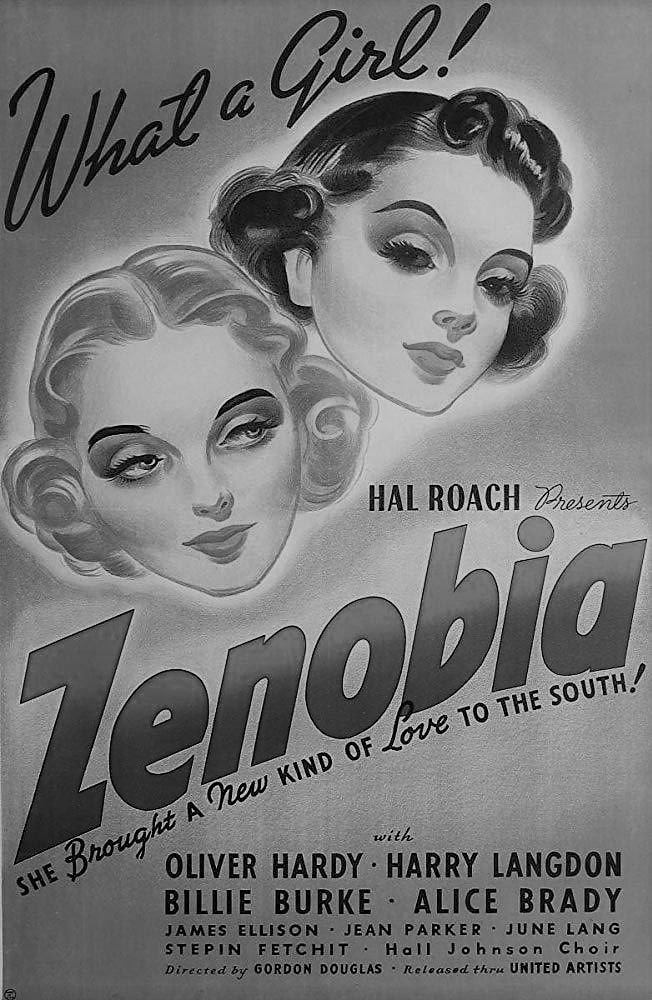 ZENOBIA (1939)
ZENOBIA (1939) (71 Min.) Genre: 1930 COMEDY, Transfer Quality: A
With comedian Stan Laurel temporarily off his payroll due to a contract dispute, Hal Roach hastily put together a solo starring vehicle for Laurel's longtime partner Oliver Hardy. Digging into his files, Roach pulled out Zenobia's Infidelity, an H.C. Bunner story originally purchased as a vehicle for Roland Young. Hardy was cast in the semi-serious role of John Tibbitt, a 19th century Mississippi doctor whose heart is bigger than his bank account. At the insistence of travelling carnival man Professor McCrackle (played by former silent comedy star Harry Langdon, then under contract to Roach as a gag writer), Tibbitt tends to the Professor's ailing elephant, Miss Zenobia. Once cured, the precious pachyderm refuses to leave Dr. Tibbitt's side-whereupon McCrackle sues the doctor for alienation of Zenobia's affections! The ensuing scandal plays right into the hands of Mrs. Carter (Alice Brady), the town's richest and snobbiest woman, who has long opposed the romance between her son John (James Ellison) and Tibbitt's daughter Mary (Jean Parker). All problems are resolved during the climactic courtroom trial, despite occasional interruptions by Miss Zenobia and the dizzy interpolations of Tibbitt's wife (Billie Burke). The film's intended highlight, the recitation of the Declaration of Independence by black child Philip Hurlic, was obviously inspired by Charles Laughton's "Gettysburg Address" scene in Ruggles of Red Gap (1935). Evidently sensing that Zenobia was doomed from the start, producer Hal Roach stirred up some publicity by encouraging the notion that he was creating a new comedy team consisting of Oliver Hardy and Harry Langdon-even though the characters never function as a team in the course of the story. A major box office disappointment, Zenobia (British title: Elephants Never Forget) is a pleasant but utterly inconsequential effort; still, it's worth seeing once, if only for the quietly subdued performance by Oliver Hardy, who is very good indeed.
Starring: Oliver Hardy, Harry Langdon, Billie Burke, Alice Brady, Jean Parker | Directed by: Gordon M. Douglas

